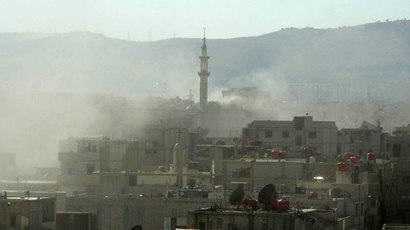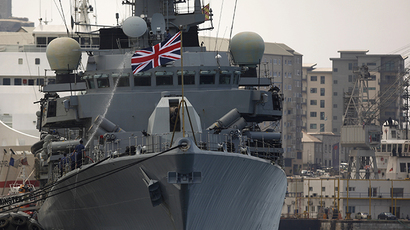Syria 'chemical weapons' crisis: LIVE UPDATES
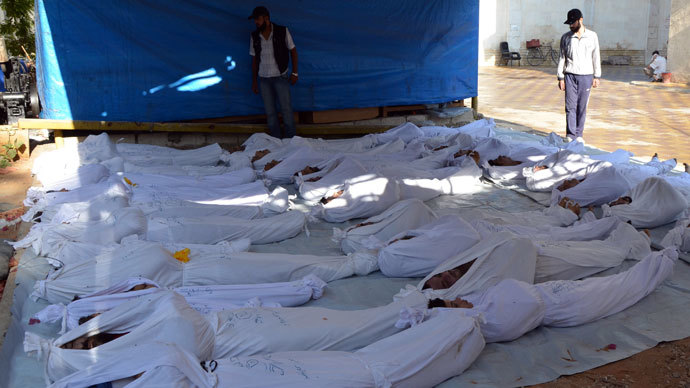
The diplomatic scramble to avert military intervention in Syria continues, as an August 21 gas attack in a Damascus suburb has sparked international efforts to bring the country’s chemical weapons stockpile under control.
Friday, October 11
08:00 GMT: This year's Nobel Peace Prize is set to go to the OPCW, the
organization currently tasked with overseeing Syria's chemical
weapons arsenal handover to international hands - according to a
Norwegian public broadcaster.
03:25 GMT: Nearly two dozen of the commentators who
appeared on major media outlets to discuss a possible US military
strike on Syria had relationships with contractors and other
organizations with a vested interest in the conflict, according to
a new report.
Wednesday, October 9
18:00 GMT: The Syrian government has been “quite cooperative” in the early stages of the destruction of its poison gas stockpiles, global chemical weapons watchdog OPCW said, adding that its experts would need to check some 20 weapons sites in the country.
“The cooperation has been quite constructive and I would say
the Syrian authorities have been cooperative," Ahmet Uzumcu,
director-general of the Organization for the Prohibition of
Chemical Weapons, told reporters in The Hague.
Tuesday, October 8
21:00 GMT: A second team of inspectors will be sent to
Syria to help those already working there to destroy the state’s
stockpile of toxic munitions, the global chemical weapons
watchdog said. This comes as Damascus releases footage of the
first mission at work.
03:00 GMT: A joint mission of the UN and the OPCW should include some 100 experts deployed both in Damascus and in Cyprus – to provide additional “operational capabilities” – in order to destroy Syria’s chemical arsenal, Secretary-General Ban Ki-moon proposed. "I propose the establishment of an OPCW - UN Joint Mission to eliminate the chemical weapons program of the Syrian Arab Republic," Ban Ki-moon wrote in a letter to the UN Security Council.
The mission "will seek to conduct an operation the likes of
which, quite simply, have never been tried before," Ban said,
in a report to the United Nations Security Council, according to
AFP.
Monday, October 7
13:00 GMT: US Secretary of State, John Kerry, has said that Syria's compliance with the chemical weapons handover deal is a "credit to Assad's regime."
Kerry and Russian Foreign Minster Sergey Lavrov met on the sidelines of the APEC summit in Bali, Indonesia on Monday morning.
"The process has begun in record time and we are appreciative
for the Russian co-operation and obviously for the Syrian
compliance," Kerry added.
12:45 GMT: People in countries whose governments are not directly involved in the Syrian crisis mostly oppose military intervention against the government of President Bashar Assad, a Reuters/Ipsos poll showed. Overall, 52 percent of people surveyed in September favored military intervention and 57 percent were against their own country taking part in such an operation.
The survey was conducted in 15, mostly European countries, but excluded Iran, Russia and China, which are supporting Damascus in the ongoing crisis, as well as Saudi Arabia, Turkey and Qatar, which are most directly involved in the rebels’ fight against the Syrian government.
In the survey, Argentina was the country most strongly opposed to military intervention in Syria, with 68 percent of people against it.
Some 36 percent of people surveyed said that Assad’s government
was responsible for the use of chemical weapons, the accusation
which the US voiced as a reason for a possible strike in Syria.
About a quarter believe that both the Syrian army and the
opposition used chemical weapons at some point of time, while
another quarter said they didn’t know who was behind the
attacks.
12:37 GMT: The Organization for the Prohibition of
Chemical Weapons has posted a statement on its website, saying
that Syria is being “cooperative” in the operation to
destroy its chemical weapons arsenal.
"Discussions were held with the Syrian authorities on the
disclosure which Syria earlier provided to the OPCW on its
chemical weapons program," the statement said, adding that
the talks were “constructive.”
Saturday, October 5
6:00 GMT: The Syrian government has gone beyond its pledge
and handed over additional information on its chemical weapons
program to international experts. UN spokesman Martin Nesirky
said the new data had been received by the Organization for the
Prohibition of Chemical Weapons (OPCW) and the OPCW countries
should expect an update by Tuesday.
Thursday, October 3
18:00 GMT: The initial United Nations report on how Syria will dispose of its chemical weapons will be presented on October 7, says Russian UN envoy Vitaly Churkin.
"The chemical weapons experts are already in place in Syria, and have started work" Churkin told Rossiya-24, a Russian news channel.
"The UN Secretary General's report on October 7 will indicate
what role the United Nations will play in the carrying out of the
chemical weapons resolution passed by the Security Council."
16:26 GMT: An international team of chemical weapons
experts who arrived in Damascus on Tuesday has been making
"encouraging initial progress" according to the UN. It is
working towards the full elimination of Syria's chemical weapons
stockpiles - a task they believe to be achievable by
mid-2014.
"Documents handed over yesterday by the Syrian Government look
promising, according to team members, but further analysis,
particularly of technical diagrams, will be necessary and some
more questions remain to be answered," said the UN statement.
Tuesday, October 1
14:50 GMT: The Israeli ambassador to Moscow, Dorit
Golender, has said that her country backs the plan to place
Syrian chemical weapons under international control.“Israel has welcomed the US-Russia plan. But results are
determined by deeds,” Golender told RIA Novosti.
12:26 GMT: The team of twenty international OPCW inspectors
who are tasked with the elimination of chemical weapons in Syria
have entered the country from Lebanon over the Masnaa border.
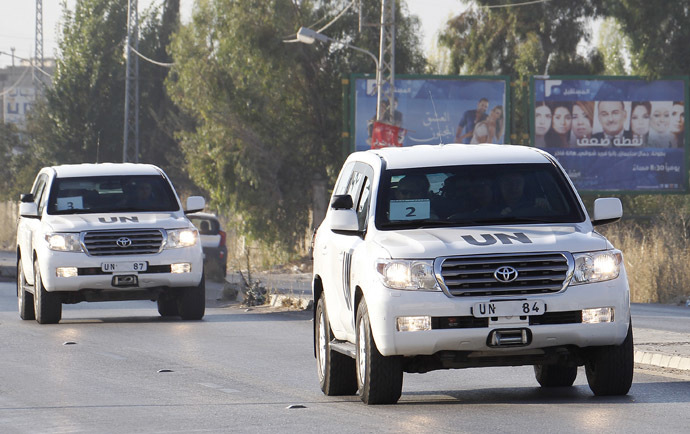
11:30 GMT: Russian Foreign Minister Sergey Lavrov has
expressed doubts that the West will be successful in getting
the Syrian opposition to take part in the ‘Geneva-2’ peace
conference due to be held mid-November.
“Regarding opposition representation – this remains to be
settled. Until recently we have been relying on our Western
partners who pledged to push the opposition to the negotiations
table and we hoped they would manage it quickly. But so far they
have not succeeded. And I am not sure they will by
mid-November” Lavrov told reporters at a press conference.
11:00 GMT: Russian representatives will work alongside the
OPCW inspectors in Syria and take active part in the operation to
dismantle chemical weapons in the country, Russian Deputy Foreign
Minister Mikhail Bogdanov told reporters.
Monday, September 30
20:43 GMT: Work on the destruction of chemical weapons in
Syria will begin October 1, UN spokesman Martin Nesirky
confirmed. “The beginning of this joint operation is scheduled
for tomorrow,” he stated at a briefing in New York. Nesirky
added that a group of UN experts have returned from Syria and
said their report will be completed by the end of October.
20:19 GMT: Turkey’s parliament will debate the motion to
authorize military strikes on Syria this Thursday, Deputy Prime
Minister Bulent Arinc told Turkish media.
15:05 GMT: China says that it will send its experts to oversee the destruction of Syria's chemical weapons arsenal.
13:45 GMT: China has condemned an attack on its embassy in Damascus, in which one embassy staff was injured. A spokesman for the Chinese Foreign Ministry has also demanded that “all parties in Syria strictly adhere to the Vienna Convention on Diplomatic Relations and ensure the safety of diplomatic organizations and their members in a proper way.”

Earlier on Monday, Chinese media reported that an area adjacent
to the country’s embassy in Damascus was shelled by mortar
rounds, and that one of the shells exploded in the embassy’s
yard, damaging one building and injuring at least one member of
staff. The diplomatic mission temporarily suspended its work, but
no evacuation of staff was reported.
11:31 GMT: The team of UN experts investigating use of chemical weapons in Syrian civil war left Damascus on Monday after completing their six-day mission to investigate several cases of alleged chemical weapons use in the country. The investigators’ report, on seven separate cases of alleged use of chemical weapons during the Syrian conflict, is due to be presented sometime in October.
09:38 GMT: France was ready to launch air strikes against
Syria’s chemical weapons facilities on Sept. 1, Le Nouvel
Observateur reported, but the country’s president, Francois
Hollande, had to call the operation off after President Barack
Obama decided to seek approval from the US Congress for a
military operation against Syria. France’s Rafale fighter jets
had planned to launch missiles while flying the Mediterranean,
without entering Syrian airspace, the news magazine reported.
08:56 GMT: The Council of Europe’s parliamentary assembly,
which advises the European Union on human rights issues, plans to
hold an urgent debate on Syria on Oct. 3 in Strasbourg, France.
Russia’s representative to the assembly, Duma Foreign Affairs committee chairman Aleksey Pushkov, told journalists that the assembly should pass a resolution on the conflict.
“Syria is the key issue in international politics and there is
no doubt that PACE should have a resolution,” Pushkov said,
adding that there had been a “serious evolution” in the
country. “While two years ago, the prevailing view was that
there was a democratic revolution in Syria and people are
fighting tyranny, now opinions have changed toward Russia’s
stance on this issue,” Pushkov said.
Sunday, September 29
21:13 GMT: The Organization for the Prohibition of Chemical
Weapons (OPCW) have seen a "positive start" to their work in
Syria, Itar-Tass reports, citing an OPCW brief in the Hague.
"So far our interaction with the Syrians has been very
businesslike and very efficient," said an OPCW official. Both
parties' intention is to develop a relationship based on mutual
trust, saying that the OPCW team of experts have no reason to
believe that the Syrian government is trying to hide its chemical
weapons. The OPCW brief also said that no unannounced inspections
of chemical weapons sites are planned, as that would facilitate
mistrust between the two sides.
Saturday, September 28
20:07 GMT: Damascus will not accept any transition plan that excludes President Bashar Assad, Foreign Minister Walid al Moallem told AP Saturday on the sideline of the UN General Assembly. "For the Syrian people, Bashar Assad is the elected president until mid-2014, when presidential elections will be held," al Moallem said. Earlier the foreign minister told RT that the Syrian civil war could end in weeks if the West and Gulf States stopped supporting the insurgents on the ground.
18:50 GMT: Russia reached its aim of making sure
professionals from the international chemical weapons watchdog
are the main actors regarding the UN resolution on Syria, and
that there are no loopholes for military action, Russian
FM Sergey Lavrov told Russia’s Channel One News.
Lavrov admitted the Russian-American compromise on the UNSC
resolution “did not come easy.” But the Russian side has
“achieved its goal” in that the resolution on Syria,
supporting another document by the Organisation for the
Prohibition of Chemical Weapons (OPCW), “remains within the
framework of the Geneva Communiqué.”
00:17: GMT: The UN Security Council has unanimously
adopted a resolution outlining the details of taking under
international control and ultimately destroying Syria’s chemical
weapons arsenal.
The target date for a new peace conference in Geneva was set for
mid-November. However, the Syrian opposition should be
represented at the Geneva peace talks in a single delegation, the
Secretary-General said.
The adopted resolution calls for consequences if inspectors
decide that Syria has failed to fulfill its obligations.
Friday, September 27
22:50 GMT: The Organisation for the Prohibition of Chemical Weapons (OPCW) has adopted a decision on Syria chemical arms by consensus, the UK ambassador to the UN said.
The Executive Council has adopted the decision regarding #Syria
— OPCW (@OPCW) September 27, 2013
22:30 GMT: The meeting of the Organisation for the Prohibition of Chemical Weapons (OPCW) is taking place several hours later than planned. This could push back the timeframe of the Security Council vote on a draft resolution even further.
The UK ambassador to the UN has announced that the meeting of OPCW in the Hague has been delayed until delayed until 00:30 local time or 18:30pm EDT. The OPCW Executive Council was earlier planning to meet at 22:00 Friday.
The UN Security Council is scheduled to meet at 20:00 EDT for a ministerial level vote on a draft resolution on Syrian chemical weapons.
Thursday, September 26
17:10 GMT: France has stated that progress is being made
over a UN Security Council resolution on Syria's chemical
weapons.
Foreign Minister Laurent Fabius said that "France's demands have been satisfied at this point," and that talks have "progressed overall," following Wednesday's meeting of five powers. However, there remain "some issues to clarify" before a resolution is adopted, he told reporters.
17:00 GMT: Martin Nesirky, the spokesperson for UN
Secretary-General Martin Ban Ki-Moon said that the format of a
meeting on Syria involving Ban Ki-moon, Lavrov and Kerry is
broadening and will naturally involve United Nations and Arab
League Special Envoy to Syria, Lakhdar Brahimi. “We already
said that a trilateral meeting with Minister Lavrov, Secretary of
State Kerry, as well as the Secretary General, and naturally Mr.
Brahimi, would take place. This format is now expanding,” he
said.
15:55 GMT: UN chemical arms experts have started their
mission the day after returning to Syria. For security reasons,
their schedule and the sites they will visit have not being
disclosed. According to UN spokesman Martin Nesirky, the UN
experts’ agenda will depend on the situation. Syria initially
agreed to allow UN experts to visit three different locations.
The teams will focus on examining 14 alleged attacks when
chemical weapons or chemical agents were used.
Wednesday, September 25
08:54 GMT: UN chemical experts have once again returned to
Damascus, AFP says.
Tuesday, September 24
17:15 GMT: People are rallying in support of Russia’s President Vladimir Putin and Syrian President Bashar Assad in the city of Latakia.
Митинг в поддержку Башара Асада и Владимира Путина в Сирии pic.twitter.com/TLuxFNd4LW
— РИА Новости (@rianru) September 26, 2013
17:00 GMT: The solution to the Syrian conflict must be a
political one, as too much time has been wasted in solving the
country’s crisis, French President Francois Hollande said in his
speech at the opening day of the UN General Assembly.
But the French president reiterated that the UN Security Council
resolution on Syria should include the application of Chapter 7
of the UN Charter, which allows the use of military force.
16:44 GMT: The Organization for the Prohibition of Chemical
Weapons has approved a draft resolution on Syria, a diplomatic
source told the RIA Novosti news agency. The source added that
the organization did not have any outstanding issues with the
proposal, and added that the UN Security Council would draft a
resolution only after the OPCW presented its version.
14:00 GMT: Military victory in Syria is “an
illusion,” with “political settlement” being the only
way out of the crisis in the country, UN Secretary-General Ban
Ki-moon said as he addressed world leaders in his opening speech
at the General Assembly.
The UN chief has called on Syrian President Bashar Assad, the
country’s opposition and “all those in this hall with
influence over them” to work immediately to arrange a second
Geneva peace conference aimed at reaching a political solution.
13:28 GMT: While concentrating on chemical weapons, the
international community mustn’t forget that the flow of
conventional weapons to Syria also remains a pressing issue, UN
Secretary General, Ban Ki-moon, said at the opening of the
organization’s General Assembly in New York.
"We can hardly be satisfied with destroying chemical weapons,
while a wider war is still destroying Syria. The majority of the
deaths in Syria were caused by normal weapons and I call on
foreign powers to halt the flow of arms into the country,” he
said.
“The Syrian government must commit to its pledges over its
chemical weapons arsenal,” Ban added.
07:30 GMT: UN chemical weapons inspectors are to return to
Syria on Wednesday to continue their mission, said Russian Deputy
Foreign Minister Sergey Ryabkov.
The experts were sent to investigate several cases of alleged use of chemical weapons, but their work was disrupted by the August 21 attack, which killed an estimated 1,400 people. The team was redirected to the location of the new incident to conduct a probe and produce an intermediate report on it. However, they were expected to continue their initial mission later.
“We are satisfied that our persistent calls for the return of the UN inspectors for an investigation of the previous episodes have finally borne fruit,” the Russian diplomat commented.
Russia criticized the intermediate report presented at the UN last week, which some Western countries took as blaming the government of Syrian President Bashar Assad for the attack. Moscow says the evidence is not conclusive and argued that a more comprehensive assessment of the situation would prove that Syrian rebels could have been involved in both this and previous attacks.
Saturday, September 20
09:30 GMT: Russia could change its position on Syria
if it is discovered that President Bashar Assad is
“cheating”, the head of the Russian Presidential
Administration Sergey Ivanov said.
"I’m speaking theoretically and hypothetically, but if it appears certain to us that Assad is cheating, we may change our position,” Ivanov said at the International Institute for Strategic Studies 'Global Strategic Review' conference in Stockholm.
Ivanov also questioned how the world would respond if it turns out that both Damascus and the Syrian opposition had deployed chemical weapons.
“Just imagine what the international community would do then,” he questioned.
Ivanov reiterated that Russia saw no other option than to navigate the ongoing crisis in Syria diplomatically, adding that within a week the full extent of Assad’s chemical weapons arsenal would be known.
Friday, September 20
18:10 GMT: The US will thoroughly examine data on Syria’s
chemical arsenal, which the government of Bashar Assad passed to
the Organization for the Prohibition of Chemical Weapons (OPCW),
deputy State Department spokeswoman Marie Harf said. Syria has
already forwarded the OPCW a draft record of its chemical
arsenal, she added.
14:29 GMT: Russian foreign minister, Sergey Lavrov, and US
Secretary of State, John Kerry, have held telephone consultations
on the situation in Syria in view of the agreement to place all
the country’s chemical weapons under international supervision.
The call was initiated by the American side, the Russian Foreign
ministry said.
13:18 GMT: Damascus has submitted a detailed index of its
chemical weapons stockpiles and production facilities to the
Hague-based Organization for the Prohibition of Chemical Weapons
(OPCW), the group told Reuters on Friday. The OPCW won't release
details of what it has received, AP reports.
On Saturday, Russia and the United States reached a deal on a
framework that will see the destruction or removal of Syria’s
chemical weapons by mid- 2014. Under the plan, the Assad
government had one week to hand over an inventory of its chemical
weapons arsenal. Syria is believed to have around 1,000 metric
tonnes of chemical agents.
Meanwhile, the OPCW has postponed a meeting on Syria originally set for this Sunday, AFP reports. No new date has been given for the meeting.
12:40 GMT: RT’s Maria Finoshina, currently in Syria has
spoken to Maaloula residents who were forced to flee their
predominantly Christian village when it was seized by jihadists.
Having found temporary asylum in Damascus, they still live in
fear having not overcome the shock of what had happened. They are
also worried about the fate of their missing relatives. Very few
are ready to speak to journalists as a result.
12:20 GMT: Finland is ready to provide its experts for
destroying the Syrian chemical weapons arsenal, according to the
country’s Foreign Ministry statement, cited by Itar-Tass news
agency.
11:50 GMT: The Syrian government is expected to submit
data concerning its chemical weapons to the Organization for the
Prohibition of Chemical Weapons (OPCW) by September 22, according
to the spokesman for the watchdog, Michael Luhan.
11:20 GMT: Up to 400 Russian citizens could be fighting in
Syria now, according to Sergey Smirnov, first deputy head of the
Federal Security Service (FSB).
“We estimate that around 300-400 people have left Russia for
Syria. They will come back and that represents a big threat,”
he said.
Thursday, September 19
20:00 GMT: French President Francois Hollande has
suggested that Paris could arm Syrian rebels, but do it carefully
enough to avoid the weapons falling into the hands of jihadists.
"On delivering weapons, we have always said that we want to control these supplies so that they do indeed go to the Free Syrian Army ... because they represent the Syrian National Coalition that we recognize as the legitimate representative of the Syrian people and today they are caught between a hammer and an anvil. The hammer is the air strikes and actions of the Syrian regime and the anvil is radical Islam," Hollande said as cited by Reuters.
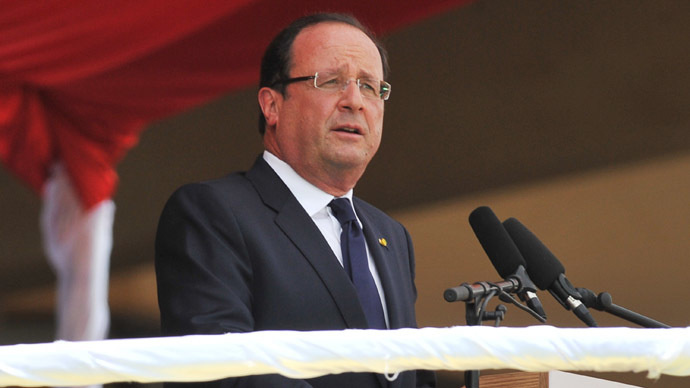
The French president highlighted Russia supplying arms to the
Syrian government as one of the reasons for his decision to
provide the rebels with arms.
19:26 GMT: US Secretary of State John Kerry urged the UN
Security Council to take action on Syria next week.
"The Security Council must be prepared to act next week,"
Kerry told reporters. "It is vital for the international
community to stand up and speak out in the strongest possible
terms about the importance of enforceable action to rid the world
of Syria's chemical weapons."
Kerry said that although the UN mission in Syria had no mandate to determine who was behind the Ghouta chemical attack which claimed hundreds of lives in August, the facts provided by inspectors clearly implicate that Bashar Assad’s government is to blame.
18:30 GMT: Christian leaders from the World Council of
Churches (WCC) are planning a summit on Syria, similar to the
Geneva II negotiations world powers have long been trying to
hold.
"There is no military solution to Syria,” the general
secretary of the WCC, Rev. Olav Fykse Tveit, told journalists.
"Now is the time to say everyone has failed and there has to
be a change and that change has to include all parties and that
includes the president [of Syria]."
17:45 GMT: The World Bank has said that the refugee crisis engulfing Lebanon as a result of the Syrian civil war will cost the country $7.5 billion.
17:40 GMT: The Organization for the Prohibition of Chemical Weapons (OPCW), the world's chemical weapons watchdog, will meet Sunday to discuss the Russian-US plan to destroy Syria's arsenal, it said.
17:30 GMT: Bulgaria has asked the EU for aid to help it cope with Syrian refugees, the interior minister said Thursday. Over 4,000 illegal immigrants, about half of them from Syria, are seeking asylum in Bulgaria and Sofia says its capacity is at breaking point.
17:25 GMT: NATO Secretary General Anders Fogh Rasmussen said he doesn't foresee NATO playing a role in the agreement to destroy Syria's chemical weapons, but said that individual NATO countries may help to implement it.
14:15 GMT: Russian President Vladimir Putin has said that
he believes the use of chemical weapons in Damascus on August 21
was a provocation on the part of the Syrian rebels.
“We have every grounds to believe that it was a provocation. Of course, it was adroit and clever, but, at the same time, primitive in terms of technical performance. They took an old Soviet-made missile, which was taken out of service in the Syrian army long ago. It was most important to have ‘made in the USSR’ written [on the missile],” Putin said at the Valdai discussion forum on Thursday.

12:30 GMT: Russia is ready to take part in the transportation and destruction of Syrian chemical weapons, according to Russia’s Defense Minister Sergey Shoigu.
“What awaits us is a huge and serious task to fulfill, and we are only at the beginning of the process,” said Shoigu as cited by Vesti24. “Whatever role we get when it comes to international control [of Syrian chemical weapons] – be it transportation or destruction – Russia and its military forces are naturally ready to take it on.”
12:15 GMT: An estimated 130 French nationals or immigrants are now fighting in Syria, according to the country’s Interior Minister, Manuel Valls.
“It worries me because they could represent a potential threat [to France] upon their return,” Valls said, as cited by France 24.
The Minister specified that the number is bigger than in other recent conflicts in the region, such as Iraq or Afghanistan.
12:00 GMT: Turkey has shut one of its border gates to Syria following fighting, which took place in the Syrian town of Azaz near the Turkish frontier. Two rebel groups reportedly confronted each other - an Al-Qaeda affiliated group clashed with the Western-backed Free Syrian Army, according to a Turkish official, cited by Reuters.
"The Oncupinar border gate has been closed for security reasons as there is still confusion about what is happening on the Syrian side. All humanitarian assistance that normally goes through the gate has ceased," the official said.
11:25 GMT: Russia is completely ready for the possible
evacuation of its citizens from Syria in case it is needed,
according to Russia’s Defense Minister Sergey Shoigu, cited by
RIA news agency. Seven thousand Russian citizens are currently in
Syria. The Minister said he was ordered by President Putin to
prepare the evacuation plans.
Wednesday, September 18
23:58 GMT: The US is working with Syrians to collect evidence to use against President Bashar Assad, who should “absolutely” be tried for crimes against humanity, a top US official on war crimes said.
“Enormous crimes have been committed that can be traced directly to the highest levels of the Syrian regime,” Stephen Rapp, the US ambassador-at-large for war crimes issues, told Yahoo News on Wednesday.
Rapp added that the mounting evidence would make prosecution easier than cases “we’ve seen at the international level against a chief of state.”
“Without question, there are credible, very credible allegations of crimes against humanity, murder, rape, mutilation, other crimes,” Rapp said. “And, of course, since we now have a civil war these become war crimes as well.”
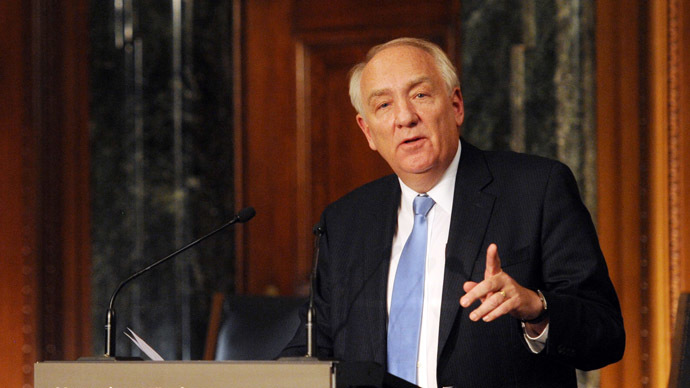
Rapp said that Syrian partners have obtained more than 200,000 pages of documents which are now being analyzed in a special location that the US helped establish in Europe.
“We’re working with Syrian groups, educating them, training them in how to find this information, identifying it, and measuring shell holes, and determining what direction the shells came from, other things like that ” Rapp said.
Rapp acknowledged the hurdles surrounding a possible criminal case, including reservations from Russia. In the meantime, the accumulation of evidence will go on.
“Our preference is to work with Syrians, with people in the
region, with international players and work toward establishing
some kind of hybrid, or mixed court,” he said. “That will
take time, [but] it could be begun even before there was an end
to the conflict.”
Tuesday, September 17
16:50 GMT: In response to Russia’s criticism of the recent report on the Aug.21 chemical weapon attack, the UN says it is “indisputable” and “thoroughly objective”.
"The findings in that report are indisputable," UN
spokesman Martin Nesirky told reporters. "They speak for
themselves and this was a thoroughly objective report on that
specific incident."
16:42 GMT: NATO's Secretary General Anders Fogh Rasmussen
says military options should remain "on the table" in
negotiations with Syria.
Rasmussen said he supports the recent US-Russian agreement under
which the Assad regime says it will give up its chemical weapons
arsenal.
"I would expect the Syrian regime to fully comply with the
demands of the international community and in the case of
non-compliance we will need a very firm international
response," NATO chief said after meeting British Prime
Minister David Cameron in London.
Rasmussen stressed that it is "crucial that the UN Security
Council expeditiously adopts a firm resolution that can
constitute the framework for a swift, secure and verifiable
elimination of all chemical weapons in Syria"
"I do believe that the credible threat of military action was
the reason why diplomacy got a chance and I think in order to
keep momentum in the diplomatic and political process the
military option should still be on the table," he told
reporters.
12:47 GMT: The chief UN chemical weapons inspector Ake
Sellstrom says his experts will return to Syria "within
weeks" to complete the investigation that was interrupted by
August 21 attack in Damascus suburb. The team will evaluate
"allegations of chemical weapons use from both sides, but
perhaps mainly from the Syrian government’s side."
Sellstrom said he does not see a need for more investigations of
the August 21 attacks, but if the team “receives any
additional information it will be included next time we
report," he added.
12:30 GMT: President Assad thanked Russia for helping Syria confront a "savage attack", AFP reported.
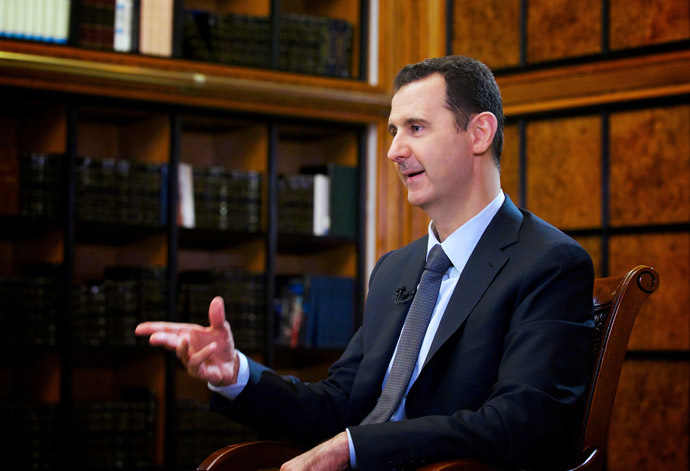
12:25 GMT: Syrian government says it is sure the UN will
not vote for the resolution on Chapter 7 of the UN Charter,
regulating the use of military force on behalf of the council,
AFP reported citing Faisal Mekdad, the deputy foreign minister of
Syria.
“I think it’s a lie that Western countries use. We think this
will never be used. There is no justification for that,”
Mekdad said.
21:53 GMT: Syria has handed over new evidence to Russia that the chemical weapons were used by the armed opposition, Russian deputy foreign minister Sergey Ryabkov told RIA Novosti. “That is really true. Just now we were given evidence. We need to analyze it.”
21:33 GMT: Russian deputy foreign minister Sergey Ryabkov stated that Russia is disappointed that the UN inspectors’ findings are “politicized” and “biased” in nature, adding that without the complete picture of what is happening in Syria, the conclusions can only be described as one-sided.
"We were disappointed to say the least, with the approach adopted by the UN and the UN inspectors, who were in Syria, which was very selective and incomplete, without regard to the circumstances, and was compiled without the collection of materials in the other three sites,” Ryabkov said.
20:55 GMT: In response to a question from a journalist on whether the chemical weapons deal gives Syrian President Bashar Assad job security, State Department spokesperson Jen Psaki said that any government in place would be in charge of seeing it to the end.
“Any individual, any government that is in place, whether that’s a transitional government, whatever it may be, would be in charge of implementing this. And that is the body that would work through this,” she said.
20:40 GMT: The draft UN Security Council resolution on chemical weapons in Syria was presented at the meeting of the five permanent UN members, RIA Novosti cited a UN source as saying. "France, Great Britain and the United States introduced a draft resolution today at a meeting of the five in New York," the source said, adding that Russia and China will be studying the resolution.
20:36 GMT: Russian deputy foreign minister Sergey Ryabkov stated that the first round of talks with Syrian foreign minister Walid Moualem in Damascus was constructive. There are hopes for more positive discussions on Wednesday, Ryabkov said.
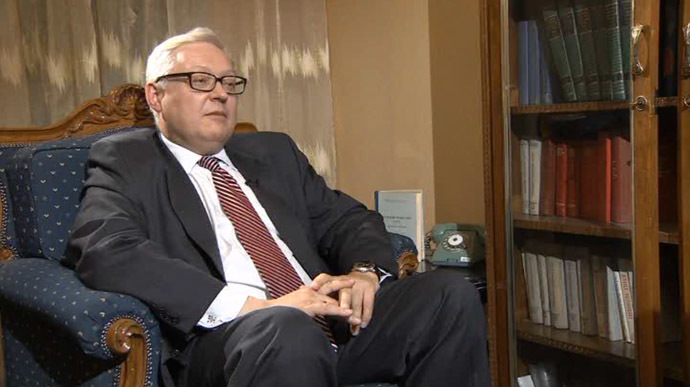
19:39 GMT: Syria’s army has confirmed that its military
helicopter, which was shot down by Turkish forces on September
16, violated the neighboring country’s air space.
The helicopter was on a reconnaissance mission, inspecting the
infiltration of terrorists across the border, and mistakenly
entered Turkish airspace, the military said in a statement
released by Syria’s SANA news agency.
The harsh reaction from Turkish side – particularly, the fact
that the helicopter, not tasked with any fighting mission, was
downed as it headed back to Syria – reveals the real intentions
of Erdogan's government, which is seeking escalation at the
Syrian border, the statement added.
18:50 GMT: Russia urges the interested parties not to hurry
with throwing unsubstantiated accusations of chemical weapons use
against the Syrian government of Bashar Assad, Russian Foreign
Ministry spokesman Aleksandr Lukashevich said.
“Simplistic and groundless accusations against the Syrian
authorities, which, in fact, remove all responsibility from the
opposition, are childish and inappropriate,” he stressed.
“As it’s thorough and, more importantly, professional
establishment of cases of chemical weapons use in Syria, for
which the fresh UN inspectors’ report stands for.”
18:43 GMT: Russian Foreign Minister Sergey Lavrov has held
a phone conversation with UK Foreign Secretary William Hague,
discussing the details of the US-Russia deal, which calls for the
Syrian government’s chemical arsenal to be placed under
international supervision and subsequently destroyed.
"We hope that our British partners would get seriously
involved in the implementation” of the Syrian chemical
weapons accord, Russian Foreign Ministry spokesman Aleksandr
Lukashevich said.
18:00 GMT: The UNSC resolution on Syrian chemical weapons
should be binding and guarantee that the chemical arsenal will be
destroyed in accordance with the agreement reached between the US
and Russia in Geneva, Ban Ki-moon said.
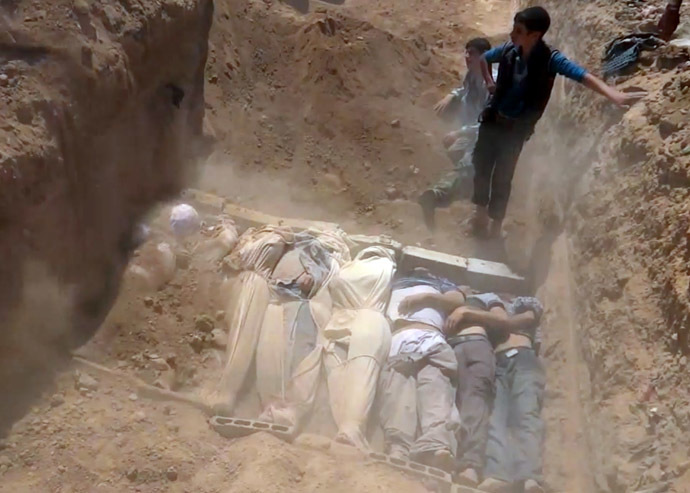
17:09 GMT: The UN report on the Syrian chemical attack on
August 21 does not show that Assad forces used sarin gas, the UN
Secretary General said. The statement came in response to Western
countries, which said the report proves the chemical weapon
attack was perpetrated by government forces.
“If you read the report, you will understand that there are no
conclusions on where those rockets were fired from,” Ban
said.
16:36 GMT: The United States, Russia, Britain, France and
China are expected to meet in New York to discuss a draft
resolution on destroying Syria's chemical arsenal based on a
US-Russian agreement, Reuters reports citing a US official.
"Today, the P5 members of the UN Security Council (US, UK,
France, Russia, China) will meet to discuss the joint P3 (US, UK,
France) draft Security Council Resolution on Syria's chemical
weapons program," Erin Pelton, spokeswoman for the US mission
to the UN, said in an email.
16:34 GMT: While Russia's deputy foreign minister is
negotiating with the Syrian foreign minister, Walid Moualem,
there are media reports emerging saying that the Syrian
government passed its allies evidence that proves that the rebels
were behind the attack in Ghouta on August 21.
However, RT’s Maria Finoshina, who is currently at the meeting, says there are no details about the report.
14:41 GMT: Russian deputy foreign minister, Sergey
Ryabkov, will arrive in the Syrian capital Damascus on Tuesday to
hold talks with the country’s foreign minister, Walid Moualem,
Russia's Foreign Ministry told RT.
14:18 GMT: The implementation of the US-Russia deal on
chemical weapons in Syria has topped the agenda of the Moscow
meeting between the Russian President’s plenipotentiary for
Middle East issues, Mikhail Bogdanov, and the Syrian ambassador
to the country, Riyadh Haddad.
The officials also shared the view that a political settlement to
the crisis in the Middle eastern state must be reached as soon as
possible based on the Geneva Communique, which calls for a peace
conference on Syria, the Russian Foreign Ministry said.
Monday, September 16
19:06 GMT: Russia expects the draft UNSC resolution on
Syrian chemical weapons, which is now being prepared by France,
Britain and the US, will be based on agreements reached at the
meeting between Russia’s Foreign Minister Lavrov and US Secretary
of State John Kerry.
"I hope, this draft resolution will be based on what was
agreed in Geneva and will not contain elements they [France,
Britain and the US] sometimes introduce in public
statements,” Russia’s UN envoy Vitaly Churkin said.
18:21 GMT: The inspection team concluded that the
munitions linked to one of the impact sites, called Site 1 in the
report, matched types of the Soviet-made M14 artillery rocket,
“with either an original or improvised warhead." The UN
experts suggested that based on the “orientation and impact
craters” and other damage in the area, the rockets were fired
from an unspecified area to the northwest.
18:36 GMT: After the presentation of the UN report,
Samantha Power, the US Ambassador to the United Nations, said
that she was convinced, based on the technical details from the
inspectors, the weapons belonged to forces loyal to President
Assad's regime.
“Now the mandate of the UN chemical weapons team was, as you well
know, not to investigate capability. But the technical details of
the UN report make clear that only the regime could have carried
out this large-scale chemical weapons attack,” Power told
reporters at a news conference.
16:23 GMT: The UN Secretary General said the conclusions
drawn in the report are “overwhelming and indisputable”.
“The facts speak for themselves,” he added.
Ban called the attack in
Ghouta “the most significant confirmed use of chemical weapons
against civilians since Saddam Hussein used them in Halabja in
1988.”
15:35 GMT: Turkish warplanes have shot down a Syrian helicopter after it crossed 2 km into Turkish air space, Turkey's Deputy Prime Minister, Bulent Arinc, has admitted.
"It was continuously warned by our air defense but as the
violation continued, it fell on Syrian soil at 2:25 pm [1125
GMT], having been hit by missiles from our planes," he told
assembled journalists.
Arinc said that the fate of the pilots was unclear. The Syrian
Observatory for Human Rights, a UK-based NGO, claimed that one of
the men has been captured by anti-Assad rebels.
12:50 GMT: The head of the UN panel on war crimes in Syria claims that 14 cases of chemical attacks are currently being investigated.
12:40 GMT: The US, UK and France are pushing for more aid
to the Syrian rebels, while also pressing President Assad to
deliver on his promise of handing the chemical weapons arsenal
over to international hands.
But they still argue that no end to the conflict is in sight,
unless Assad leaves.
08:44 GMT: France, Britain and the US will press for a strong UN Security Council resolution on Syrian chemical weapons, the French president's office says. They want the document to include detailed and binding dates for the planned dismantling of the stockpile.
01:23 GMT: A Russian newspaper Kommersant has published a response from Rep. Steve Israel to President Vladimir Putin's editorial in the New York Times last week that stirred a lot of controversy among US officials while generally getting support among the American public.
In his letter Israel says that if diplomacy fails the US should
act to prevent the spread of chemical weapons “without boots
on the ground and in a limited, focused and swift way.” He
argues that “Bashar al-Assad has used chemical weapons
repeatedly” and that “we don't want Syria’s chemical
weapons to fall into the wrong hands -including some elements of
the rebel forces in Syria.”
In regards to Putin’s comment on American exceptionalism, Israel
wrote:
“If your leaders are serious about truly creating a regimen to
control and contain chemical weapons in Syria under international
supervision in a transparent, verifiable and effective way, then
we will be able to add this to the latest example of exceptional
achievements partnered by our two nations.”
Sunday, September 15
19:28 GMT: On Monday, Secretary General Ban Ki-moon will
present a report by the UN team on the chemical weapons in Syria.
Ban earlier revealed the report will give "overwhelming"
confirmation that arms of mass destruction were used in an attack
near Damascus on August 21.
"Therefore, I'm sure that there will be surely the process of
accountability when everything is over," he said.
However, the UN team is not expected to say who was responsible
for the attack as it was only tasked to either confirm or deny
the use of chemical agents.
19:15 GMT: Iran has information that it’s the rebels, not
the government forces, who used chemical weapon in Syria,
according to Iran’s new Foreign Minister, Mohammad Javad Zarif.
“The chemical weapons are still in the possession of
extremists and terrorists in Syria, which threatens not only
Syria,” Zariff told Lebanese TV channel, Al-Mayadin.
Iran condemns the use of weapons of mass destruction – no matter,
who resorted to using it and who suffered from it, the Foreign
Minister added.
19:02 GMT: French President Francois Hollande has said
military action against the Assad regime in Syria is still an
option. France insists the UNSC resolution on Syria should
include sanctions in case Damascus failed to hand over it
chemical weapons to international control. However, Hollande did
not specify what sanctions.
“There should be the possibility of using military force,
otherwise the resolution will not have power,” Hollande said.
Speaking on French prime-time television, he said resolution could be voted by the end of the week.
13:10 GMT: Israel’s Prime Minister Benjamin Netanyahu
expressed the country’s hope that the Russian-US deal for
bringing Syria’s chemical weapons arsenal under international
control would result in its “complete destruction”,
Reuters reports.
"We hope the understandings reached between the United States
and Russia regarding the Syrian chemical weapons will yield
results," the PM said, speaking at a ceremony to commemorate
the Israeli soldiers killed in the 1973 Middle East war.
"These understandings will be judged by their result - the complete destruction of all of the chemical weapons stockpiles that the Syrian regime has used against its own people," Netanyahu added.
12:26 GMT: The Arab League welcomed Saturday’s agreement between the US and Russia to dismantle Syria’s chemical weapons stockpile by mid-2014 in exchange for military non-intervention, AFP reports.
07:27 GMT: Syrian opposition group National Coaltion of Syrian Revolution and Opposition Forces demanded that the international community forced the Syrian Army to stop using its air superiority, after Damascus agreed to dispose of its chemical weapons stockpile.
“The prohibition of chemical weapons, the use of which has left more than 1,400 civilians dead, [should] be extended to the use of ballistic missiles and aircraft against urban areas,” the coalition said in a statement.
07:00 GMT: Iran said the deal between Russia and the US
for the removal of Syria's chemical arsenal was a sign of
"rationality" in American behavior, Iranian ISNA news
agency quotes.
Ali Larijani, a speaker at the Iranian parliament, spoke at a Saturday news conference, saying that a US strike would only result in larger regional conflict and would constitute a breach of itnernational law, and that the US has realised this.
"We are hopeful that American politicians have some rationality so they avoid extremist behavior, and the events of the last few days and the decisions that have been taken indicate this rationality," he said.
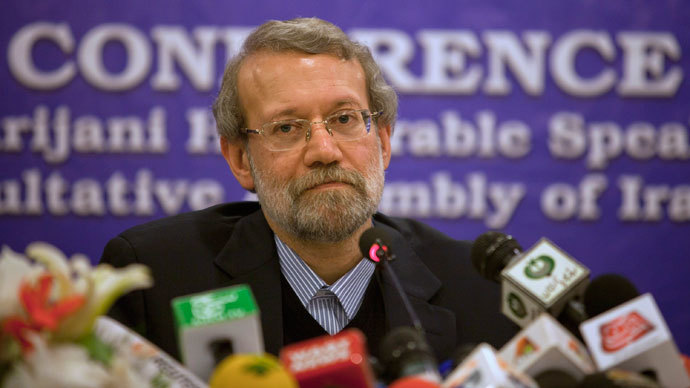
5:37 GMT: US Secretary of State John Kerry is to make a brief stop in Jerusalem on Sunday for talks with Israeli Prime Minister Benjamin Netanyahu on the US-Russia deal to secure Syria’s chemical weapons stockpiles.
He will then travel to Paris for further discussion on Syria with his French and British counterparts Laurent Fabius and William Hague, respectively. Kerry is also scheduled to meet with Saudi Arabia’s foreign minister, Saud Al Faisal, while in Paris.
04:53 GMT: China’s Foreign Minister Wang Yi has welcomed
the deal between Russia and the United States
concerning the elimination of Syria’s chemical weapons arsenal,
AFP reports.
"The Chinese side welcomes the general agreement between the
US and Russia. This agreement will enable tensions in Syria to be
eased," he said during the visit of his French counterpart
Laurent Fabius.
The French FM, who arrived to Beijing Sunday morning, called this “a significant step forward”, adding that “we must move forward on the basis of this general agreement.”
Saturday, September 14
21:03 GMT: Syria has welcomed the agreement reached in Geneva between the Russian
Foreign Minister Sergei Lavrov and his US counterpart John
Kerry. In a statement by the Syrian Prime Minister Wael
al-Halqi, Damascus has assured the implementation of the
deal as the “sole exit” from the crisis, expressing
Syria's welcome of the ''credible international initiatives,
first and foremost the Geneva 2 conference."
20:30 GMT: The Syrian National Coalition has appointed a
new interim Prime Minister. The main Western-supported opposition
alliance has named Ahmad Saleh Touma, a dentist and a political
activist, to be their leader during a meeting in Istanbul.
Touma is the second politician to fill the leader’s post after
Ghassan Hitto resigned in July.
“Syria will be the republic of humans where there will be no
place for killers and criminals,” Touma said shortly after
his appointment.
20:12 GMT: NATO has welcomed the breakthrough in negotiations
on Syria, praising the diplomatic effort of the US Secretary of
State John Kerry and Russian foreign minister Sergey
Lavrov.
"This is an important step towards the goal of ensuring the
swift, secure and verifiable elimination of Syria's stocks of
chemical weapons. Full and unreserved Syrian compliance is now
key,” Secretary General Anders Fogh Rasmussen said.
19:58 GMT: In its first reaction to a deal struck between
John Kerry and Sergey Lavrov in Geneva, Iran – the main ally of
the Syrian government said that Washington now has no excuse to
attack Syria.
“The new situation means in fact that any pretext for the United
States and certain countries to engage in military action against
Syria has been removed,” Hossein Amir-Abdollahian, Iran's
Deputy Foreign Minister said.
19:35 GMT: US Republican Senators John McCain and Lindsey Graham have criticized Russian-American agreement on the Syrian chemical weapons calling it a start down a “diplomatic blind alley,” reports Reuters.
The senior lawmakers said in a statement that the deal reached between Lavrov and Kerry in Geneva will afford Syria’s Assad months to “delay and deceive” while more people die in the Syrian war.
“It requires a willful suspension of disbelief to see this agreement as anything other than the start of a diplomatic blind alley, and the Obama administration is being led into it by Bashar Assad and Vladimir Putin,” the statement reads.
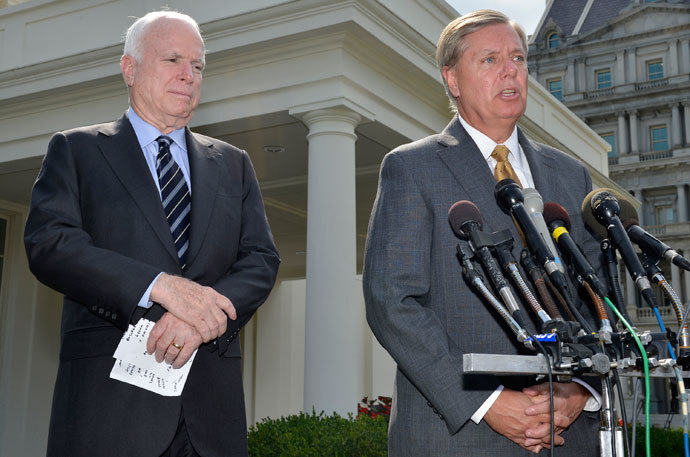
18:40 GMT: The UN has confirmed receiving the documents that Syria submitted for joining the Chemical Weapons Convention.
“The Convention will enter into force for the Syrian Arab
Republic on the 30th day following the date of deposit of this
instrument of accession, namely on 14 October 2013,” the UN
press office said in a statement, Reuters cites.
18:00 GMT: The European Union said Saturday it welcomed
the Russian-US deal to destroy Syria's chemical weapons
stockpiles and offered to help in implementing the agreement.
"I welcome the agreement reached today between the United States and the Russian Federation to ensure the swift and secure destruction of Syria's chemical weapons and programme," EU foreign policy chief Catherine Ashton said in a statement.
GMT 16:43: The Syrian opposition to embattled President Assad, an umbrella group led by the Syrian National Coalition, has elected the moderate Islamist Ahmad Tumeh as their provisional prime minister. Tumeh, a 48-year old former political prisoner from the east of Syria, received 75 votes out of the 97 cast in a ballot in Istanbul.
The move is seen by analysts as an attempt to raise its
credibility as high stakes diplomacy plays out between the US and
Russia to try and resolve Syria’s two year civil war. Tumeh is an
independent Islamist and has been appointed to run rebel-held
areas where a slide into chaos has threatened to undermine the
opposition to President Assad.
16:10 GMT: US President Barack Obama has said he welcomes
progress reached between Moscow and Washington on Syrian chemical
weapons. However, if diplomacy fails the US remains prepared to act.
15:55 GMT: Fidel Castro, the former president of Cuba, has applauded a Russian-led proposal to destroy Syria's chemical weapons. The former leader wrote "the intelligent Russian initiative" meant "the risk that the conflict explodes with its lamentable consequences seems to have diminished."
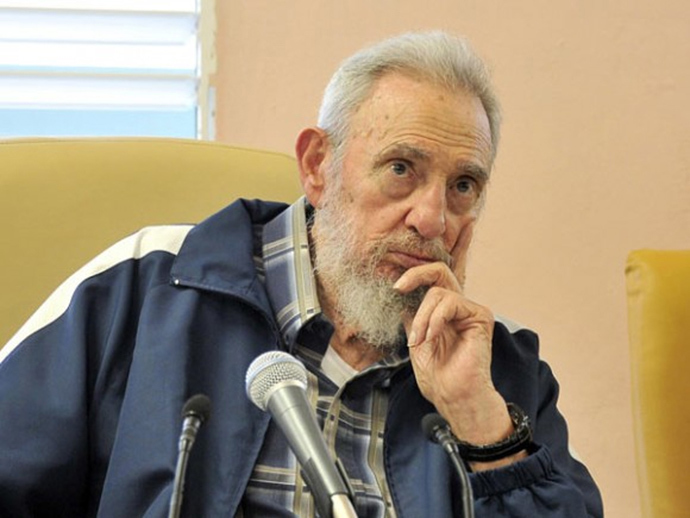
The US and Russia reached an agreement Saturday at talks in
Geneva to implement the plan.
15:49 GMT: US military has not made any changes to force
posture following the American-Russian agreement on Syria, the
Pentagon says as cited by Reuters.
“The credible threat of military force has been key to driving diplomatic progress, and it's important that the Assad regime lives up to its obligations under the framework agreement,” Pentagon spokesman George Little said in a statement.
15:01 GMT: There are 45 facilities in Syria that develop or store chemical weapons,believe US experts according to the French newspaper Le Figaro.
"Most likely, there are 45 facilities associated with the
chemical weapons’ program ", the newspaper quoted an unnamed US
official. The official added that the US and Russia agree on the
fact that the stockpile of chemical weapons in Syria is estimated
at about one million tons.
14:46 GMT: A representative of the Syrian top-brass has dismissed as groundless earlier statements by the head of the Free Syrian Army (FSA) regarding the alleged moving of part of Syria’s chemical weapons arsenal to neighboring Iraq and Lebanon.
“This is an absolutely groundless lie,” a senior member of the Armed forces told RIA Novosti.
13:23 GMT:
Have spoken to Secretary Kerry. UK welcomes US-Russia agreement on #Syria chemical weapons. Urgent work on implementation now to take place
— William Hague (@WilliamJHague) September 14, 2013
13:06 GMT: The head of the Free Syrian Army (FSA) has
accused the government of President Bashar Assad of moving part
of its chemical weapons to neighboring Iraq and Lebanon over the
last few days in a bit to avoid detection by international
inspectors.
Damascus did not immediately reply to the accusations.
FSA chief General Selim Idriss earlier in the day refused a
US-Russian deal to place its chemical weapons arsenal under
international control so as to avert the potential of a Western
strike against the country.
"The Russian-American initiative does not concern us. It only
seeks to gain time," Idriss said.
"We completely ignore this initiative and will continue to fight
to bring down the regime," he told a press conference
Saturday in the Turkish city of Istanbul.
Idris considers the US-Russia plan as a blow to rebel forces, who have been battling for two-and-a-half-years to topple the Assad government.
12:57 GMT: UN Secretary General Ban Ki-moon has promised
his full support in implementing the Geneva agreement reached
Saturday by Russia and the US on eliminating Syrian chemical
weapons.
12:42 GMT: France has welcomed the deal between Russia and the United States on
destroying Syria's chemical weapons.
"The draft agreement reached in Geneva about eliminating the
Syrian regime's chemical weapons is an important step
forward," Reuters reported French Foreign Minister Laurent
Fabius as saying in a statement.
11:43 GMT: The President of Syria’s Supreme Military Opposition has said the Russian initiative on the Assad government’s chemical weapons will not solve the conflict that has raged for two years.
10:41 GMT: The US is ready for military action if
diplomacy fails on Syria, President Obama said.
Friday, September 13
20:50 GMT: The United States has accepted that Russia will
block any efforts at the UN Security Council to authorize
military action against the Syrian government, senior White House
officials conceded Friday, AFP reports.
The officials, speaking on condition of anonymity, said that a UN
report on a chemical weapons attack that occurred in a Damascus
suburb will chip away at Moscow’s claim rebel forces were
responsible. They admitted, however, that the new findings set to
be published Monday will do little to persuade the Kremlin that
military action is the right course.
The officials maintain the US still has the option of acting
unilaterally or cobbling together a coalition if the Russian
backed initiative to put Syria’s chemical weapons under
international control falls through. They further said Western
powers would beef up a draft resolution against Syria with
tougher sanctions, but not military action,in the hope that
Moscow will drop its veto.
20:40 GMT: The United States and Russia will enter their third day of negotiations on ending Syria’s chemical weapons program, a US official said. Russian Foreign Minister Sergey Lavrov and his US counterpart John Kerry will join negotiators before holding a joint press conference later on Saturday.
"This morning's meeting has started," Reuters cites the US
official as saying.
Both sides view the elimination of Syria’s chemical weapons
stockpiles as a necessary precursor to finding a political
solution in a country that has been embroiled in civil war for
over two years.
22:14 GMT: Republican Senator John McCain said he would love to write a response to Vladimir Putin’s recent Op-Ed in the New York Times and his spokesman, Brian Rogers, confirmed that McCain will submit a piece in the Russian newspaper Pravda.
“We would be only pleased to publish a story penned by such a prominent politician as John McCain," Dmitry Sudakov, the English editor of Pravda, told Foreign Policy.
McCain’s submission in both Russian and English is expected by next Wednesday at the latest.
18:45 GMT: France, the United Arab Emirates and Jordan have agreed to strengthen the Syrian opposition in its battle with President Assad.
The Elysee said in a statement Friday that President Hollande and the ministers from the three countries "agreed on the need to strengthen international support for the democratic opposition."
18:30 GMT: President Barak Obama said Friday, after a meeting in the White House with the emir of Kuwait Sheikh Sabah al-Ahmad al-Jaber al-Sabah, that he hopes talks on the destruction of Syria's chemical weapons will be successful but he will insist that any deal is "verifiable and enforceable".

18:15 GMT: The US State Department said Friday it is confident that the UN report on the 21 August chemical weapons attack in Damascus will say that they were used but is unlikely to assign blame.
18:10 GMT: The Russian Foreign Ministry announced Friday that US Secretary of State John Kerry, Russian Foreign Minister Sergei Lavrov and UN envoy Lakhdar Brahimi agreed at a meeting in Geneva that only a political solution will end the civil war in Syria.
The ministry also said that they had agreed to meet in New York at the end of the month for more talks on Syria on the sidelines of UN General Assembly meeting.
18:00 GMT: The French, British and US foreign ministers will meet for lunch in Paris Monday to discuss the Syrian crisis, France's foreign ministry announced Friday.
17:35 GMT: Speaking by phone to AP from the Netherlands the head of the UN chemical weapons inspection team, Ake Sellstrom, says he has completed his report on Syria and will deliver it to the UN Secretary General Ban Ki-Moon over the weekend.
"It’s done, but when to present it is up to the Secretary General," he said.
17:30 GMT: A UN report will show that chemical weapons were used on August 21 in Syria, UN Secretary General Ban Ki-moon said Friday.
Ban’s comments at the UN Development Forum in New York said that the inspectors’ report will be released “as soon as possible.”
"I believe that the report will be an overwhelming,
overwhelming report that chemical weapons (were) used, even
though I cannot publicly say at this time before I receive this
report," he said.
A UN team has been analyzing evidence gathered in Syria about the attack, which the US government says was launched by Assad’s forces and killed 1,400 people.
However, the chief UN weapons inspector, after confirming to AP that the report was completed, declined to comment on its conclusions.
Ban said he was “very much troubled” by divisions over Syria among members of the US Security Council, which has been unable to adopt any resolutions on Syria during the now 2 1/2-year civil war.
He said that if the deadlock at the UN continues, it will represent a “failure.”
Ban said that Syrian President Bashar Assad had “committed
many crimes against humanity” and should be held
accountable when the conflict is over.
16:50 GMT: Putin’s spokesman, Dmitry Peskov, argued
against premature forecasts and speculation about what the
international community would do to resolve the Syrian crisis.
"Any arguments outside of the current dialogue in Geneva
between Russian Foreign Minister Sergey Lavrov and US Secretary
of State John Kerry should not have the right to exist,"
Peskov said. "The stakes are so high, so ghostly is the
glimmer of hope, that it is better to refrain from commenting
on the modalities of possible proposals."
16:48 GMT: Egypt supports neither of the parties in the
Syrian conflict, Egyptian Foreign Minister Nabil Fahmy told RIA
Novosti news agency, but instead is calling for a political
solution to the crisis within the framework of the so-called
“Geneva-2” peace conference.
''We want to achieve a political solution to this problem
based on the principles of Geneva-2 that will preserve the
integrity of the Syrian state,” Fahmy said.
“We have no authority, and we do not seek to support any particular government there, it is a Syrian decision. We want to preserve Syria, a state that is threatened with break-up. We have supported the Syrian revolution in the sense of the aspirations of the Syrians to a better, free and democratic life. We have condemned many steps of the Syrian government, but we are against the division of Syria, its division on religious principles. There is no military solution to the Syrian crisis.”
Fahmy added: “The former president [Mohamed Morsi] said that
he wanted to start a holy war in Syria. We're not going to wage
it. This is an irresponsible statement that does not correspond
with our national interests.”
16:20 GMT: Al-Qaeda linked rebels in Syria have declared an offensive against two other insurgent factions in the Syrian opposition. The Islamic State of Iraq and the Levant (ISIL) have accused each other of attacks and collaborating with the government. Analysts have reported an inclease in clashes between rebels in recent months mainly over territory and the spoils of war.

16:15 GMT: UN chief Ban Ki Moon has said that Syrian President Assad has committed many crimes against humanity.
Referring to a UN report into the use of chemical weapons he said, "I believe that the report will be an overwhelming report that chemical weapons (were) used even though I cannot publicly say at this time before i receive the report."
16:00 GMT: The UN has said that Syria's application to
the chemical weapons treaty is not complete. The UN has asked
Syria for more information in order to join the chemical
weapons convention. The UN declined to say what information was
actually missing.
15:50 GMT: A new report from the United Nations
Commission of Inquiry on Syria has documented the brutal
tactics used by the Syrian government are using against
civilians, including electrocution, rape and getting medical
professionals to torture hospital detainees. It also fingers
the rebels for using brutal methods but to a lesser degree.
15:45 GMT: Human Rights Watch accused Syrian government
forces and pro-regime militias Friday of carrying out summary
executions in predominately Sunni Muslim towns along the
Mediterranean coast in May in which at least 248 people died.
15:40 GMT: Around 3,300 Syrians have arrived in Italy by
boat over recent weeks the UN refugee agency said Friday. Many
have come from troubled Egypt, where they at first found a
haven from violence and bloodshed.
15:33 GMT: The Organization for the Prohibition of
Chemical Weapons (OPCW) said that Syrian Deputy Foreign
Minister Faisal Mekdad had requested technical assistance in
joining the group.
12:11 GMT: The UN has asked Russian Foreign Minister
Sergey Lavrov and US Secretary of State John Kerry to help a
team investigating human rights violations get into Syria.
“The Human Rights Council has repeatedly called upon the
Syrian authorities to grant access to the members of the
commission of inquiry,” wrote U.N. Human Rights Council
president, Remigiusz Henczel, in a letter to the two diplomats,
adding that previous requests had fallen on deaf ears.
12:00 GMT: Unnamed US officials talking to the Wall Street Journal allege that a secret Syrian military outfit has been dividing the countries chemical weapons arsenal between up to 50 different sites. The top secret group, known as Unit 450, has been moving stocks around for months in the hope of avoiding detection, in the event of US airstrikes.
09:14 GMT: Russian Foreign Minister Sergey Lavrov and his US counterpart John Kerry have agreed to meet on the sidelines of the UN General Assembly on September 28 to further discuss kick starting the stalled Geneva II peace conference on Syria.
Speaking alongside Kerry and Lavrov in Geneva on Friday,
Lakhdar Brahimi, the United Nations and Arab League Special
Envoy to Syria, said ongoing work to hand to put Syria’s
chemical weapons under international control was a necessary
step for convening the Geneva II conference.

"We look forward to working on the chemical weapons [issue]
in Syria. This is extremely important in itself, and it is
important for us in trying to successfully organize the Geneva
II conference,” Brahimi said.
Lavrov and Kerry both expressed hopes that talks on Syria’s
chemical weapons would revive efforts at coming to a political
settlement in the country.
08:45 GMT: Iran has backed Russia’s initiative to place
Syria’s chemical weapons under international control and the
decision by Syria to sign the Chemical Weapons Convention
"We would like to support all these efforts ... the Russian
initiative and Syria's decision to join the convention focused
on chemical weapons," Reuters cites President Hassan
Rouhani as saying at a summit of a regional security group led
by China and Russia.
08:25 GMT: China’s Foreign Ministry welcomed on Friday a decision by Syria to sign the Chemical Weapons Convention.
Damascus has promised to submit all of the documents to the
United Nations needed to join the treaty over the next several
days. A month after signing the convention, Syria says it will
hand over all the information regarding its chemical weapons
stockpiles to relevant international bodies.
Syrian President Bashar Assad said his decision to place the
country’s chemical weapons under international control was
prompted by Russia, and a US threat to attack the country
following an August 21 attack in a Damascus suburb did not
“influence the decision.”
08:16 GMT: Secretary of State John Kerry said talks with
his Russian counterpart Sergey Lavrov in Geneva on Thursday
night regarding the ongoing crisis in Syria were
“constructive.”
Kerry, who met with Lavrov and Lakhdar Brahimi, the United
Nations and Arab League Special Envoy to Syria, kicked off the
first round of negotiations regarding Russia’s initiative to
see Syria’s chemical weapons brought under international
control.
Lavrov, who also met with his Kazakh counterpart Erlan Idrisov
in Astana on Thursday, said “I'm positive there is a chance
for peace in Syria, and it cannot be missed.”
“It is necessary ensure Syria’s adherence to the Organization
for the Prohibition of Chemical Weapons, which would entail a
declaration of Syria’s chemical weapons storage sites and the
disclosure of its chemical [weapons] program," he said.
Russia remains opposed to efforts within the UN Security
Council to force Syria to hand over its chemical weapons
arsenal under the threat of force.
07:12 GMT: Russia welcomes Syria's decision to join the Chemical Weapons Convention, which is aimed at prohibiting chemical weapons use, President Putin said.
Putin said, “I think we should welcome this decision of the Syrian leadership and I would like to hope that this will be an important step in dealing with the crisis.”
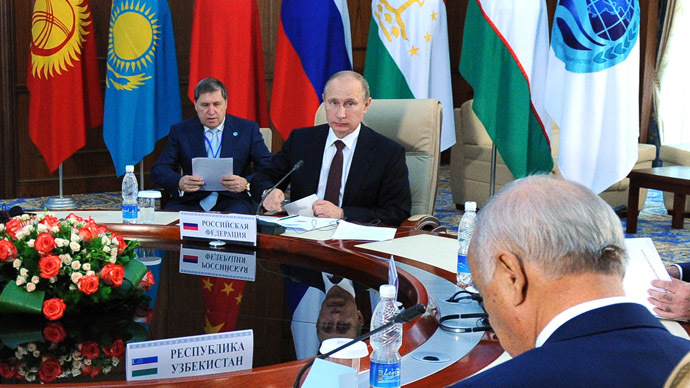
Russia’s President stated, “This confirms the serious
intentions of the Syrian partners.” The leader underlined, “We
consider intolerable any foreign military intervention into
this country without the UN Security Council sanctions.” He
also stressed, “The efforts that have been recently made
have permitted to decrease the direct threat of a military
operation.”
Thursday, September 12
23:15 GMT: Russian Foreign Minister Sergey Lavrov,
Secretary of State John Kerry and UN Arab League envoy Lakhdar
Brahimi, will meet in Geneva for talks on Syria on Friday, a
diplomatic source told RIA Novosti.
20:14 GMT: After the UN accepted documents from Damascus concerning Syria joining the Chemical Weapons Convention, Syria has “legally speaking” become a full member of the treaty, Syrian UN Ambassador Bashar Jaafari said.
"Legally speaking Syria has become, starting today, a full member of the convention," Ambassador Bashar Jaafari told reporters in New York.
18:30 GMT: White House Press Secretary Jay Carney has
repeated the view of the Pentagon that Russia is "isolated
and alone" in denying Assad has used chemical weapons.
17:55 GMT: Russian Foreign Minister Sergey Lavrov said
now that Syria has agreed to Moscow’s proposal to put its
chemical weapons stockpiles under international control, there
is a chance to convene the peace talks on Syria, Geneva-2, that
will help end the ongoing conflict.
“We proceed from the premise that the solution to this
problem makes any military strike against Syria
unnecessary,” he said at a media conference in Geneva, ahead of talks with US
Secretary of State John Kerry.
17:50 GMT: The US says there is no change in its position that Bashar al-Assad absolutely must not be part of Syria’s political future, despite Washington’s willingness to work with Assad on chemical weapons removal.
17:45 GMT: The US says it accepts that the removal of
chemical weapons from Syria is complicated and will "take some
time".
17:40 GMT: The US has said that it will not allow Syria
to use accession to the anti-chemical weapons treaty as a
stalling tactic and that the option of military strikes is
still on the table.
16:30 GMT: A spokesman for the UN has said that they have received documents from Damascus concerning Syria joining the Chemical Weapons Convention. The Convention came into force on 29 April 1997 and is signed by 189 countries.
"In the past few hours we have received a document from the
government of Syria that is being translated, which is to be an
accession document concerning the Chemical Weapons
Convention," UN spokesman Farhan Haq told reporters
16:00 GMT: The US has said that Russia is "isolated and alone" in blaming the Syrian rebels for the Chemical attack in a Damascus suburb that killed almost 1500 people on the August 21.
"Russia is isolated and alone in blaming the opposition.
We've seen no credible reporting that the opposition has used
chemical weapons in Syria," Pentagon press secretary George
Little told reporters Thursday.
15:30 GMT: Russian Foreign Minister Sergey Lavrov has arrived in Geneva for talks with Secretary of State John Kerry. The US President, Barak Obama, has said he hopes the outcome will be positive, according to a statement issued by the White House Thursday.
14:30 GMT: Syria will start passing information on its chemical weapons to international organizations a month after it signs the Chemical Weapons Convention, President Bashar Assad said in an interview with Rossiya-24 TV channel.
It does not mean though that mean the country “will sign the documents, fulfill the obligations and that’s it,” Assad said. “It’s a bilateral process aimed, first of all, at making the US stop pursuing its policy of threats against Syria.” He added that a lot would also depend on the extent to which Russia’s proposal is accepted.
No country in the Middle East, including Israel, should possess weapons of mass destruction, Assad said, adding that removing WMD would protect the region and the world from devastating and expensive wars in future.
11:30 GMT: The European parliament has passed a
resolution welcoming the proposal for Syria to put its chemical
weapons arsenal under international control. The document urges
a similar UN resolution to be passed in order to ensure Syria’s
compliance with its pledge to cooperate with the international
community.
11:15 GMT: Britain's Foreign Secretary William Hague says
any Syrian chemical weapons deal must identify all such arms
and ensure they don't fall into the wrong hands, according to
Reuters.
11:00 GMT: Turkish Prime Minister Tayyip Erdogan says he does not believe that Damascus is sincere in its pledge to surrender Syria's chemical weapons to international control.
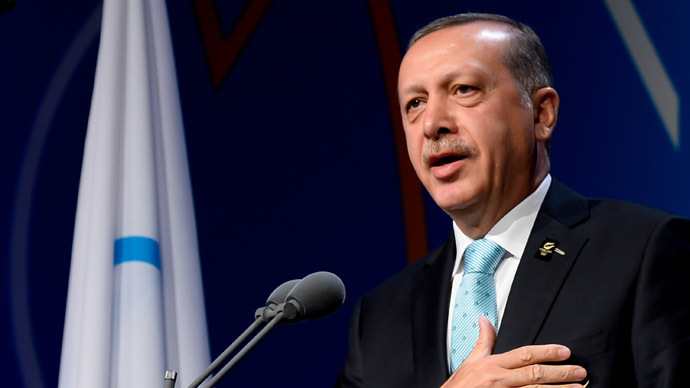
"The Assad regime has not lived up to any of its pledges, it
has won time for new massacres and continues to do so,"
Erdogan said in a speech, as cited by Reuters. "We are
doubtful that the promises regarding chemical weapons will be
met."
10:48 GMT: Aleksey Pushkov, the head of the Foreign
Affairs Committee of the Russian Duma, said the US’s
participation in international military campaigns has only been
making the country weaker.
“All of the recent wars have made the US weaker, not
stronger. You don’t have to be Einstein to understand: a new
war will once again hit America itself,” Pushkov
tweeted.
10:40 GMT: Prior to his meeting with US Secretary of
State John Kerry due later in the day, Russia’s Foreign
Minister Sergey Lavrov welcomed Syria’s readiness to place its
chemical weapons under international control.
"I am certain that there's a chance for peace in Syria,"
said Lavrov at a meeting with students in Kazakhstan. He added
the military intervention would only further destabilize Syria
and the region, according to Interfax news agency.
The US has called on Syria to quickly declare the size and
scope of its chemical weapons.
"It's doable, but difficult," a US official was cited by
AFP.
7:40 GMT: The primary western-backed Syrian rebel leadership council has rejected a Russian initiative to put Syria’s chemical weapons under international control, the group said in a video statement.
"We announce our definitive rejection of the Russian initiative to place chemical weapons under international custody," Reuters cites Salim Idriss, head of the rebel Supreme Military Council, as saying in a video posted online late on Wednesday.
On Monday, Russia called on Syria to turn over its chemical weapons for destruction and sign on to the Chemical Weapons Convention so as to avert Western military intervention in the country. The Syrian leadership agreed to the Russian initiative later that evening.
06:21 GMT: Russian and US chemical weapons experts are set to participate in negotiations between Russia’s Foreign Minister Sergey Lavrov and US Secretary of State John Kerry. The talks are to focus on the chemical weapons crisis in Syria.
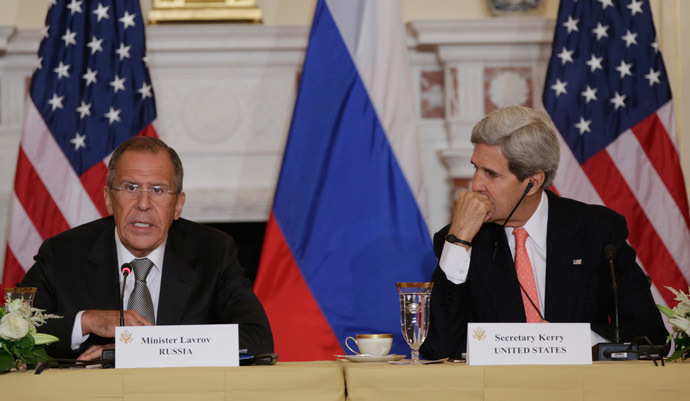
05:34 GMT: A senior Israeli official has said that
Russia’s plan to remove chemical weapons from Syria could be a
solution to the conflict. Strategic Affairs Minister Yuval
Steinitz said that the international community would need a
guarantee from Moscow that “Syria is cleansed of chemical
weaponry."
"I cannot say that we have full faith, but if this Russian
proposal ... will really remove the chemical weaponry from
Syria, first of all, and will then dismantle it ... then this
is a way to end this tragedy and a way to end this threat
too," Strategic Affairs Minister Yuval Steinitz said on
Israel’s Army Radio.
Israeli Prime Minister Benjamin Netanyahu called for the
government of Syrian President Bashar Assad to be “stripped
of its chemical weapons” on Wednesday, but stopped short of
openly voicing his support of the Russian initiative. Damascus
has accepted the proposal and agreed to hand over its chemical
weapons stash to international control.
01:55 GMT: Over the past two weeks the CIA has started delivering weapons to the Syrian opposition, the Washington Post cites US officials and Syrian figures. Vehicles, communications equipment and advanced combat medical kits also been given to Syria by the US State Department.
The arms shipments, which include light weapons and munitions, started arriving in Syria at the time when President Obama was expected to order missile strikes against Damascus.
01:17 GMT: The potential strike by the United States
against Syria, despite strong opposition from all over the
world, will result in more innocent victims and escalation of
the conflict beyond Syria’s borders, President Putin wrote in the New York
Times.
In a lengthy piece titled A Plea for Caution from Russia, the
President reminded that the United Nations was created as a
universal instrument for preventing devastating wars and that
taking military action without Security Council authorization
would be against international law.
“It is alarming that military intervention in internal
conflicts in foreign countries has become commonplace for the
United States,” Putin added.
Wednesday, September 11
20:32 GMT: The five permanent members of the UN Security Council have started a closed-door meeting on the situation in Syria. The meeting where the envoys are expected to discuss the French proposed resolution, it follows a gathering of representatives from Britain, France and the US earlier on Wednesday.
18:50 GMT: Russia has submitted to the UN Security
Council documents providing evidence that chemical weapons were
used by rebel forces, Russian Ambassador to Lebanon Aleksandr
Zasypkin told Al Mayadeen channel, reports RIA Novosti.
18:41 GMT: The US Administration insists that Syrian
President Assad should resign from power, State Department
spokeswoman Jen Psaki says. She added that this “political
decision” would require a dialogue between Syria’s conflicting
sides.
17:46 GMT: American arms experts are going to Geneva with US Secretary of State John Kerry, where he will meet on Thursday with Russian Foreign Minister Sergey Lavrov for talks on Syria, AFP reports.
The talks are expected to last for at least two days, possibly more, State Department spokeswoman Jen Psaki told a media briefing, Reuters reports.
While in Geneva, Kerry also plans to meet with UN-Arab League envoy Lakhdar Brahimi.
16:53 GMT: The five permanent UN Security Council members – Russia, China, Britain, France and the US – will hold a closed-door meeting to discuss France’s draft resolution on chemical weapons in Syria, a UN source told Itar-Tass.
16:20 GMT: The International Committee of the Red Cross
(ICRC) has urged the US and Russia to tackle the obstacles to
delivering aid in Syria. US Secretary of State John Kerry and
Russian Foreign Minister Sergey Lavrov are to meet in Geneva on
Thursday to discuss Russia’s plan to transfer Syrian chemical
weapons to international control.
Both Syrian government forces and rebels are preventing medical
assistance from reaching the sick and wounded, Reuters cited
Red Cross president Peter Maurer as saying.
“We need political and diplomatic support for independent
humanitarian action,” Maurer told journalists.
14:53 GMT: Russia has formally handed over a plan for
“establishing international control of chemical weapons in
Syria” to the United States, Russia’s Interfax and
Itar-Tass news agencies reported, citing sources.
“We are hoping to discuss it in Geneva," a source in the
Russian delegation said.
14:10 GMT: Israeli president Shimon Peres said he trusts the Russian and American presidents regarding a deal to reach a peaceful solution to the Syrian chemical weapon problem.
“I know both President Obama and President Putin, and I am convinced that if an agreement is reached it will be reliable, explicit and significant,” he said at an Israeli Navy graduation ceremony, reports The Times of Israel.
Diplomacy is always preferable to war but the main issue at present is integrity and in particular the integrity of the #Syrian regime.
— PresidentPeres (@PresidentPeres) September 11, 2013
12:03 GMT: NATO supports efforts to control and
eliminate Syrian chemical weapons, an official in the alliance
told Itar-Tass, commenting on Russia’s proposal to Damascus to
put its chemical weapons arsenal under international control.
“Efforts to ensure the control of and ultimate destruction of Syria's chemical weapons are positive and we support the UN in this area; however, the details of these proposals are not yet clear,” the source said. “The international community has a responsibility to make sure that the longstanding norm and practice against the use of chemical weapons is maintained, and violators are held accountable.”
11:23 GMT: Syria’s National Coordination Committee (NCC) has suggested placing chemical weapons under Russia’s control, the rebel Syrian organization said in a statement.
The NCC said that it has submitted its proposal to the Russian ambassador to Beirut as well as to the foreign ministries of Egypt and Iraq. The organization – which is at odds over a number of key issues with another opposition group, the Syrian National Council (SNC) – also called for the so-called “Geneva-2” peace talks on Syria to begin immediately.
07:46 GMT: Russia has handed the evidence over to the UN
Security Council, the head of the Foreign Affairs Committee of
the Russian Duma, Aleksey Pushkov, stressed.
“We have the basis to think not only the Syrian government
has them [chemical weapons]…but we suspect that those weapons
have been used by the rebels several times,” he
indicated.
01:43 GMT: Addressing the nation, the US president has asked Congress to postpone a vote on military action in Syria as diplomacy is pursued to put chemical weapons beyond the regime's reach, but called on the military to maintain pressure on the Syrian government.
Tuesday, September 10
20:19 GMT: A total of 33 countries have now signed a joint statement on Syria condemning the chemical attack on August 21 and blaming the Syrian government for it, the White House said. Eight more countries voiced their support of the “efforts undertaken by the United States and other countries to reinforce the prohibition on the use of chemical weapons.”
20:07 GMT: US Secretary of State John Kerry will meet
Russian Foreign Minister Sergey Lavrov in Geneva to discuss
Syria's chemical weapons on Thursday, US officials told
Reuters. Lavrov is expected to share Russia’s proposals on
securing Syria’s chemical weapons stockpiles under
international control for review by the US administration.
19:14 GMT: The Russian Foreign Ministry said that
Secretary of State John Kerry and Minister Sergey Lavrov have
agreed on a possible bilateral meeting soon to discuss
initiative on Syria’s chemical weapons.
“The two have agreed to work together, including the
possibility of holding a bilateral meeting in the coming days
to discuss concrete ways of fulfilling the initiative of
putting Syrian chemical weapons under international
control,” the Foreign Ministry said following a phone call
between Lavrov and Kerry.
Russia’s proposal to remove Syrian chemical weapons is expected
to be formally sent to the US later on Tuesday, John Kerry said
after the call.
19:03 GMT: UN Security Council closed-door meeting called by Russia has been canceled, according to the Council's current president Australia's Ambassador to the UN, Gary Quinlan.
Following withdrawal of the request for consultations, Security Council meeting scheduled for 4pm will not proceed #OzPrez#UNSC
— Gary Quinlan (@AustraliaUN) September 10, 2013
18:45 GMT: President Obama has reportedly called on the
US Senate to postpone the vote on possible military actions in
Syria until the diplomatic solution is discussed, according
Politico newspaper which cited a source from the closed-door
meeting.
18:43 GMT: John Kerry said that any Syria weapons deal
must be struck in a binding UN Security Council resolution.
17:20 GMT: Barack Obama and Francois Hollande have refused to rule out the possibility of a military strike against Syria, following a telephone conversation.
"The heads of state highlighted their preference for a
diplomatic solution but they also underlined the importance of
keeping all options open," said a statement from Hollande's
press office.
17:15 GMT: Moscow has called an emergency closed-door
consultations at the UN Security Council to discuss its
chemical weapon removal plan. The round-table is expected to
begin at 8 pm GMT Tuesday.
16:45 GMT: Moscow will propose a draft statement by the
chairman of the UN Security Council, supporting the initiative
to transfer Syria’s chemical weapons to international control,
the Russian Foreign Ministry said.
The issue was discussed during a phone conversation between
Russian Foreign Minister Sergey Lavrov and his French
counterpart, Laurent Fabius.
“[Lavrov] said that Russia, on its part, is submitting a
draft statement for the UN Security Council’s chairman,
welcoming the… initiative and calling on the UN Secretary
General, the general director of the Organization for the
Prohibition of Chemical Weapons, and all the interested parties
to make efforts to facilitate the implementation of this
proposal,” the ministry’s statement said.
During the call, Lavrov said described as “unacceptable”
a French proposal to adopt a Security Council resolution
blaming President Assad’s government for the chemical weapons
attack.
15:32 GMT: With regards to the size of a US strike on Syria, Sec. Kerry told lawmakers in the House that the White House wants a limited strike that would pale in comparison to other recent military operations. "It's not Iraq, it’s not Iran, it’s not a years’ war,” he said.
“I have said that this will be meaningful, it will be serious, the Assad regime will feel it,” Kerry said, “…but compared to Iraq, Kosovo, Libya—it’s small. It is not any of those things.”
15:28 GMT: Britain and France, along with
the US, are expected to table a resolution on Syrian chemical
weapons to the UN Security Council later Tuesday, UK Prime
Minister David Cameron said.
"If this is a serious proposal then we should act
accordingly and I think a UN Security Council resolution is a
good idea," Cameron said.
14:47 GMT: The US is waiting to see a real and
verifiable plan from Russia for removing chemical weapons from
Syria, but it won’t wait long and won’t allow President Bashar
Assad to use it as a delaying tactic, Secretary of State John
Kerry said.
"We're waiting for that proposal. But we're not waiting for
long," Kerry told a hearing of the House of Representatives
Armed Services Committee. "President Obama will take a hard
look at it. But it has to be swift, it has to be real, it has
to be verifiable. It can’t be a delaying tactic."

14:46 GMT: Answering to how America should proceed with regards to a strike on Syria following news of a possible compromise brokered by Russia, Sec. Kerry said, “The use of force should absolutely not be off the table.”
14:38 GMT: Defense Secretary Chuck Hagel told representatives in Congress that a US strike on Syria, as outlined by President Barack Obama, would degrade the Assad regime’s chemical weapons capabilities without jeopardizing America’s security interests any further.
Hagel also said that authorizing the use of military force would not open the door for an indefinite operation overseas. “We will not send America’s sons and daughters to fight another country’s civil war,” Hagel said. “We are not contemplating any kind of open ended intervention or an operation involving American ground troops. A political solution created by the Syrian people is the only way to ultimately end the violence in Syria.”
14:25 GMT: US Secretary of State John Kerry is speaking before a House panel in an attempt to garner congressional approval for a strike against Bashar al-Assad’s regime in Syria. “Thirty-one countries support US holding Syria accountable,” Kerry told lawmakers. Should the US not launch a military strike, he cautioned, America’s “ambivalence” and “weakness” would not be projected onto its adversaries.
“The risk of not acting is much greater than the risk of acting,” Kerry said.
14:02 GMT: The US Senate may not vote this week on the authorization for military strike against Syria, congressional aides said. Congressional leaders also said they want to wait for the public's response to President Barack Obama's address to the American people, which is expected Tuesday night. The House Democratic lawmaker said that White House aides told House Democrats that diplomacy, rather than military action, is now the priority on Syria.
14:01 GMT: As international attention switched to the
discussions between Russian and Syria, activists said that
Syrian government warplanes have bombed rebellious districts of
Damascus for the first time since the August 21 poison gas
attack.
Rebels said the air strikes were a demonstration that the
government now believed the West had lost its nerve.
"By sending the planes back, the regime is sending the
message that it no longer feels international pressure,"
Reuters reported Wasim Ahmad, a rebel activist in the
Mouadamiya district of Damascus, as saying.
13:37 GMT: Syria said it has signed "major contracts" with Iran that would cover its needs for food, medical and other supplies, state television in Damascus reported.
11:45 GMT: British Prime Minister David Cameron says serious questions need to be answered about the Russian proposal for Syrian chemical weapons handover, his spokesman said. Meanwhile Foreign Secretary William Hague said the UK has to “make sure that this is not just a device to fool the world."
11:35 GMT: The Arab League supports Russia’s initiative on putting over Syrian chemical weapons stockpile under international control, the organization’s chief Nabil el-Araby said, according to AFP. He told reporters in Cairo the League will "soon issue a statement announcing its support officially" of the Russian plan.
11:05 GMT: Russian President Vladimir Putin and US President Barack Obama discussed the idea of putting Syria's chemical weapons arsenal under international control at the time of the G20 summit, Putin's spokesman, Dmitry Peskov told Reuters, without giving further details.
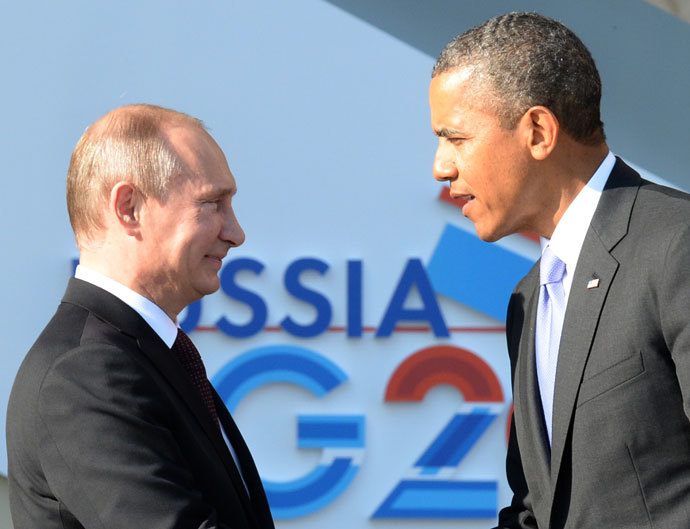
09:53 GMT: Iran now has strong proof of terrorists using chemical weapons in August's attack, the country's deputy foreign minister said in Moscow today.
"As far as chemical weapons use by terrorist groups is
concerned, we, together with Russia, have strong proof... some
of it is obvious. For example, in December of last year we
received information that two capsules containing sarin gas are
being transported inside Syria by terrorists."
09:49 GMT: Despite news that France is on-board with the decision to place Syria's chemical arsenal under international control, Foreign Minister Laurent Fabius said at a press conference on Tuesday that this does not exclude the possibility of a military strike on the country, RIA Novosti says.
"Following Russia's lead, we saw our determination to act
supplemented by a new path. We will follow this path, but we do
not wish for it to become an evasive maneuver. Therefore, all
options remain on the table."
09:35 GMT: Tehran says it is certain that the Syrian
regime has not participated in August's chemical attack. This
comes from Iran's Deputy Foreign Minister, Hosseyn Amir
Abdollahian's statement in Moscow.
"We believe the Syrian government has not used chemical
weapons [and that] Damascus will give the utmost consideration
to any political decision," the Deputy FM said.
09:30 GMT: Russian Foreign Minister Sergey Lavrov has announced that Russia, together with Syria, is working on a concrete plan for putting its chemical arsenal under control.

09:25 GMT: According to AFP, France is to propose its
own Syria resolution at the UN Security Council on Tuesday.
09:20 GMT: China promises to back Russia’s proposal for
Syria to hand over its chemical weapons arsenal over for
international control – Reuters reports.
GMT 07:50: Members of a UN human rights conference in Geneva were presented accounts of international experts, Syrian public figures and Russian news reporters covering the Syrian conflict, which back Russia’s opposition to the US plans for a military intervention in Syria, the Russian Foreign Ministry reports.
The speakers argued that the suspected sarin gas attack near Damascus on August 21 was likely a provocation of the rebel forces and that a military action against the President Bashar Assad government will likely result in civilian casualties and a humanitarian catastrophe affecting the entire region.
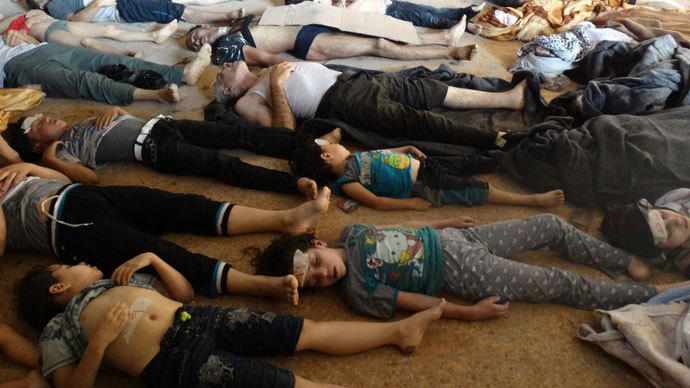
Evidence for the Russian case, including numerous eyewitness reports and results of investigations of the chemical weapon incident by activists, were handed over to a UN commission of experts probing the Syrian crisis, the ministry said.
Monday, September 9
23:14 GMT: Hardline Republican Senator John McCain said
the US should get on board with Russia’s proposal for Syria to
hand over control of its chemical weapons to the international
community.
“If there is an international [agreement], if you have the
guidelines, the requirements, the reporting, the dates— all of
that guided by a very detailed resolution to the UN Security
Council, I think that you can’t say no to it even though I’m
very dubious that this is a real proposal,” McCain told
Time magazine. “I think it’s just a stalling tactic but to
reject it out of hand is obviously not something that you can
do.”
22:19 GMT: President Obama said he is willing to “absolutely” put on pause the limited strike option on Syria if President Bashar Assad accepts Russia’s proposal to hand over control of the country’s chemical weapons to the international community.
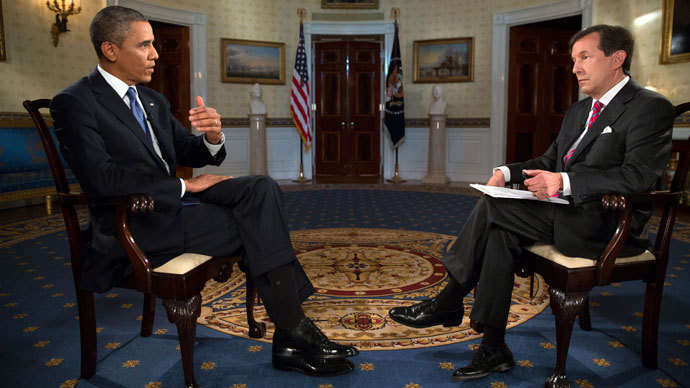
"Let's see if we can come up with language that avoids a
strike but accomplishes our key goals to make sure that these
chemical weapons are not used," the US president said
during an ABC News interview with Diane Sawyer – one of many he
gave on Monday.
Meanwhile, Senate Majority Leader Harry Reid announced that a
test vote on a resolution to strike Syria will be postponed.
20:50 GMT: American public opinion is mounting against
US military strikes against Syria, according to a new poll by
Pew Research and USA Today.
In the past week, Pew has found in its surveys the contingent
of those polled that are opposed to missile strikes has gone up
15 percent in a week to 63 percent. The number who favor action
in Syria has basically held consistent in that time period at
28 percent, from 29 percent last week. The number of undecideds
on the matter has gone down to 9 percent from 23 percent.
Seventy percent of self-identified Republicans, 66 percent of
independents and 53 percent of Democrats are against US
aggression in Syria. The number of those opposed to strikes has
gone up among all three political identities.
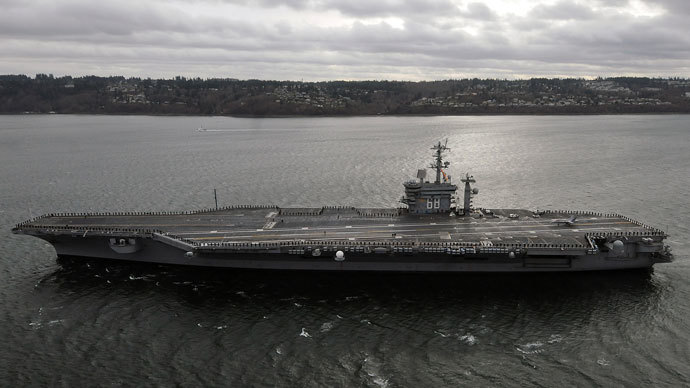
The new poll was conducted Sept. 4-8, among 1,506 adults
nationwide.
19:52 GMT: Chemical weapons being handed over under
international control is “worthy of close scrutiny” but
acceptable “under at least three conditions," French
Foreign Minister Laurent Fabius said in a statement. The
conditions include a quick handover of control over the weapons
and permission to further destroy them. He also said the
operation should only take place after a UN Security Council
resolution. Fabius added that Assad will face consequences if
he fails to comply.
19:48 GMT: In response to Russia’s proposal, Syria's top rebel commander has accused President Bashar Assad's regime and Moscow of deceit.
"We call for strikes and we warn the international community
that this [Assad] regime tells lies, and the liar [Russian
President Vladimir] Putin is its teacher. Putin is the biggest
liar," Free Syrian Army chief Selim Idriss told Al Jazeera.
"The regime wants to buy time to save itself," Idriss
added. He also warned “decision makers” against falling
into Assad’s “trap of deceit and dishonesty.”
18:44 GMT: Former US Secretary of State Hillary Clinton said she is taking Russia’s proposal to Syria very seriously, adding that a Syrian chemical arms handover would be an “important” step.
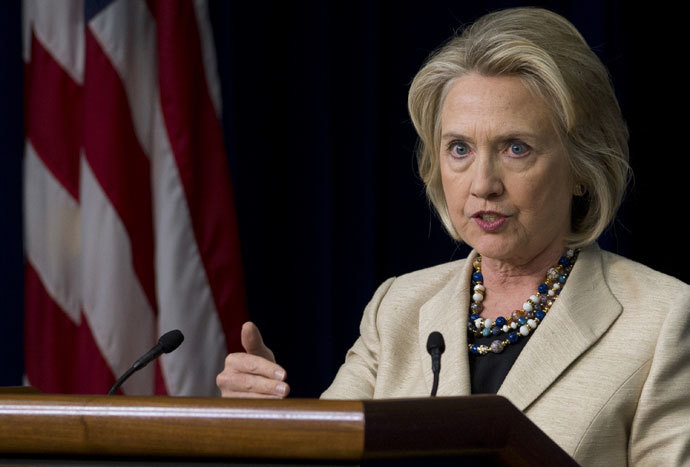
"This is about protecting the Syrian people... and our friends in the regions... If the regime immediately surrendered its stockpiles to international control... that would be an important step. But this cannot be another excuse for delay or obstruction,” she said.
However, Clinton then said that she supports President Barack
Obama's attempts to seek military action against Syria and
called on Congress to approve it.
18:41 GMT: The US Senate has set a procedural vote to
take place on Wednesday on whether to authorize President
Barack Obama to use "limited military action" against
Syria.
17:59 GMT: Deputy National Security Adviser Tony Blinken
echoed Harf's statement indicating that the US will take a
"hard look" at the Russian proposal.
“We haven't had a chance to look at it yet, we haven't had a
chance to talk to the Russians about it,” he said. “We
would welcome Assad giving up his chemical weapons...that's the
whole unfortunately the track record to date...doesn't give you
a lot of confidence...that said we want to look hard at what
the Russians have proposed.”
17:54 GMT: State Department spokeswoman Marie Harf said
the US has "serious and deep skepticism” about the
statements from Russia and Syria.
"If we see any indication that this latest statement has any merit, the US will look at it," Harf said. But "everything we have seen from the Assad regime points in the opposite direction."
"We'll have to take a hard look at the Russian statement ...
so we understand exactly what the Russians are proposing
here," State Department spokeswoman said. "Clearly we
have some serious skepticism."
17:46 GMT: A new poll conducted by AP, September 6-8,
shows that a majority of Americans oppose a US strike on Syria.
Most of those who took part in the survey said they are sure
that even a limited attack that President Obama is seeking
approval for will drag the US into a long-term commitment of
military force in Syria.
At the same time, some 20 percent of respondents said they
believe that US military involvement would prevent other
countries from using their own weapons of mass destruction in
the future.
17:44 GMT: Cyprus said it will not take part in any kind
of strike on Syria, if it comes to that.
"It's clear that in no case will it become a launch pad of military operations, or a target of attacks," Cypriot government spokesman Christos Stylianides said.
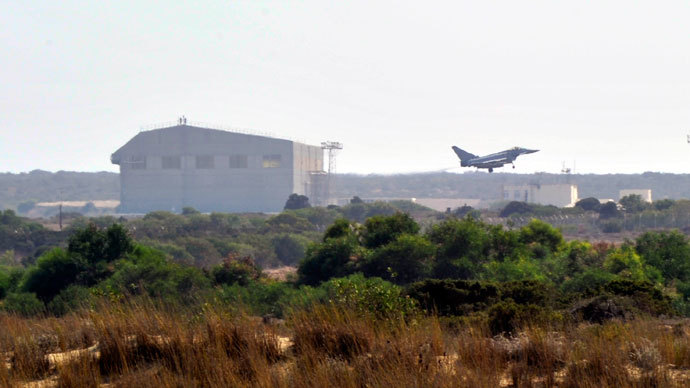
At the same time, Nicosia would be ready to offer assistance to
third-country nationals evacuated from the Middle East as a
significant number of countries asked Cyprus to host its
nationals and offer humanitarian aid if necessary.
17:12 GMT: Fourteen more countries, including the United
Arab Emirates, Qatar and Kosovo, which is not universally
recognized as an independent state, have backed a statement
condemning the Assad regime for an alleged chemical weapons
attack on August 21 and called for a strong international
response to bring the Syrian government to account, the White
House said.
In total, 25 countries are now supporting the statement as the
US is seeking an international coalition for military strikes
against Syria.
15:43 GMT: Damascus welcomed Russia’s initiative, “based on the Syrian’s government care about the lives of our people and security of our country,” Syrian Foreign Minister Walid al-Muallem said.
14:16 GMT: Russia has urged Syria to put its chemical weapons under international control for subsequent destruction to avert a possible military strike.
“We are calling on the Syrian authorities not only agree on putting chemical weapons storages under international control, but also for its further destruction and then joining the Organization for the Prohibition of Chemical Weapons,” Lavrov said. “We have passed our offer to [Syrian Foreign Minister] Walid al-Muallem and hope to receive a fast and positive answer.”
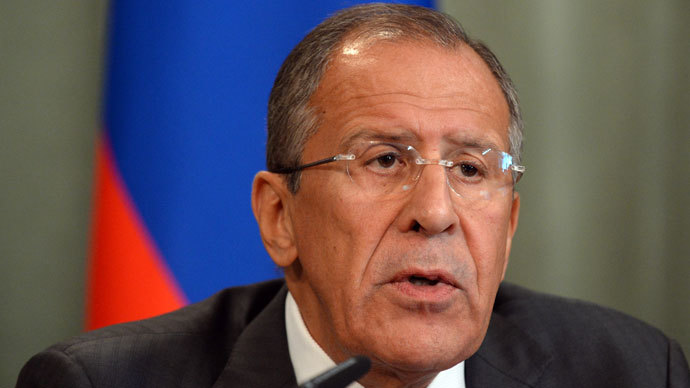
12:27 GMT: Freed after being kidnapped in Syria, Belgian
teacher and writer, Pierre Piccinin da Prata, has said that the
Syrian regime did not use chemical weapons. “This is my
moral duty to tell [sic] about this,” he said in an
interview with the RTL-TV channel. “This is not Assad’s
government who used sarin gas or any other combat gas in [the]
Damascus area. We are sure about this after we accidently heard
a conversation between rebels.”
12:08 GMT: US Secretary of State John Kerry has said
that the Syrian President “could turn over every single bit
of his chemical weapons to the international community” to
avoid a military strike on the country.
Following Kerry’s statement, a US State Department spokeswoman
clarified that “Secretary Kerry was making a rhetorical
argument about the impossibility and unlikelihood of Assad
turning over chemical weapons”.
"His (Kerry's) point was that this brutal dictator with a history of playing fast and loose with the facts cannot be trusted to turn over chemical weapons, otherwise he would have done so long ago. That's why the world faces this moment," the spokeswoman said.
09:10 GMT: During a media briefing in London with US Secretary of State John Kerry, the UK Foreign Secretary William Hague said that the UK and the US will continue working with all sides, including Russia, to overcome the crisis in Syria.

Hague also noted that UK's objectives and efforts on solving Syria conflict remain "closely aligned" with US.
Sunday, September 8
17:35 GMT: Israel has deployed its Iron Dome defense
shield west of Jerusalem, AFP reports. A military spokeswoman
declined to comment on the move, saying only that "defense
systems are deployed in accordance with situation
assessments."
17:01 GMT: Russia has evacuated 70 more people from
Syria, the Emergencies Ministry told RIA Novosti news agency.
The plane, which supposedly departed from Latakia, had Russian
nationals and other CIS citizens on board.
16:58 GMT: German intelligence has concluded that
Bashar Assad may not be personally behind the chemical attack
on Damascus’s outskirts, Bild am Sonntag newspaper reported.
Intercepted radio messages reportedly revealed that Syrian
commanders had been asking the country’s leader to allow them
to use chemical weapons for the last four-and-a-half months.
Based on the messages, German intelligence believes the attack
might have been initiated at a lower level than the
presidential palace.
16:19 GMT: President Barack Obama's address to the
nation on the Syrian crisis is scheduled for 9:00pm EST Tuesday
evening (01:00am GMT Wednesday morning).
14:58 GMT: Syrian President Assad has talked to the American media for the first time in two years. CBS’ Charlie Rose spoke to the President; however, the full interview will only be available on Monday on the Face the Nation TV-show.
Syrian president Bashar al-Assad denied to CBS being behind chemical attack.
BREAKING: #Syria@charlierose interviewed Pres. Assad he would not confirm or deny that the regime has chemical weapons #ftn
— Face The Nation (@FaceTheNation) September 8, 2013
14:11GMT: Both the soldiers of President Bashar Assad
and the rebels troops agree that the expected US-led strikes
against Syria won’t change the situation in the country, ITV
News international editor, Bill Neely, wrote in his article for
the Guardian paper.
"The Americans can shoot their missiles but they'll get
nowhere. Our real enemy is over there, on the ground –
Al-Qaeda!" a veteran governmental soldier said.
“How can it be that America is going to fight us, on the side
of Al-Qaeda?” a young Syrian army commander wondered.
“How can America be against a secular country and for
Islamists, who kill their prisoners and dump their bodies in a
well?"
While one of the rebels stressed that “the Americans will
scratch the surface, hit 5 per cent of the regime's power and
save face. That won't save us from another attack.”

13:28 GMT: The British people oppose any military attack
on Syria even if they were presented with undeniable evidence
that the government of Syrian president Bashar Assad used sarin
gas against its own citizens, an IMC Research opinion poll for
the Sunday Telegraph revealed.
A large proportion of voters (46 per cent) said they wouldn’t
want the country’s MPs to stage a second Commons vote on
joining the US-led military operation in Syria, if UN weapons
inspectors confirm that the August 21 attack involved chemical
weapons.
The poll also revealed that 47 per cent believe that the
British role in the Syrian crisis should be limited to
“providing aid to refugees,” with only 19 per cent
speaking up for military involvement.
13:24 GMT: With tensions mounting in the Middle East and
the number of Syrian refugees reaching 2 million, UNICEF
continues to provide urgent life-saving supplies to children
inside Syria and in Jordan, Lebanon, Turkey, Iraq and Egypt,
the organization’s press release said.
Syria is one of @UNICEF's largest humanitarian operations ever -- relief efforts continue: http://t.co/ccfRT2QAus #childrenofsyria
— United Nations (@UN) September 8, 2013
12:45 GMT: The US authorities have supplied the Japanese
government with evidence aimed at convincing the country’s
cabinet that forces of Syrian president, Bashar Assad, used
chemical weapons near Damascus on August 21.
The source in the government has confirmed to Kyodo news agency
that the materials were received, but didn’t disclose the
specific content of the evidence.
12:28 GMT: A Russian Emergencies Ministry plane has arrived
in the Syrian port city of Latakia to pick up Russians and CIS
citizens wanting to leave the country in anticipation of the US
strikes, RIA-Novosti news agency reports.
A team of rescuers and psychologists is onboard to assist the passengers during the flight. Emergencies Ministry spokeswoman, Irina Rossius said.
All the people, who desire to leave, are already in the Latakia airport, with their numbers currently being determined.

12:11 GMT: The spread of chemical arms is “a bigger issue than Syria,” Britain’s Foreign Secretary William Hague said, calling for a tough response to the alleged use of poison gas in the Middle Eastern country.
"I do believe very strongly that the world must stand up against the use of chemical weapons,” he told the BBC. “The risks of not doing so in my view are greater than the risks of doing so. Allowing the spread of use of chemical weapons in the 21st century is an evil that we have to stand up to, one way or another.”
US Secretary of State, John Kerry, is to arrive in London on Sunday for talks with Hague as part of his European tour to gain support for the strikes against the targets of Bashar Assad’s government.
The British parliament has rejected joining the US-led military operation in Syria, with the Foreign Secretary saying that, despite him fully backing the American plan, the government is “not planning” another vote on the issue “unless the circumstances change dramatically.”
11:47 GMT: The Brazilian state and its citizens will
always support the Syrian people, Brazil's defense minister
Humberto De Azevedo Viana Filho said on his visit to Istanbul,
adding that his country stands for a peaceful solution to the
crisis.
“Brazil is always on the side of dialogue as a solution to
the problems,” the minister is cited as saying by Turkey’s
Anadolu news agency. “However, our country is definitely
against the use of chemical weapons, which is accepted as an
international crime in Brazil. From the very beginning, we have
had a clear stance towards such countries as Syria which has
killed its own people.”
08:58 GMT: Turkey spotted "movements" on the Syrian-Turkish border. Turkish jets have been put on standby in case there are any borer violations, IHA reports.
Turkey spotted "movements" on the Syrian-Turkish border and Turkish jets are ordered to hit in case of border violation, IHA reports.
— Mahir Zeynalov (@MahirZeynalov) September 8, 2013
The Turkish Sabah newspaper added that the jets "have the permission to open fire in case of hostile movement". Earlier, a loud explosion was heard on the border.
GMT 03:40 RT’s Maria Finoshina and her crew were caught in the crossfire between Islamists and Syrian army as they fought for the symbolically important village of Maaloula, the oldest Christian community in Syria.
The journalists were allowed to enter the village just after governmental forces pushed the jihadists to its outskirts, even though their safety was far from guaranteed with Al-Nusra Front snipers suspected to be hiding in the neighborhood and mortar teams holding vantage points in the mountings nearby.
Just a few minutes later the crew had to withdraw as bullets began flying and blasts were heard nearby. Hours later the rebels, who reportedly received reinforcements overnight, managed to retake Maaloula.
01:44 GMT: The US Senate Intelligence Committee has released a compilation of 13 videos presented to the committee as proof of the alleged chemical attack in a Damascus suburb on August 21.
The committee said in a statement: “Each of these 13 videos explicitly claim to show victims of a chemical or poison gas attack. At the request of Chairman Feinstein, these videos were selected by the Open Source Center to depict a representative range of YouTube content posted regarding the reported 21 August chemical weapons (CW) attacks in the suburbs of Damascus, Syria. All of the videos were posted on YouTube by pro-Syrian opposition users. With one exception, all 13 videos were posted by a pro-opposition Internet news channel that consistently posts user-created videos concerning the Syrian conflict. The news channel does not primarily generate content, but instead re-posts content originally posted by others.”
Saturday, September 7
19:48 GMT: Over 200 protesters have gathered at the
White House before marching to Capitol Hill in a
demonstration opposing possible US military strikes against
Syria.
The protest is one of several planned rallies taking place in
cities across America. A larger demonstration is scheduled to
take place in Washington on Monday.
"Congressional officials report that by a margin of 100 to
one, people are telling the elected representatives from
their district that they should vote ‘no’ on the war
resolution," Sarah Sloan of the ANSWER Coalition, which
organized the protest, said in a statement. "Because of
the deep split inside the political establishment, what the
people do can make a huge difference."
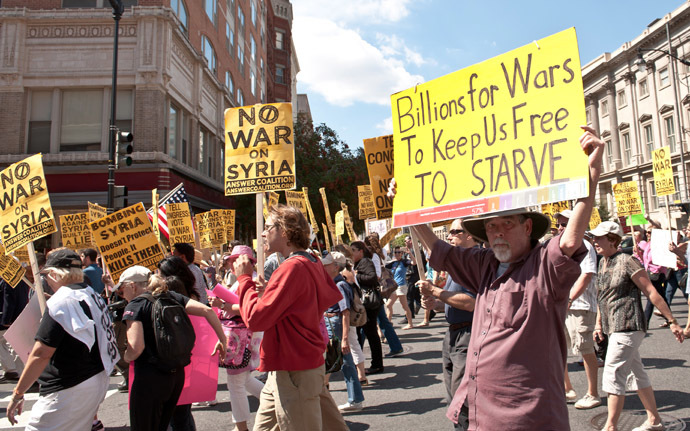
19:34 GMT: The US has no plans to evacuate all of its
employees from Beirut, Lebanon ahead of a possible military
strike against Syria, Secretary of State John Kerry said.
"The Syrian crisis does affect Lebanon. But we do not want
it to spill over in the region,” Kerry said after a
meeting with French Foreign Minister Laurent Fabius.
Kerry acknowledged, however, that that the number of American
employees in Lebanon has been reduced “for security
reasons.”
18:01 GMT: Hundreds of pilgrims have arrived in St
Peter's Square in the Vatican to join Pope Francis in prayer
for Syria. The head of the Catholic Church has invited people
of all faiths to join in a day of fasting and prayer to call
for an end to the Syrian conflict.
During this week’s G20 summit, the Pope called on world
leaders to seek peace in Syria through diplomatic means and
to lay aside the “futile pursuit” of a military
solution.
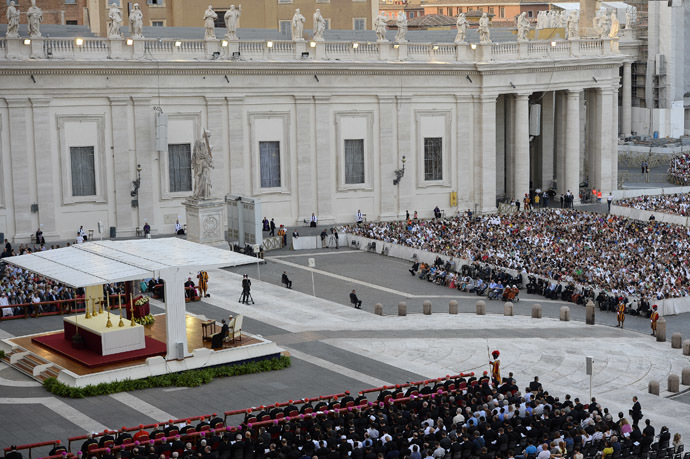
17:50 GMT: US President Barack Obama has made no
decisions about waiting for a UN weapons inspectors' report
on chemical arms used in Syria, and he is keeping all of his
options open, US Secretary of State John Kerry said after
meeting with French Foreign Minister Laurent Fabius.
17:40 GMT: French Foreign Minister Laurent Fabius
believes a military strike against Syria is the key to a
political solution to the country’s conflict.
Fabius added that all the members of the UN Security Council
should denounce the Syrian government and support the use of
force.
The statement came after the French FM’s meeting with US
Secretary of State John Kerry, who agreed with his
counterpart, adding that “[Syrian President Bashar] Assad
must be punished.”
17:17 GMT: A rally against the expected US-led military
operation in Syria is continuing for a second day in front of
the American Embassy in al-Metn's Awkar neighborhood, east of
the Lebanese capital of Beirut.
"Syria, the land of Arabism and resilience, is in danger.
But the country does not want protection as it safeguarded
Arabs for a long time. It needs Arabs to stand by its side
instead of calling on foreign countries to destroy it,”
Naharnet quoted activist Ali Taleb as saying.
“The American Spring will not be achieved through
Damascus, and certainly not through Beirut,” he said.
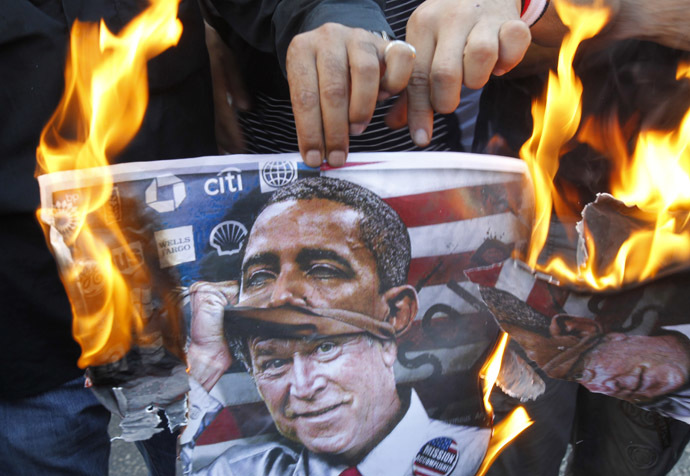
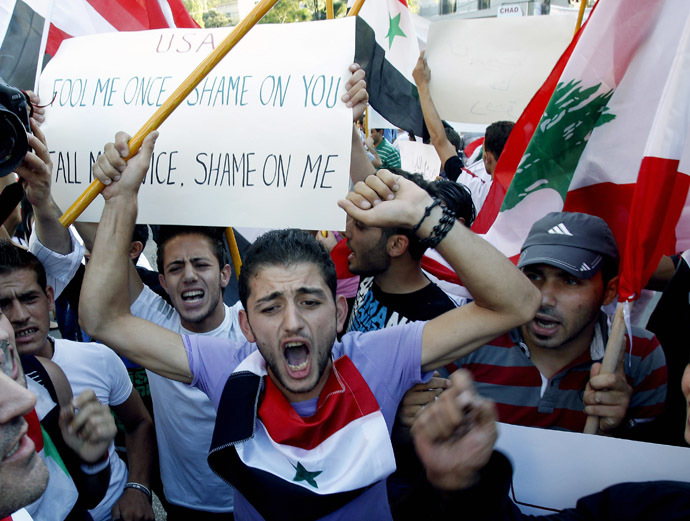
14:31 GMT: Lebanese authorities have intensified
security measures across the country “in the wake of
tensions in the Middle East and possible U.S. military action
against Syria for its alleged use of chemical weapons,”
the Lebanese Higher Defense Council told Al Arabiya.
11:44 GMT: The European Union's Catherin Ashton claims
that available information is enough to constitute strong
evidence of the Syrian regime's responsibility for Augusts'
chemical attack.
11:20 GMT: President Obama said that a small military
force may be needed in Syria after all, to deter future
chemical weapons attacks – according to Reuters. Although he
said on his weekly radio and internet address that a
protracted conflict like “Iraq or Afghanistan” is not
something he wants.
11:18 GMT: German Foreign Minister Guido Westerwelle has said he will join the G20 declaration calling for military action against the Syrian regime. "After we saw this excellent and very wise position of the European Union, the (German) Chancellor (Angela Merkel) and myself decided that we support now the G20 statement."
11:15 GMT: According to a survey carried out by the
French newspaper Figaro, two-thirds of the French (68
percent) are against international military action on Syria,
regardless of what their government chooses to do.
02:52 GMT: As Congress debates Syria military strikes, the US has issued travel warnings to Americans for Lebanon and southeastern Turkey based on possible violence in those countries bordering Syria, the US State Department announced Friday. In addition, the U.S. has also ordered its diplomats to leave both countries as a precautionary measure.
“Security of our people
and our facilities in the region is of utmost concern to
everyone here,” State Dept. spokeswoman Marie Harf said,
adding that she was not aware of any specific
threats.
Friday, September 6
20:51 GMT: The UN has drawn up emergency plans for a military strike on Syria, but at the same time will continue to deliver aid to the region, UN humanitarian chief Valerie Amos said after her trip to Damascus, AFP reported.
"We continue to update and look at our contingency planning," Amos stated, noting that the UN has great concern for its staff on the ground and still has “a commitment to continue our humanitarian operations.”
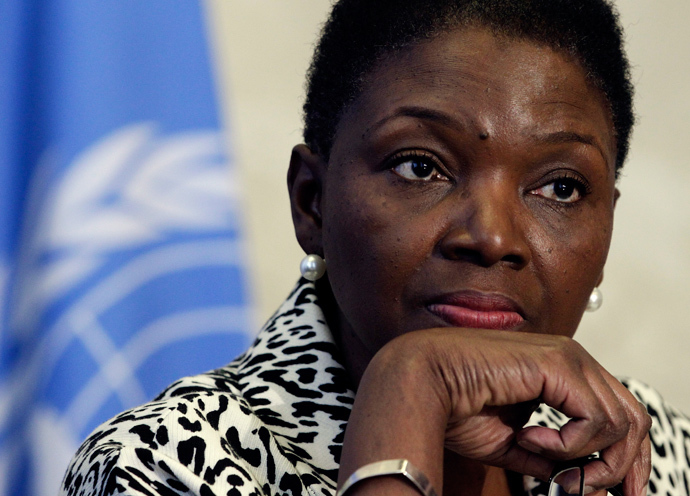
20:35 GMT: US Deputy National Security Adviser Tony Blinken, an aide close to President Obama, told NPR Friday that military action in Syria is unlikely without congressional approval. Blinken asserted that “the president has the authority to act” if Congress votes down the proposal next week, but “it’s neither his desire nor intention to use that authority absent Congress backing him.”
18:55 GMT: Syrian President Bashar Assad barely
used any of his chemical weapons stockpile in the alleged
attack near Damascus on August 21, according to the US
Ambassador to the United Nations.
"We have exhausted the alternatives" to military action, she said, adding that Assad counted on Russia’s support.
17:23 GMT: Friday, September 6th, a
so-called Tweet storm rages on the popular networking service
for awareness on #OpSyria911. Organizers of the storm,
Anonymous hacktivist group, urged opponents of a military
intervention to “call, fax, email, and write a letter to
your representatives and voice your disdain for any military
actions intruded on the Syrian people.”
15:59 GMT: The Leaders and Representatives of
Australia, Canada, France, Italy, Japan, Republic of Korea,
Saudi Arabia, Spain, Turkey, the United Kingdom and the
United States of America issued a joint statement on the
sidelines of the Group of 20 Nations Leader’s Meeting in
Saint Petersburg, Russia regarding the crisis in Syria.
“The international norm against the use of chemical weapons
is longstanding and universal. The use of chemical
weapons anywhere diminishes the security of people
everywhere. Left unchallenged, it increases the risk of
further use and proliferation of these weapons,” the
joint statement issued by the White House read.
“We condemn in the strongest terms the horrific chemical
weapons attack in the suburbs of Damascus on August 21st that
claimed the lives of so many men, women, and children.
The evidence clearly points to the Syrian government being
responsible for the attack, which is part of a pattern of
chemical weapons use by the regime.
We call for a strong international response to this grave
violation of the world’s rules and conscience that will send
a clear message that this kind of atrocity can never be
repeated. Those who perpetrated these crimes must be held
accountable.”

The statement went on the show its support for a UN Security Council resolution, but “recognized” the Council had remained paralyzed for two years.
The statement further condemned “in the strongest terms” human rights violations in Syria on all sides.
15:52 GMT: France says that any military action against Syria would only entail military targets so as to avoid civilian casualties. President Francois Hollande said all G20 states has condemned the use of chemical weapons and agreed they were deployed in Syria. He further warned that if the UN Security Council could not agree on a response to the attack, a coalition must be created to respond. He did say, however, that France would wait on conclusions from UN inspectors investigating the August 21 attack in a Damascus suburb before deciding to act.
"We shall await the report of the inspectors just as we will await (US) Congress," he told a news conference after a summit of G20 nations in St. Petersburg, in reference to US President Barack Obama's decision to ask for Congressional approval before launching a strike.
15:38 GMT: Turkish Prime Minister Tayyip Erdogan said on Friday almost all of the leaders at the G20 summit in St. Petersburg accepted that an operation needed to be carried out against Syria in response to an alleged chemical weapons attack in a Damascus Suburb on August 21.
"Almost all the leaders who have attended the summit are closely following the massacre the Syrian regime carried out on its people and the leaders have expressed that an operation is extremely necessary against Damascus," Reuters cites Erdogan as saying.
15:20 GMT: The Russian Foreign Ministry has asked the world to consider claims made by Mother Agnes Mariam el-Salib – mother superior of St. James Monastery in Qara, Syria – who told RT there is proof the footage of the alleged chemical attack in Syria was fabricated.
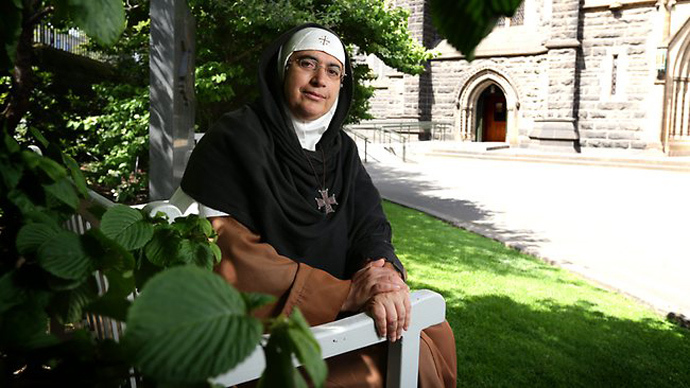
“I maintain that the whole affair was a frame-up. It had
been staged and prepared in advance with the goal of framing
the Syrian government as the perpetrator,” she said.
“The key evidence is that Reuters made these files public
at 6.05 in the morning. The chemical attack is said to have
been launched between 3 and 5 o’clock in the morning in Guta.
How is it even possible to collect a dozen different pieces
of footage, get more than 200 kids and 300 young people
together in one place, give them first aid and interview them
on camera, and all that in less than three hours? Is that
realistic at all? As someone who works in the news industry,
you know how long all of it would take.”
15:15: GMT: US President Barack Obama refused to say directly what he would do if Congress doesn't approve Syria strikes when asked the question at the press conference during the G20 summit.
However he said that “given Security Council paralysis on
this issue, if we are serious about upholding a ban on
chemical weapons use, then an international response is
required, and that will not come through Security Council
action.”
15:07 GMT: The alleged chemical weapons attack in
Syria was “carried out by rebels as a provocation” to
create the possibility for a foreign intervention, Russian
President Vladimir Putin told reporters at a press conference
during the final day of the G20 summit.
While Russia, China, India, Indonesia, Argentina, Brazil, South Africa and Italy are among the major world’s economies which oppose the intervention, only Turkey, Canada, Saudi Arabia and France join the US in its call for military action in the war-torn country, adding that the UK Prime Minister’s position was not supported by his citizens.
In case of intervention, Putin stressed that Russia will help
Syria as “we are already helping, we send arms, we
cooperate in the economic sphere, we hope to expand our
cooperation in the humanitarian sphere, which includes
sending humanitarian aid to support those people – the
civilians – who have found themselves in a very dire
situation in this country.”
13:54 GMT: The discussion of the Syrian issue at the G20 summit in St Petersburg has not decreased the possibility of a military operation against the republic, says British Prime Minister David Cameron. He said that although the talks were very helpful, the summit was never about making a decision on the matter.

If the United Nations Security Council fails to agree on a resolution authorizing military intervention in the Syrian conflict, action without its approval can’t be ruled out either, Cameron said.
The UK, along with several other members of the group, agreed to seek free access for humanitarian aid to Syria through the UN, he told a media conference at the end of the gathering.
13:42 GMT: Russia President Vladimir Putin and US
leader Barack Obama have discussed Syrian crisis on the
sidelines of G20 summit in St Petersburg, says Russian
presidential aid Yuri Ushakov. However, “there remains a
difference in opinions” following the meeting, Ushakov said.
Putin and Obama have agreed to continue discussing the
settlement for the Syrian crisis on the level of their
foreign ministers.
13:03 GMT: A military strike on Syria will put an end to all the efforts made by the UN-Arab League envoy on Syria, Lakhdar Brahimi, to politically resolve the conflict, agreed the participates of the G20 summit breakfast meeting, said Russian Foreign Minister Sergey Lavrov.
"I cannot say that this was the prevailing opinion, but many responsible states are coming to a very clear understanding that the use of force, bypassing the UN Security Council, will put an end to all efforts for a political resolution and carrying out the Geneva-2 peace conference made by Lakhdar Brahimi," Lavrov said.
"Our common conclusion is to do everything possible to
prevent the military scenario in Syria," Lavrov added.
"There is still time for this."
The US did not participate, while Canada, Kazakhstan, South
Korea, Senegal, Mexico, Brazil, Germany, Turkey, France and
Russia were present at the meeting.
12:40 GMT: The Turkish Prime Minster Tayyip Erdogan has said that almost all leaders at the G20 summit in St Petersburg accept the need for a military operation against Syria.

12:00 GMT: The U.S. has ordered its diplomats to leave
Lebanon as Congress debates Syria military strikes, in a move
that will be interpreted that the possibility of a military
strikes has moved a step closer.
The US State Department has ordered nonessential U.S.
diplomats and family members to leave Lebanon due to security
concerns. They have also urged US citizens to avoid all
travel to Lebanon because of current safety and security
concerns.
"The Department of State drew down non-emergency personnel
and family members from Embassy Beirut due to threats to U.S.
Mission facilities and personnel," a statement on the
Beirut embassy's website said.
11:55 GMT: The Geneva II peace conference is under
threat in the current situation, said UN-Arab League envoy on
Syria Lakhdar Brahimi during the G20 summit held in St.
Petersburg, Russia.
11:50 GMT: The Syrian government has announced that it
is offering a bounty to anyone who captures a "non-Syrian
terrorist", or helps to apprehend one, state television
said. A bounty of 500,000 Syrian pounds (roughly $4,000) will
be offered for capture, while 200,000 Syrian pounds (about
$1,500) goes to anyone who gives information regarding
terrorist locations.
The statement said the identities of those who provided
information would be kept secret and their "protection
ensured". Concerning Syrian rebels who informed on their
comrades, state television added, that they would be granted
amnesty and “their affairs will be settled.”
11:29 GMT: Moscow has warned Washington against staging attacks on Syria’s chemical weapons depots.
"With particular concern, we perceive the fact that among
possible targets for attacks are objects of military
infrastructure securing the safety of Syrian chemical weapons
arsenals,” according to a statement in the comment of the
Department of Information and Media relations of the Russian
Foreign Ministry, issued on Friday.
“In this regard, we would like to warn the US government and its allies from inflicting any assaults on chemical facilities and adjacent territories,” the document says.
11:22 GMT: The crisis in Syria should be resolved through political means and not a military strike, Chinese President Xi Jinping told his US counterpart Barack Obama during the G20 summit in St. Petersburg in Russia.

"A political solution is the only right way out for the
Syrian crisis, and a military strike cannot solve the problem
from the root," Xinhua news agency quoted Xi as saying. "We
expect certain countries to have a second thought before
action," he added.
10:50 GMT: The UN nuclear watchdog has confirmed
receipt of a request from Russia to estimate the impact if a
missile were to hit a small Syrian reactor that contains
radioactive uranium.
"I can confirm that the IAEA has received a formal request
from the Russian Federation. The agency is considering the
questions raised," IAEA spokeswoman Gill Tudor said in an
email to Reuters.
A military strike on Syria could have catastrophic effects if
the research reactor near Damascus was struck "by design
or by chance," Russia said in a statement earlier this
week.
10:32 GMT: British scientists found traces of sarin
gas in soil and fabric samples collected in Syria, the UK
Ministry of Defence has confirmed earlier reports, BBC
states.
9:43 GMT: EU defense ministers have agreed that
embattled Syrian President Bashar Assad used chemical weapons
in an attack in a Damascus suburb on August 21, reports AFP.
Meanwhile, US President Barack Obama told G20 leaders in St.
Petersburg that the US was “confident” Assad’s forces had
used chemical weapons. Obama urged the G20 leaders to support
the international ban on chemical weapons and authorize the
use of military force against Syria.
7:55 GMT: A Russian parliamentary delegation will not
travel to Washington to meet with Congress to discuss Syria,
announced Russian lawmaker and State Duma representative,
Sergey Naryshkin.
03:48 GMT: US President Barack Obama instructed the Pentagon to expand the list of potential Syria targets as a reaction to new intelligence that Syrian President Bashar Assad has been moving troops and chemical weapons equipment, military officials told the The New York Times. This means that the original list of at least 50 major sites will be further expanded.

03:20 GMT: The US State Department responded to Russian President Vladimir Putin’s remarks that US Secretary of State John Kerry “lied” about the influence of Al-Qaeda in Syria, saying that it is “preposterous” and a mischaracterization of what America’s top diplomat actually said.
Kerry is “not losing sleep after such a preposterous comment that was based on an inaccurate quote and was completely mischaracterized,” State Department spokeswoman Jen Psaki told reporters in Washington.
Putin made his remarks on Wednesday, reportedly referring to
the Secretary of State’s testimony before the US Senate
Foreign Relations Committee a day earlier, where Kerry said
that Al-Qaeda’s presence within the Syrian opposition has not
been increasing.
02:00 GMT: US Navy destroyers in the Mediterranean are “fully ready” to launch cruise missiles into Syria as part of a US military campaign that would not involve “extraordinary” monetary costs, a top admiral said Thursday.
Greenert, a chief naval operations officer who focuses on preparedness of Navy forces, also seemed to confirm the rough estimate made by US Defense Secretary Chuck Hagel on Wednesday in front of the House Foreign Affairs Committee, when he told Congress that a US campaign in Syria would likely cost "tens of millions" of dollars.
"The numbers are nagging but they're not extraordinary at this point," Greenert said at an event held by the conservative think-tank American Enterprise Institute, though defense budget analysts say Hagel's figure is a low estimate.
Thursday, September 5
23:50 GMT: Pope Francis called on world leaders attending the G20 summit in Russia to seek peace in Syria through diplomatic means, laying aside the “futile pursuit” of a military solution.
In a letter to Russian
President Vladimir Putin, who is hosting the G20 summit,
Francis said that lopsided global interests have blocked a
diplomatic course in the Syrian conflict and have led to the
“senseless massacre” of innocent people.
“To the leaders present, to each and every one, I make a
heartfelt appeal for them to help find ways to overcome the
conflicting positions and to lay aside the futile pursuit of
a military solution,” Francis wrote.

21:00 GMT: US Ambassador to the United Nations Samantha Power said Thursday there is “no viable path forward” in the UN Security council on Syria, accusing Russian leaders of holding the council hostage to protect President Bashar al-Assad’s government.
“I was present in the meeting where the UK laid down the resolution, and everything in that meeting, in word and body language, suggests that that resolution has no prospect of being adopted, by Russia in particular,” Power said. “In the wake of the flagrant shattering of the international norm against chemical weapons use, Russia continues to hold the council hostage and shirk its responsibilities, including as a party to the chemical weapons convention.”
20:45 GMT: President Obama has forgone a trip to California, instead remaining in Washington, “to work on the Syrian resolution before Congress,” the White House has announced. Obama was scheduled to speak at the AFL-CIO’s quadrennial convention in Los Angeles and attend a party fundraiser which has been postponed.
The president departed Washington Tuesday night for a trip to Sweden before heading to the G20 summit in Russia. Obama will return to the US on Friday. Both chambers of Congress are scheduled to debate US military action in Syria on Monday.
20:24 GMT: US Senate Majority Leader Harry Reid said he is “guardedly optimistic” that the Senate will vote to authorize limited missile strikes against Syria, a Democratic aide said on Thursday, as cited by Reuters. The aide said the Senate will likely vote on President Obama’s use-of-force resolution on Wednesday, in an attempt to nullify an expected entanglement with Republicans.
Reid did not attend the meeting with Obama earlier this week in which Democrat and Republican leaders were briefed on the details of the Syrian conflict. Reid told reporters that he has been in daily contact with the president and “has all the information he needs.”
17:07 GMT: The UK has fresh evidence of use of
chemical weapons in the Syrian capital, Damascus, British
prime minister, David Cameron, told the BBC.
He said evidence of the Bashar Assad regime's use of chemical
weapons was “growing all the time” and UK scientists
were investigating the alleged attacks on 21 August.
"We have just been looking at some samples taken from
Damascus in the Porton Down laboratory in Britain which
further shows the use of chemical weapons in that Damascus
suburb," Cameron said.
The PM also denied claims he has “no hand to play”
over Syria after losing a vote on UK military action in
Syria, saying that Britain would lead calls for more action
on aid for refugees and push for fresh peace talks.
16:18 GMT: Moscow is puzzled by the Pentagon’s claims
that Russia has been shipping chemical weapons or the means
to develop them to the Syrian government of Bashar Assad, the
head of the Kremlin’s administration, Sergey Ivanov, said.
“I’ve heard this statement, spoken in diplomatic language,
I was very surprised and even shocked by it,” Ivanov is
cited as saying by the ITAR-TASS news agency.
The official added that no matter how Congress votes on the
use of force against Syria, the decision by the US lawmaker
still won’t be “legitimate”.
Ivanov also said that Russia has boosted its naval presence in the
Mediterranean Sea in order to evacuate Russian citizens
from Syria in case of an attack.
15:22 GMT: Leaders of the BRICS countries expressed their
concerns on Thursday that military action against Syria could
damage the world economy, a spokesman for the Russian
president said.
“It was noted within the BRICS dialogue that among factors that could negatively affect the global economic situation are the consequences of the eventual foreign intervention into Syrian affairs. Such consequences can have an extremely negative effect on global economy,” the spokesman said.
The BRICS association includes the emerging economies of
Russia, China, India, Brazil, and South Africa.
15:15 GMT: Russian Foreign Minister Sergey Lavrov is to hold talks with his Syrian counterpart Walid al-Moualem on September 9 in Moscow, according to Russian Foreign Ministry.
“In accordance with an agreement reached, Moscow will host talks between Russia’s Foreign minister, Sergey Lavrov, and Deputy Prime Minister and Minister of Foreign Affairs of the Syrian Arab Republic, Walid al-Moualem,” the Russian Ministry of Foreign Affairs said in a statement on its website.
The talks will focus on the comprehensive review of all aspects of the current conflict in Syria, according to the statement.
“In Moscow, we remain convinced of the need for a speedy
end to the violence and suffering of the civilian population
in Syria and the path of a political settlement without
external military intervention avoiding the UN Security
Council,” the ministry's statement said.
14:40 GMT: Russia is not blocking the work of the UN Security Council, but “calls for all its partners for objective assessment of the situation” concerning Syria, Russian President Vladimir Putin’s spokesman Dmitry Peskov said at the G20 briefing.
“Russia is attempting to call on its partners, including partners in Washington, for an objective assessment of the situation, without taking decisions before the official verdict of the UN experts working in Syria,” Peskov said.
Only after the UN experts announce their legitimate conclusion on if the chemical weapons were indeed used in Syria, “then it is necessary to sort out who was behind their use,” Peskov stressed.
“We cannot accept the evidence that, in our view, does not
represent any evidence, that is far from being
convincing,” Putin’s spokesman said.
13:33 GMT: Heavy clashes between Syrian government forces and militants of the Al-Qaida affiliated group, Jabhat al-Nusra (Al-Nusra Front), have been going on in the mountains surrounding the UNESCO-listed Christian village in western Syria after the insurgents attacked and held it overnight, AP reports, citing the UK-based Observatory for Human Rights.
Militants reportedly left the village of Maaloula early on
Thursday, with locals saying they saw them patrolling the
streets on foot and in vehicles at night, as well as
surrounding the village church and mosque. According to AP
speaking with witnesses over the phone, the villagers fear
the rebels will return.
12:34 GMT: Iran will support Syria “to the end” in the face of a possible US-led military strike, Iran’s elite Quds Force unit commander Qassem Soleimani has said.
“The aim of the United States is not to protect human rights ... but to destroy the front of resistance [against Israel],” Soleimani was quoted as saying by AFP citing local media.
“We will support Syria to the end,” he added in a speech to the Iranian Assembly of Experts, without elaborating.
However, Iran’s Defense Minister, Hossein Dehqan, ruled out sending troops or weapons to Syria.
“The Syrians do not need us to provide them with weapons
because they have a defensive anti-aircraft system
themselves,” Dehqan was quoted as saying.
12:20 GMT: The UN inspectors will not reveal the preliminary results of the probe into alleged chemical weapons use in Syria on August 21 near Damascus until the probe is completed, Martin Nesirky, a spokesman for UN Secretary General, has said.
“There will be no disclosure of the preliminary findings. There will only be final results after all the samples are analyzed,” Ban Ki-moon’s spokesman was quoted as saying by Interfax.
European Council President Herman van Rompuy said earlier on
Thursday he expected the UN Secretary General to share the
tentative findings of the UN chemical weapons inspectors on
the sidelines of the G20 summit.
11:48 GMT: The international community should focus on a political solution for the Syrian crisis, said the President of the European Commission, Jose Manuel Barroso.
“The European Union is certain that the efforts should be
aimed at a political settlement,” Barroso told reporters
at the G20 briefing.
11:39 GMT: Iran’s supreme leader, Ayatollah Ali Khamenei, slammed the US for using the alleged chemical weapons use as a “pretext” for intervention in Syria.
“In the case of Syria, the chemical attack is a pretext... The Americans try to play with words and pretend that they’ve become involved in this case for humanitarian aims,” Khamenei said, at a meeting of the Iranian Assembly of Experts.
Khamenei then warned the US would “suffer loss” in Syria, should they launch a military strike.
“I believe the Americans are making mistakes in Syria and
they have felt the impact and will certainly suffer
loss,” he said.
11:09 GMT: Seventy percent of Germans are against military intervention in Syria. However, 65 percent consider it a possibility, according to a survey ordered by the ZDF TV channel.
10:15 GMT: UN special envoy to Syria, Lakhdar Brahimi,
will push for an international conference to find a political
solution to the conflict in Syria during the G20
summit.
"While the world is focused on concerns about the possible use of chemical weapons in Syria we must push even harder for the International Conference on Syria to take place in Geneva," said Brahimi in a statement.
05:12 GMT: Russia has sent an official request to meet the US lawmakers with the aim of lobbying them on Syria. It’s after earlier speculations that Russia will send a delegation to Washington, DC.
02:52 GMT: While calling for reconciliation and denying his government used chemical weapons, Syrian Deputy Foreign Minister Faisal al-Mekdad told the Wall Street Journal if the US attacks Syria, Damascus would strike back not only at Israel, but also neighbors Jordan and Turkey if they participate in hostilities.
"Once the war starts nobody can control what will happen," he said. "We believe that any attack against Syria will definitely result in chaos in the entire region if not beyond."
He also said US strikes would strengthen rebel groups affiliated with Al-Qaeda rather than the moderate opposition forces the US has supported.
02:41 GMT: The Vatican will host a day of fasting and a four-hour prayer vigil Saturday in St. Peter’s Square in opposition to US military strikes in Syria, the AP reported. The Vatican has invited bishops’ conferences the world over to host local version of the vigil.
In recent speeches, tweets and remarks, Pope Francis has called for a negotiated settlement to the Syrian conflict while condemning use of chemical weapons. “War never again! Never again war!” he tweeted earlier this week.
With utmost firmness I condemn the use of chemical weapons.
— Pope Francis (@Pontifex) September 3, 2013
Wednesday, September 4
23:58 GMT: Russian lawmakers have announced plans to meet with US congressional leaders to discuss Syria, according to CNN. Previous reports speculated that Russia would send a delegation to Washington but it is not clear whether they will arrive before Monday, when the Senate and House of Representatives are scheduled to debate a bill authorizing military force in Syria.
House Speaker John Boehner, however, has already declined the invitation, according to Boehner spokesman Michael Steel, who did not provide a reason.
“At this particular point, my understanding has been that relations between members of Congress and the Russian parliament have been very sour,” Dick Lugar, the former head of the Senate Foreign Relations Committee, told CNN. “I don’t think a delegation from Russia will make any difference in terms of congressional votes. But at the same time there may be the possibility that dialogue could lead to other positive things.”
23:35 GMT: The Pentagon has issued a clarification to
US Defense Secretary Chuck Hagel’s assertion Wednesday that
Russia had supplied chemical weapons to Syria.
During the House Foreign Affairs Committee hearing on
potential use of force against Syria, Hagel alluded to
Syria’s stockpile of chemical weapons. When asked where they
came from, Hagel said, “Well, the Russians supply them.
Others are supplying them with those chemical weapons. They
make some themselves.”
Pentagon spokesman George Little explained in a statement
Hagel was referring to the “well-known conventional arms
relationship between Syria and Russia.”
The full statement from Little:
“In a response to a member of Congress, Secretary Hagel
was referring to the well-known conventional arms
relationship between Syria and Russia. The Syrian regime has
a decades-old largely indigenous chemical weapons program.
Currently, Russia provides the Syrian regime a wide variety
of military equipment and support, some of which can be
modified or otherwise used to support the chemical weapons
program. We have publicly and privately expressed our concern
over the destabilizing impact on the Syrian conflict and the
wider region of continued military shipments to the Assad
regime.”
22:00 GMT: The White House praised the Senate Foreign
Relations Committee for
passing an authorization of military force against Syria
hours after questioning top administration officials on
potential strikes.
"We commend the Senate for moving swiftly and for working
across party lines on behalf of our national security,"
White House press secretary Jay Carney said in a statement.
The resolution now goes to the full Senate for debate. The
bill needs 60 votes to ultimately pass.
21:53 GMT: Former Syrian Defense Minister Ali Habib
has not fled the country, state television reported
Wednesday.
"There is no truth to what the media has reported on the travel of former defence minister Ali Habib Mahmoud outside of Syria and he is still in his home," Syrian state television quoted an official source as saying.
A top member of the opposition Syrian National Coalition had previously told Reuters Habib had defected to Turkey.
21:43 GMT: Probes from Khan al-Assal show chemicals
used in the March 19 attack did not belong to standard Syrian
army ammunition, and that the shell carrying the substance
was similar to those made by a rebel fighter group, the
Russian Foreign Ministry stated.
A statement released by the ministry on Wednesday particularly drew attention to the “massive stove-piping of various information aimed at placing the responsibility for the alleged chemical weapons use in Syria on Damascus, even though the results of the UN investigation have not yet been revealed.”
By such means “the way is being paved for military
action” against Damascus, the ministry pointed out.
But the samples taken at the site of the March 19 attack and
analyzed by Russian experts indicate that a projectile
carrying the deadly nerve agent sarin was most likely fired
at Khan al-Assal by the rebels, the ministry statement
suggests, outlining the 100-page report handed
over to the UN by Russia.
21:23 GMT: US Defense Secretary Chuck Hagel insisted
that any military strike on Syria for use of chemical weapons
would significantly reduce President Bashar Assad's military
might.
"The president has said ... this would not be a pin prick. Those were his words. This would be a significant strike that would in fact degrade his capability," Hagel said during a hearing in front of the House Foreign Affairs Committee, which will consider authorizing use of military force in the coming days.
Hagel and Secretary of State John Kerry agreed that “likelihood is very high” Assad would use chemical weapons again should the US not use force.
Hagel added during the hearing that a limited military strike
campaign in Syria would likely cost “tens of millions”
of dollars.
"We have looked at the different costs, depending on the different options," Hagel said. "It would be in the tens of millions of dollars, that kind of range."
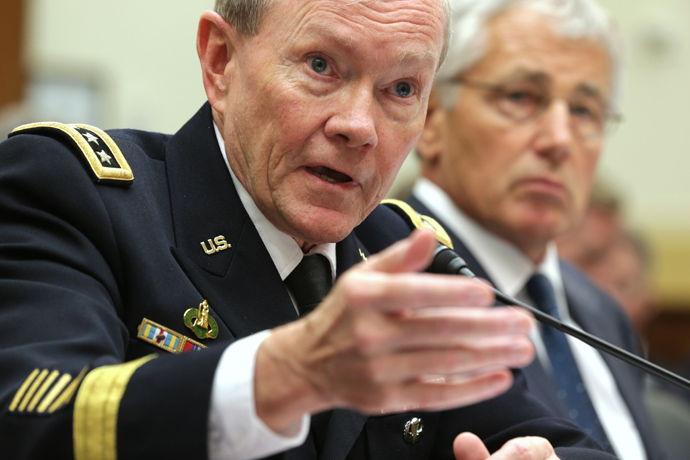
21:00 GMT: During Wednesday afternoon’s hearing before
the House Foreign Affairs Committee, Defense Secretary Chuck
Hagel suggested that the Assad regime received some of their
alleged chemical weapons arsenal from Russia.
“There’s no secret that the Assad regime has had chemical weapons, significant stockpiles of chemical weapons,” Hagel said.
When asked by Rep. Joe Wilson (R-South Carolina) to elaborate, Hagel responded, "The Russians supply them, others are supplying them with those chemical weapons, they make some themselves.”
18:13 GMT: Rep. Brian Higgins (D-New York) questioned the United States’ potential involvement in the Syrian civil war by insisting that the US should concentrate on its domestic endeavors, not efforts abroad.
“The American people are sick and tired of war,” Higgins told Secretary of State John Kerry. “It’s time to nation build — in America.”
18:07 GMT: Answering critique from Rep. Ted Deutsh (D-Florida) about America’s potential role in the Syrian civil war, Secretary of State told the committee, "The United States of America is not being the world’s policeman."
17:23 GMT: Senator Robert Menendez, chairman of the US Senate Foreign Relations Committee, told reporters that a meeting and potentially a vote could occur as early as 2 p.m. local time, or 1800 GMT, today.
16:48 GMT: According to Reuters, the Senate Foreign Relations Committee is expected to vote later today on the draft resolution presented on Tuesday which would authorize the use of military force in Syria
16:36 GMT: Secretary of State John Kerry is again the lead witness during a Congressional hearing in Washington, this time one hosted by the House Foreign Affairs Committee.
During Wednesday afternoon testimony, Kerry said that new evidence has surfaced only hours earlier linking Assad’s regime to the August 21 attack near Damascus that the White House says killed over 1,400 people.
Meanwhile, anti-war protesters with the group Code Pink
assembled during the hearing seated behind Kerry.
International television cameras captured the demonstrators
with symbolic “blood” on their hands.
Notorious Medea Benjamin Code Pink protester behind State Secretary @JohnKerry during Syria hearing pic.twitter.com/uQKZxeQFwo
— Kyle Kim (@kyleykim) September 4, 2013
During Tuesday’s hearing in the Senate, Code Pink co-founder Madea Benjamin was ejected from the facility during an outburst that occurred moments into the meeting.
14:58 GMT: Russian President Vladimir Putin criticized remarks made by the US Secretary of State John Kerry at the Congressional debate, saying Kerry “lied” by claiming there was no Al-Qaeda militants fighting in Syria and that the military strike against President Assad will not boost the terrorist network’s presence in the region.
“Well, he [Kerry] lies. And he knows that he lies. This is sad,” Putin remarked as he spoke to human rights activists on Wednesday, saying that the Al-Nusra Front terrorist organization, which pledged allegiance to Al-Qaeda, has been at the forefront of the rebel groups fighting Assad’s forces, and that the US is well aware of that.
Speaking of Kerry’s confidence in that Assad’s forces used chemical weapons, Putin recalled former US Secretary of State Colin Powell’s rhetoric on the eve of American invasion in Iraq. It later turned out that all Powell’s arguments that Iraq had chemical weapons “did not hold water,” the Russian President stressed.
13:40 GMT: President Barack Obama said the credibility of the US Congress was on the line regarding the need to uphold a ban on chemical weapons in Syria.
"My credibility is not on the line. The international community's credibility is on the line," he told a news conference in Sweden. "America and Congress's credibility is on the line, because we give lip service to the notion that these international norms are important," Obama added.
13:16 GMT: US President Barack Obama urged the
international community to respond effectively to chemical
weapons’ use in Syria during his statement at a press
conference in Sweden.
A "real strong message” to Assad must be sent to
‘degrade’ his ability to use chemical weapons again,
the President added.
Obama stated that he was not required to submit proposals for
military action to Congress for approval, but also said that
not doing so was no empty exercise.
10:20 GMT: Turkish Prime Minister Tayyip Erdogan
reiterated on Wednesday that Turkey would take part in any
international coalition against Syria but didn't say whether
that would include military action.
00:47 GMT: A new US Senate draft resolution for authorizing use of military force in Syria sets a 60-day deadline, with one 30-day extension possible, while barring ground forces.
The resolution was drafted by Sens. Robert Menendez (D-N.J.) and Bob Corker (R-Tenn.), the chairman and ranking member of the Foreign Relations Committee. The resolution needs 60 votes in the Senate to overcome a filibuster by opponents.
The draft follows Tuesday’s hearing on Syria featuring
testimony from US Secretary of State John Kerry, Chairman of
the Joint Chiefs of Staff Martin Dempsey and Secretary of
Defense Chuck Hagel.
00:30 GMT: Though not yet in session, members of the
US House of Representatives have released two separate draft
resolutions on potential US military action in Syria,
Politico reported.
Rep. Devin Nunes (Calif.), a top Republican on the House Intelligence Committee, offered a resolution calling for President Obama to consult with Congress within 60 days to provide information on nine fronts to justify the use of military force.
The resolution would require a summary of “attempts to
build a coalition; a ‘detailed plan for military action in
Syria, including specific goals and military objectives;’
what would qualify as degrading the chemical weapons supply;
an explanation how a limited military strike would encourage
regime change, prevent terrorists from taking control of
power or weapons, secure the chemical weapons and deter their
future use; how a strike would prevent Iran and Russia from
keeping Assad in power; information about Al Qaeda’s access
to weapons; an explanation of whether weapons from Libya are
being used by the Syrian opposition and an estimation of the
cost.”
The other resolution, offered by Democrats Rep. Gerry Connolly (Va.) and Rep. Chris Van Hollen (Md.), is also supportive of a Syria attack but seeks to narrow the scope of any such action. Their resolution bars use of ground forces, limits attacks to 60 days while prohibiting a second series of attacks -- unless the Obama administration has proof Assad used chemical weapons again -- and says an attack on Syria can only happen to prevent use, not stockpiling, of chemical weapons.
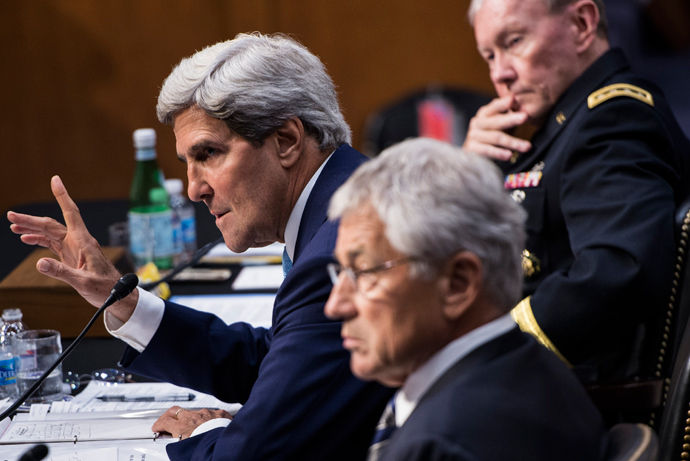
Tuesday, September 3
23:17 GMT: United Nations Secretary General Ban Ki-moon has called on Security Council members to develop a response should UN inspectors find proof that Syria used chemical weapons.
“I take note of the argument for action to prevent future uses of chemical weapons,” Ban said from UN headquarters in New York. “At the same time, we must consider the impact of any punitive measure on efforts to prevent further bloodshed and facilitate a political resolution of the conflict.”
UN inspectors are working “around the clock” after a recent investigation of an alleged chemical weapons attack near Damascus that the US and allies have attributed to the Syrian government. Once analyses of the site samples are completed, Ban will share the report’s results with the 193-member Member States and the 15-member Security Council.
Ban also appealed for a renewed commitment to solutions to the Syrian conflict during the upcoming G20 conference in Russia.
22:55 GMT: Some 56 percent of respondents do not want
the US to intervene in Syria, according to the latest
Reuters/Ipsos poll surveying the American public on potential
strikes there. Only 19 percent surveyed supported US action,
while 25 percent said they did not know what, if anything,
the US should do.
Just 29 percent of respondents support arming anti-government rebels in Syria, while 49 percent oppose. Another 21 percent were undecided on arming rebels.
22:50 GMT: At the conclusion of Tuesday’s
Senate hearing Senator Rober Menendez stated that a
resolution for the use of US military force in Syria would
likely be written by the end of the day, and Congress might
convene a vote on that by Wednesday.
According to Menendez the text authorizing President Obama to commit military forces would ensure the intervention would not be open-ended "and specifically not with boots on the ground, American troops on the ground."
"It is likely that we could very well be in a
business meeting sometime after the classified hearing
tomorrow morning," Menendez said. The Senate is
scheduled to receive a classified hearing with administration
officials on Wednesday morning.
22:45 GMT: During the Syria hearing, a
Washington Post photographer snapped a photo of Sen. John
McCain playing poker on his iPhone. Soon after the photo made
the rounds on Twitter, McCain tweeted, "Scandal! Caught
playing iPhone game at 3+ hour Senate hearing - worst of all
I lost!"
22:40 GMT: Chairman of the US Joint Chiefs of Staff
Gen. Martin Dempsey told Congress Tuesday Russia may increase
Syria military aid should the US attack, though he said he
did not think this possibility should stall US action.
"There is some indication that they (the Russians) have
assured the regime that if we destroy something, they can
replace it," Dempsey said during a Senate hearing.
22:31 GMT: Former US secretary of state Hillary
Clinton backs President Obama’s appeal to Congress for
authorization of attacks against Syria, The Washington Post
reported.
“Clinton supports the president’s effort to enlist the
Congress in pursuing a strong and targeted response to the
Assad regime’s horrific use of chemical weapons,” a
Clinton adviser said in a statement.
As secretary of state, Clinton advocated for the administration to do more to arm and assist forces opposed to Assad’s government in Syria.
19:59 GMT: Two Russian amphibious assault ships,
“Novocherkassk” and “Minsk,” have headed to the Mediterranean
Sea as part of a scheduled mission of monitoring the
situation in the region, a Russian Defense Ministry spokesman
told ITAR-TASS.
The ships were dispatched from Russia’s Black and Baltic Sea
Fleets, and will reach the destination area on September 5-6,
joining the Russian standing naval force in the region, the
ministry said.
The maneuvers are part of the “stage-by-stage rotation of
warships and support ships of the standing naval force in the
Mediterranean,” the spokesman explained.
One of the key tasks of the Russian standing naval force in
the Mediterranean is “comprehensive monitoring over the
air, underwater, and surface situation in the zone of its
deployment,” he added.
19:22 GMT: During a congressional hearing in Washington Tuesday afternoon, Secretary of State John Kerry and Gen. Martin Dempsey, the chairman of the Joint Chiefs of Staff, advocated for a limited military strike on Syria. Senator Bob Menendez (D-New York), chairman of the Senate Foreign Relations Committee, also said he supported action targeting the regime of Bashar al-Assad.
According to Sec. Kerry, “The authorization that Pres. Obama seeks is definitively in our national security interests.” The former senator also said Assad would be “arrogant” and “foolish” to retaliate against any US strike.
18:24 GMT: Russia’s missile defense system “proved its effectiveness” after it was put on high alert following the Israeli-US test launch of a ballistic missile in the Mediterranean, said Russian Deputy Defense Minister Anatoly Antonov.
Describing the Mediterranean as a modern “powder keg,” Antonov called for the US “not to play with fire,” and said it should show more responsibility for both regional security and world peace.
He reminded that the US and the USSR signed an agreement
binding both parties to give notification of missile launches
in advance, which is still valid between the US and
Russia.
17:26 GMT: UN Secretary General Ban Ki-moon on Tuesday said he intends to bring the issue of the escalating Syrian crisis to the top of the G20 summit’s agenda.
Ban stressed that the use of military force is only legal in self-defense, or with the authorization of the UN Security Council. He also called for holding the Geneva-2 peace conference on Syria as soon as possible.
The UN Chief also reminded that UN investigators are set to
return to Syria to investigate several other cases of alleged
chemical weapons use.
16:10 GMT: Democratic leader in the US House of Representatives, Nancy Pelosi, said she believes Congress will support a resolution authorizing the use of military force against Syria.
Pelosi made her remarks after meeting the president and
congressional leaders at the White House.
15:38 GMT: Republican US House Speaker John Boehner announced he will support President Obama’s call for military action in Syria, and said he believes his colleagues should also back the decision.
US Senator John McCain immediately reacted by applauding Boehner’s stance on his Twitter.
Excellent statement by @SpeakerBoehner on #Syria
— John McCain (@SenJohnMcCain) September 3, 2013
15:21 GMT: France won’t intervene in Syria unilaterally, should the US Congress veto military action against Syria, French President Francois Hollande has said.
“If the decision of [US Congress] was not positive, then we would not act alone, but we would not shirk our responsibilities, by supporting the opposition in Syria in such a way that would provide a response,” Hollande said as quoted by Reuters.
15:05 GMT: The Israeli Defense Ministry confirmed a US defense agency took part in a “successful flight test of the new version of the Sparrow target missile” in an e-mail statement to RT Arabic.
“Israel’s Missile Defense Organization and the US Missile
Defense Agency officials conducted the flight test. The main
contractor for the integration and development of the Sparrow
is Rafael and the main contractor of the Arrow Weapon System
is MLM of Israel Aerospace Industries (IAI) in conjunction
with Boeing,” the statement explained.
14:39 GMT: Pentagon has confirmed the US Defense
Department took part in Israeli missile test in the
Mediterranean.
The missile test was carried out “with technical support
of the US Defense Department,” the department spokesman
George Little said as quoted by Itar-Tass.
According to Little, the test was “pre-planned” and
“not connected to Syria.”
Early this AM, the US Department of Defense provided technical assistance and support to an Israeli missile test. Not connected to Syria.
— George Little (@PentagonPresSec) September 3, 2013
14:12 GMT: US President Barack Obama held a White House meeting with select members of Congress to discuss the Syrian crisis in Washington on Tuesday morning. The president again stressed that he was pursuing a limited and proportional military strike that would degrade the Assad regime’s capabilities of using chemical weapons while also underlining a broader strategy that will allow the US to assist opposition fighters in the future if necessary.
When asked if he was confident that Congress would authorize
the use of military force against the Syrian government,
Obama replied, "I am."
13:40 GMT: The UN Refugee Agency (UNHCR) announced on Tuesday that more than 2 million Syrians have fled the country since civil war began in March 2011.
“The war is now well into its third year and Syria is hemorrhaging women, children and men who cross borders often with little more than the clothes on their backs,” the UNHCR statement read.
A further 4.25 million people have been displaced inside
Syria, according to data from the UN’s Office for the
Coordination of Humanitarian Affairs (OCHA). This makes the
country’s refugee crisis “unparalleled in recent
history,” UN High Commissioner for Refugees Antonio
Guterres said.
12:37 GMT: World markets immediately plunged on
Tuesday after the Russian Defense Ministry reported the
launch of two ballistic missiles in the eastern
Mediterranean. The FTSE 100 slumped down nearly one percent
(7.01 points), and stock markets in Germany and France
experienced similar losses. Traders reacted to fears of
escalation of war in the Middle East as far as India, as the
BSE Sensex fell nearly 4 percent (651 points) on
“geopolitical worries,” Reuters India reported.
Some of the markets recovered soon after the launch was
claimed by IDF to be a joint Israeli-US early warning system
test.
11:30 GMT: The US Navy did not fire any missiles from
ships in the Mediterranean, according to a spokesman for the
US Navy’s European headquarters.
“No missiles were fired from U.S. ships in the
Mediterranean,” the spokesman said.
10:58 GMT: Israel claimed a joint missile launch with the US in the Mediterranean Sea. The Israeli Defense Ministry spokesmen told journalists that they tested an Ankor-type (“Sparrow”) target missile to check how well the anti-missile system known as “Arrow-3” functions. The launch took place at 06:15 GMT, the ministry spokesmen added.
10:08 GMT: Syria’s missile warning system has not detected any rockets landing on the country’s territory, a Syrian security source has told Lebanese channel al-Manar TV.
9:59 GMT: Russia’s early warning radars have detected the launch of two ballistic
rockets in the eastern Mediterranean, Russia’s Defense
Ministry stated. The launch reportedly took place at 06:16
GMT Tuesday.
The trajectory of the missiles is reported to have been from the central part of the Mediterranean Sea towards the eastern landmass. Both rockets have allegedly fallen into the sea 300 kilometers off the coast, RIA Novosti news agency reported.
00:30 GMT: Samples collected by the UN chemical experts team in the Damascus suburb will be transferred to laboratories for analysis “within hours,” a spokesperson for UN Secretary-General ban Ki-moon has said in a note to correspondents.
“Since the return of the Mission last Saturday, the UN team worked around the clock to finalize the preparations of the samples in view of their shipment to the designated laboratories.”
“The samples were shipped this afternoon from The Hague and will reach their destination within hours,” the note continued.
It added that the designated laboratories are prepared to
begin the analyses “immediately after receipt of
samples.”
Monday, September 2
20:40 GMT: US Senator John McCain stated Monday that Congress rejecting President Obama's proposal for military force in Syria would be catastrophic.
"If the Congress were to reject a resolution like this after the president of the United States has already committed to action, the consequences would be catastrophic," McCain told reporters after a meeting with Obama.
20:19 GMT: The White House is ready to rework language in a draft resolution that would authorize military force in Syria, Reuters quoted an administration official as saying. The change would address concerns from lawmakers. The administration is open to changes "within the parameters that (the) president has previously explained."
19:00 GMT: The deployment of USS Nimitz and other warships towards the Red Sea shows that the United States is determined to start a military campaign against Syria, said a top Russian lawmaker.
“By sending the Nimitz
nuclear aircraft carrier to Syria’s shores, Obama
demonstrates that the military action has been postponed, but
not cancelled, and that he is determined to start a war,”
tweeted Aleksey Pushkov, the head of the international
affairs committee in the State Duma.
16:56 GMT: A declassified French intelligence report,
based on satellite images of the August 21 chemical weapons
attack in Syria, shows that the strikes came from
government-controlled areas to the east and west of Damascus,
and targeted rebel-held zones, sources told Reuters.
The Syrian government subsequently bombed areas where
chemical strikes took place to wipe out evidence, a source in
the French government said, adding that the chemical attack
was massive and coordinated and the opposition would not have
the means to carry it out.
"Unlike previous attacks that used small amounts of
chemicals and were aimed at terrorizing people, this attack
was tactical and aimed at regaining territory," the
source said.
16:55 GMT: Syria's President Bashar Assad told French
newspaper Le Figaro that the allegations on chemical attacks
were “illogical.”
15:50 GMT: US Secretary of State John Kerry and
Secretary of Defense Chuck Hagel will appear as witnesses at
a Senate Foreign Relations Committee hearing on Tuesday on
the authorization of the use of military force in Syria, the
committee said in a statement.
15:24 GMT: Foreign ministers from the 11 countries of
the Friends of Syria group will meet September 8 in Rome, a
diplomatic source told Reuters. The core group of nations
includes France, the United States, Britain, Egypt and Saudi
Arabia.
15:22 GMT: The British government has no intention to
hold a second parliamentary vote on taking military action
against Syria, AFP reported. "Parliament has spoken and
that is why the government has absolutely no plans to go back
to parliament," a spokesman for Prime Minister David
Cameron said. "The position we are in is that parliament
has expressed its will and that is the basis on which we will
proceed.”
14:59 GMT: A senior member of France’s ruling
Socialist Party rebuffed opposition calls for a parliamentary
vote on whether to take military action against Syria.
Elisabeth Guigou urged lawmakers to respect the president's
constitutional right as the army's commander-in-chief to
decide what action French armed forces would take.
"In a complicated situation like this, we need to stick to
principles, in other words the constitution, which does not
oblige the president to hold a vote, nor even a debate,"
Guigou, the parliament’s Foreign Affairs Committee
chairwoman, told France Info radio.
13:29 GMT: President Vladimir Putin has supported a proposal from Russian MPs to send a parliamentary delegation to the US Congress in an effort to resolve the Syrian crisis.
“We should more actively involve the parliaments of our
countries,” Federation Council chairwoman Valentina
Matviyenko said. “We would like to address senators and
members of the House of Representatives in Congress, to have
a dialogue with our partners.”
Russia will also welcome members of the US Congress in Moscow, Matviyenko said.
"I think if we manage to establish a dialogue with our partners in the U.S. Congress ... we could possibly better understand each other, and we hope that the U.S. Congress will occupy a balanced position in the end and, without strong arguments in place ... will not support the proposal on use of force in Syria," Valentina Matviyenko said.
12:39 GMT: NATO has “its own role in settling the
Syrian crisis,” said Secretary-General Anders Fogh
Rasmussen, adding that it conducts “closed consultations
between allies.”
“I don't foresee any further NATO role” in the crisis
solution, he noted. “It’s for individual allies to decide
how they will respond.”
He called the international community for a firm response to
the alleged August 21 chemical weapons attack in Syria.
"We believe that these unspeakable actions which claimed
the lives of hundreds of men, women and children cannot be
ignored," Rasmussen told a news conference. "I think
there is an agreement that we need a firm international
response in order to avoid chemical attacks taking place in
the future," he said.
Rasmussen also said he is convinced that the Syrian government was responsible for the chemical attack.
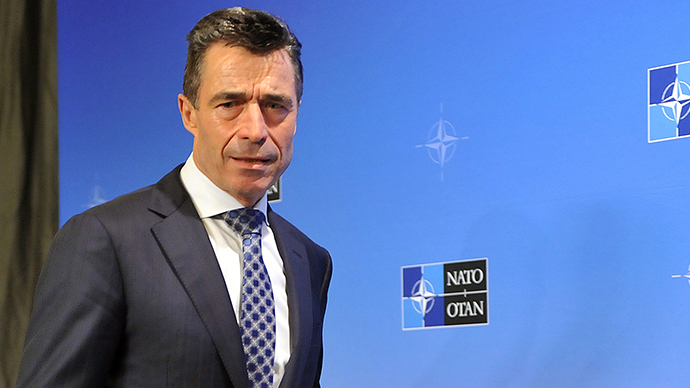
12:31 GMT: The crisis in Syria is not on the agenda of
the G20 Leaders’ Summit on September 5-6 in St. Petersburg,
but “it is for the Russian presidency of the G20 to make
this decision," a spokesman for the EU said.
Earlier, Russian Foreign Minister Sergey Lavrov said that,
since the G20 was founded as financial summit, Syria would
not be on the agenda. Lavrov added, however, that any leader
could raise the subject of Syria and “they will be ready
for this talk.”
12:01 GMT: A BBC poll has found that almost three
quarters of the UK population believe that MPs were right to
reject military intervention in Syria. Seventy-one percent of
people thought Parliament voted the right way, while 72
percent said they did not think the move would negatively
impact UK-US relations. A further two thirds said they would
not care if it did.
10:21 GMT: Hezbollah has promised to retaliate by
firing surface-to-surface missiles at Israel if it decides to
partake in the strike against Damascus.
“Hizbullah is controlling 8,000 kilometers in Reef Homs
and will not hesitate to participate in an attack by firing
surface-to-surface missiles from Syria,” said a source
from a joint operation run by Hezbollah and the forces of
President Assad, as reported by the Kuwaiti al-Rai newspaper.
10:00 GMT: The war in Syria has displaced 7 million
Syrians, or almost one-third of the population, the head of
the UN refugee agency, Tarik Kurdi, says. Two million
children are among those directly affected by the war. Kurdi
stressed that UN assistance has been a "drop in the sea of
humanitarian need" and that the funding gap is "very,
very wide."
09:49 GMT: Syria's army is on high alert and will
“remain so until terrorism is completely eradicated,"
a security official in Damascus said Monday.
09:25 GMT: Foreign Minister Lavrov met with his
South-African counterpart to discuss a range of issues
including Syria, on which he said that "The framework for
[the Geneva peace talks on Syria] was in place", but that
partners who side with the US strike are less interested in
bringing the rebels to the negotiating table than they are in
creating a "controlled chaos". He added that this puts
the peace talks in danger, and finally, that a strike would
only allow extremism to flourish, instead of creating a
stable transition that everyone seems to desire.
08:15 GMT: The US has briefed China about evidence on the use of chemical weapons in Syria, China's Foreign Ministry spokesman, Hong Lei, said during a daily news briefing on Monday. Hong did not say what China thought of the evidence, but reiterated that China opposes the use of chemical weapons by any side, adding that Beijing supported the independent, objective investigation by the UN experts.
07:39 GMT: Russian Foreign Minister Sergey Lavrov has
said that a 'regime of secrecy' by the West is unacceptable
with regard to Syria and evidence of the use of chemical
weapons there.
"If there truly is top secret information available, the veil
should be lifted. This is a question of war and peace. To
continue this game of secrecy is simply inappropriate,"
Lavrov said during an address to the students of the Moscow
State University of International Relations.
Lavrov has called the information provided to Russia by the
US 'inconclusive’.
"We were shown some sketches, but there was nothing
concrete, no geographical coordinates or details... and no
proof the test was done by professionals... there were no
comments anywhere regarding the experts' doubt about the
footage circulating all over the internet," Lavrov said.
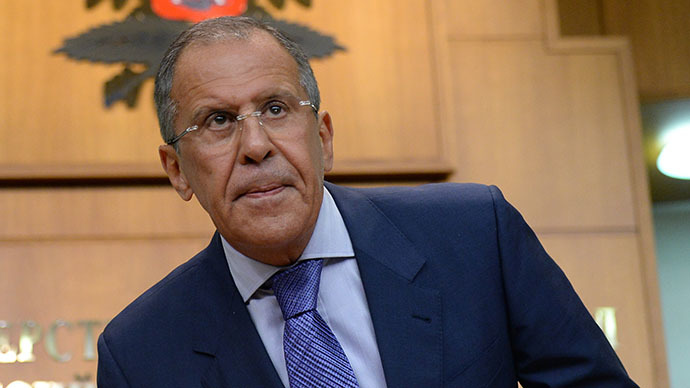
He added that "what our American, British and French
partners have shown us before - as well as now - does not
convince us at all. There are no supporting facts, there is
only repetitive talk in the vein of 'we know for sure.' And
when we ask for further clarification, we receive the
following response: 'You are aware that this is classified
information, therefore we cannot show it to you.' So there
are still no facts."
Sunday, September 1
04:45 GMT: World's number one tennis superstar Novak Djokovic speaks out against a military strike on Syria, recounting his experience as a child growing up in Belgrade, during the 78-day NATO bombing of 1999.
After winning his third match of the US Open, he told Reuters that "I'm totally against any kind of weapon, any kind of air strike, missile attack."
"I'm totally against anything that is destructive... because I had this personal experience, I know it cannot bring any good to anybody."
23:43 GMT: The nuclear-powered aircraft carrier
USS Nimitz along with four destroyers and a
cruiser have been ordered to move west in the Arabian Sea
toward the Red Sea, so that it can help support a US strike
on Syria if requested, a US official told Reuters.
22:16 GMT: The two identical letters delivered to the UN Secretary General Ban Ki-moon and President of the UN Security Council, Maria Cristina Perceval call on the international body to maintain its role of protector of international legitimacy and prevent US-led aggression against Damascus, Syria's permanent representative to the UN Bashar al-Jaafari told Sana.
20:30 GMT: The Arab League has issued a resolution calling on the international community to act against the Syrian government and punish it as a war criminal for killing hundreds of civilians in a chemical attack.
Arab League foreign ministers have urged the United Nations and international community to "take the deterrent and necessary measures against the culprits of this crime that the Syrian regime bears responsibility for," according to the final resolution of the Cairo meeting.
19:56 GMT: Chancellor Angela Merkel said Germany would
only take part in a military intervention in Syria with a
NATO or United Nations mandate. She was planning to talk with
Russian President Putin and Chinese President Xi Jinping at
the next G20 meeting to find common ground on the Syrian
conflict, she said during a TV debate with her political
rival Peer Steinbrueck.
19:39 GMT: France plans to “make public the
declassified documents on the Syrian chemical arms
program” soon, a source within the country’s government
said.
The source added that media reports, claiming that French
intelligence possess information that Bashar Assad’s
government has a chemical weapons arsenal of 1,000 tons, are
“correct.”
19:00 GMT: The head of the Foreign Affairs Committee of the Russian Duma Aleksey Pushkov said that Obama would likely use the G20 summit for justifying a military action against Syria.
“Obama will try to use the G20 summit for justifying an
attack on Syria. Whatever the summit’s program would have
been, it will now most likely be about Syria,” Pushkov
said on his Twitter.
18:40 GMT: A US amphibious transport ship has been
deployed to the Mediterranean, reports AFP quoting an
anonymous defense official. The USS San Antonio is "on
station in the Eastern Mediterranean" but "has received no
specific tasking," he said.
The San Antonio carries no Tomahawk cruise missiles but has up to four choppers and hundreds of Marines on board. The US already has five destroyers in place for possible missile strikes on Syria.
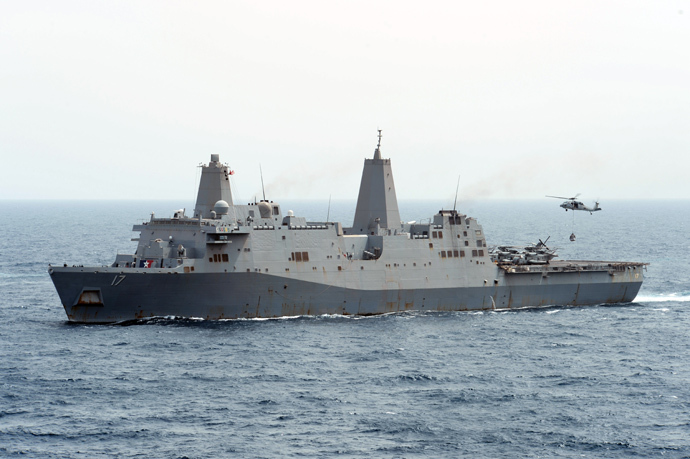
17:51 GMT: The US essentially declared war on Syria,
according to c Syrian Minister for National
Reconciliation Ali Haidar, who spoke to Bloomberg in a phone
interview. “I am among those who call for a preemptive
[response by all Syrians],” Haidar said.
“He’s kept the sword in his hand, he just hasn’t chosen to
limit himself to a date,” Haidar added, in reference to
Obama's announcement that he would seek Congressional
approval for a strike on Saturday.
17:42 GMT: The Syrian opposition chief has urged the Arab League to back Western strikes. Ahmad Jarba stated that Syria could be the gate to fight Iran.
"I am here before you today to appeal to your brotherly
and humanitarian sentiments and ask you to back the
international operation against the destructive war
machine," Jarba stated at the meeting of minsiters in
Cairo.
17:41 GMT: Saudi Arabia has called on the world community to take all necessary steps to deter “Syrian government violence.” The call comes as Arab League Foreign Ministers convene for an urgent meeting in Cairo.
"The time has come to call on the world community to bear its responsibility and take the deterrent measure that puts a halt to the tragedy," Saudi Foreign Minister Saud Faisa said adding that the Syrian regime has lost its Arab and Islamic legitimacy.
16:53 GMT: Turkish police blocked the entrance to the
Gezi Park in Istanbul preventing hundreds of demonstrators
from rallying there against a possible US intervention in
Syria.
At least 1,000 people took part in the demonstration, forming
human chains on the city's celebrated Istiklal Avenue, the
AFP reported. Smaller protests have also spread across
Istanbul, aimed at combatting its commercial development.
Earlier this summer Turkey was convulsed by a series of
violent protests across the country. Their target was Turkish
Prime Minister Recep Tayyip Erdogan and his ruling Justice
and Development party (AKP), accused of repressing critics
and of forcing Islamic values on the mainly Muslim but
staunchly secular nation.
14:50 GMT:
Three military cargo planes landed in US base in southern Turkey near Syria on Saturday, carrying military epuipments http://t.co/zmAroCuvfA
— Mahir Zeynalov (@MahirZeynalov) September 1, 2013

14:40 GMT: US Secretary of State John Kerry commented
that the US sent people to Russia with evidence on Syria and
the country "chose" to ignore it.
14:20 GMT: Saudi Arabia stated that it is supportive of whatever the Syrian people want, in regards to the possible US air strike on the country. "We call upon the international community with all its power to stop this aggression against the Syrian people," said Saudi Foreign Minister Saud al-Faisal on Sunday. "We stand by the will of the Syrian people. They know best their interests, so whatever they accept, we accept, and whatever they refuse, we refuse." He made the comments while attending a meeting of Arab League foreign ministers, according to Reuters.
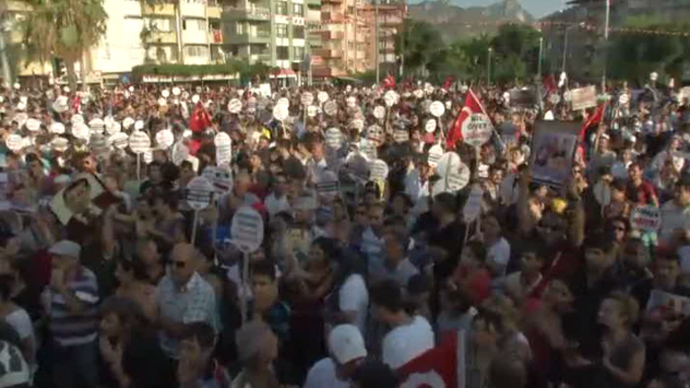
14:15 GMT: Thousands of people have gathered in the
town of Hatay, Turkey, near the border with Syria, in a
peaceful pro-Assad protest. The demonstrators brought flags
and banners to express support for the Syrian leader.
14:10 GMT: UN Secretary General Ban Ki-moon has urged the
chief chemical weapons inspector Ake Sellstrom to report back
on Syria "as soon as possible," according to a UN
spokesperson.
13:40 GMT: US Secretary of State John Kerry has voiced
confidence that the US Congress “will do the right thing” in
response to the request by President Barack Obama to approve
an American military strike against President Bashar Assad’s
regime, which the US accuses of launching a chemical weapons
attack on civilians on August 21.
"We don't contemplate that Congress is going to vote no,"
Kerry said on CNN's State of the Union program. "We
believe this case is powerful and continues to grow by the
day."
13:33 GMT: Syrian President Bashar Assad said that his
country was capable of repelling any external attack after US
President Barack Obama said that there should be a military
strike on Syria, but added that he’ll look for approval first
from Congress.
“Syria ... is capable of confronting any external
aggression,” Assad was reported as saying by Syrian state
TV. ”The American threats of launching an attack against
Syria will not discourage Syria from its principles ... or
its fight against terrorism supported by some regional and
Western countries, first and foremost the United States of
America.”
13:18 GMT: US Secretary of State John Kerry said that
samples taken from the site of the alleged chemical weapons
attack in Damascus on August 21 have tested positive for the
nerve gas sarin.
“In the last 24 hours, we have learned through samples
that were provided to the US that have now been tested from
first responders in east Damascus and hair samples and blood
samples have tested positive for signatures of sarin,"
Kerry said on NBC's Meet The Press. "So this case is
building and this case will build.”
Sarin is a man-made chemical warfare agent considered the
most toxic and fast-acting of its kind. The odorless,
colorless nerve agent interferes with an enzyme called
acetylcholinesterase, controlling nerve signals to the
muscles.
11:14 GMT: France said it will not act alone, saying it
needs a “coalition.” The country’s prime minister,
Jean-Marc Ayrault, will meet with parliamentary speakers and
opposition party leaders on Monday to discuss Syria ahead of
debates in both chambers of parliament on Sept. 4.
09:14 GMT: Syria’s main opposition bloc said
Sunday it was “disappointed" at President Barack
Obama's decision to seek approval from the US Congress for
military intervention against President Bashar Assad’s
government.
“We were expecting
things to be quicker, that a strike would be imminent... But
we believe Congress will approve a strike," said Samir
Nashar, a senior official in the Syrian National
Coalition.
08:36 GMT: Prime Minister of France Jean-Marc Ayrault is to meet with heads of Parliament and opposition to discuss Syria on September 2, before the upcoming debate - according to a statement to Reuters.
02:07 GMT: Seeking congressional approval is a
win-win situation for Obama, believes RT contributor Pepe
Escobar, adding that it is highly unlikely the US will miss
an opportunity “to
bomb a Middle Eastern country.”
“He is in a win-win situation: the Senate is a slam-dunk,
he is going to win, while Congress is more complicated
because of the Republicans,” Escobar said. “If they
say Yes, he’ll go ahead and become ‘Nobel prize winner-bomber
President Barack Obama’. If Congress says no, he can always
say ‘Look, I tried! But they don’t want me to bomb anybody!’
“But I don’t think the US Congress will refuse the
opportunity once again to bomb a Middle Eastern country,”
he added.
01:30 GMT: Political analyst Mark Mason told RT that
if Obama goes forward with military strikes on Syria without
congressional approval that would be yet another violation of
the constitution by this “Imperial Presidency.”
”[Obama] violated [the constitution] in an impeachable
offense when he attacked Libya,” said Mason. ”If he
attacks Syria as he proposes to do without Congress declaring
war, that’s yet another impeachable offense.”
00:12 GMT: Draft legislation asking for congressional approval to use force against Syria has been made public by Politico.
WH has sent Congress a draft authorization, @politico reports. Here’s the document: https://t.co/OdvNmaDZFU
— Blake Hounshell (@blakehounshell) August 31, 2013
Saturday, August 31
23:59 GMT: Senate majority leader Harry Reid believes that the US Senate will vote on a resolution authorizing military action no later than the week of September 9.
The Senate also plans to hold public hearings next week with senior administration officials. Classified and unclassified briefings for senators throughout the week are also anticipated.
"I believe the use of military force against Syria is both justified and necessary," Reid said in a statement, blaming the Assad government for "atrocities" against civilians.
23:52 GMT: The time delay in American response
gives a window of opportunity for “clearer heads to
intervene,” which is crucial as Obama
has "no strategy or plan B" on Syria,
believes historian William Engdahl.
“This responsibility to protect doctrine is absolute rubbish
from a stand point of international law,” Engdahl
said. Only the UN has the authority to intervene in such
manners, “Obama saying we have to do anything by
force for humanitarian reasons, that is rubbish.”
23:45 GMT: President Obama has left a door open to
decide on military action in Syria unilaterally, even if the
Congress votes against authorisation, Phyllis Bennis, the
director of the Institute for policy studies, told RT.
“I think that’s the biggest question right now is whether he
would feel bound by the congressional decision,” she
said.
In his speech, President Obama said he believed he has
“the authority to carry out this military action without
specific congressional authorization,” adding that the
“country will be stronger” if the president and
Congress take this course together.
“So he was leaving himself a fair amount of wiggle room,
to say ‘I might agree, I might not, if Congress
disagrees,” Bennis said, adding however that the
opposition he will face may be not enough to block
authorisation as many of the congressmen “might be
reluctant to come out against the sitting president.”
23:26 GMT: President Obama has formally requested
Congressional authorization for military strikes on Syria,
Reuters reported.
Draft bill would reportedly authorize Obama to use military
force on Syria as necessary to prevent more chemical attacks.
22:43 GMT: UN Secretary-General Ban Ki-moon has met with the top disarmament official just returned from Damascus, the UN announced. High Representative for Disarmament Affairs Angela Kane briefed the UN chief for over an hour.
“Ms. Kane reported that the mission was able to conduct a
wide range of fact-finding activities pertaining to the 21
August incident in the Ghouta area,” UN Spokesperson
Martin Nesirky told reporters in New York. The conclusions
will be conveyed to Ban who “looks forward to receiving
the findings as soon as possible so they can be promptly
presented to the 193 Member States and to the Security
Council,” Nesirky said.
22:25 GMT: Ahead of the congressional debate on a
possible Syrian strike, US Secretary of State John Kerry will
try to win the hearts of Americans by arguing the
administration’s case on five major US talk shows, politico
reported citing a White House source. Kerry is planning to
appear on NBC's "Meet the Press," ABC's "This
Week," CBS's "Face the Nation," CNN's "State of
the Union" and "Fox News Sunday."
21:28 GMT: President Obama will discuss the case for action on Syria with world leaders at the G20 summit in St. Petersburg, Russia next week, US officials said.
NOW: U.S. officials say Obama will discuss U.S. case for action on Syria with world leaders at G20 summit in Russia next week - @Reuters
— NewsBreaker (@NewsBreaker) August 31, 2013
20:40 GMT: Analyzing the data from the site of the alleged Syrian chemical attack last week will take up to 3 weeks, the UN investigative team announced Saturday.
"The evidence collected by the team will now undergo laboratory analysis and technical evaluation according to the established and recognized procedures and standards," the Organization for the Prohibition of Chemical Weapons (OPCW) said in a statement. "These procedures may take up to three weeks."
The team which returned to The Hague from Syria included nine experts from the Organization for the OPC and three from the World Health Organization.
20:33 GMT: RT’s Maria Finoshina was listening to
Obama’s speech sitting in Damascus with a group of Syrians
and she had a chance to see how their mood changed as Obama
delivered a speech many expected to become a declaration of
war.
“[When Obama said] he will seek Congress approval for
attacking Syria, many here on the ground took it as an exit
strategy. This is why if at the beginning of Obama’s speech I
saw that people looked nervous, obviously frightened, tense
and worried, relief came to replace all these emotions,
feelings, following Obama’s speech,” Finoshina
explained.
While many Syrians believe the Congress may now follow UK Parliament’s lead and block military authorization, the others, Finoshina said, were relieved to find out that at least the strike was “not going to happen tonight.”
20:25 GMT: President Barack Obama and French President Francois Hollande have agreed “the international community must deliver a resolute message to the Assad regime - and others who would consider using chemical weapons - that these crimes are unacceptable and those who violate this international norm will be held accountable by the world," the White House said in a statement.
In a phone call on Saturday, Obama informed Hollande that he would seek congressional approval for US military action.
Hollande in his turn informed the US president of “his determination to act to sanction the regime," a source close to the French President told Reuters. "Each country's pace of action must above all be respected. It's important for the Americans to have the green light from Congress," the source said.
19:17 GMT: US Secretary of State John Kerry spoke with
Syrian Opposition Coalition President Ahmed Assi al-Jarba to
underscore President Barack Obama's "commitment to holding
the Assad regime accountable for its chemical weapons
attack,” a senior State Department official told Reuters.
18:39 GMT: The US House of Representatives will consider the issue of a possible military strike against Syria when it returns from recess, starting September 9, the Republican delegates announced Saturday.
"We are glad the president is seeking authorization for any military action in Syria," House Speaker John Boehner said in a statement.
"In consultation with the president, we expect the House to consider a measure the week of September 9th," said the release. "This provides the President time to make his case to Congress and the American people."
17:05 GMT:
Protestors against US - Syrian involvement growing in front of White House. Just witnessed arrest @wusa9pic.twitter.com/Rjo8RZTO4G
— suraechinn (@suraechinn) August 31, 2013
Obama will be speaking from the White House Rose Garden in 10
minutes, at 17:15 GMT.
16:50 GMT: A UN spokesperson has announced that the UN is
not pulling out of Syria and that humanitarian work in the
country will continue. The UN secretary general Ban Ki-moon
will be briefed by the head of the chemical weapons team on
Sunday.
Spokesperson Martin Nesirky went on to say that the UN team
will return to Syria in order to examine all claims of
chemical attacks.
15:37 GMT: The Syrian Prime Minister has stated
readiness for any possible foreign strikes against it, saying
that the country has its "finger on the
trigger."
15:36 GMT: Iran has warned that any strike on Syria by
the US would trigger reactions "beyond" Syria, according to
AFP.
14:07 GMT:
Thousands streaming towards Trafalgar Square to oppose #Obama's war in Syria. #HandsOffSyriapic.twitter.com/yQdy0Ya4Q7
— CND (@CNDuk) August 31, 2013
14:05 GMT: UN inspectors are heading to the Hague with
samples taken at sites of alleged chemical weapons use in
Syria.
13:24 GMT: The White House said senior US
administration officials would hold “unclassified
conference calls” on Syria with the Senate Democratic
Caucus and the Senate Republican Conference, Reuters
reported.
The calls are part of "the Administration's consultations
regarding the Assad regime's use of chemical weapons in Syria
on August 21," an unnamed White House official said,
adding that Director of National Intelligence James Clapper,
President Barack Obama's National Security Adviser Susan Rice
and Admiral James Winnefeld, vice chairman of the Joint
Chiefs of Staff, would also take part in the conference
calls.
12:14 GMT:
We hear smth that sounds like big old cannon all the time,#Damascus.Ppl/kids don't pay ANY attention.'It's normal'.#strike sounds different?
— Maria Finoshina (@MFinoshina_RT) August 31, 2013
12:13 GMT: Foreign ministers from Arab countries are
expected to discuss Syria at a meeting in Cairo on Sunday,
Arab League deputy chief Ahmed Ben Helli told reporters. The
negotiations were initially planned for Tuesday, but he said
the meeting had been brought forward "in light of rapid
developments in the Syria situation and based on the request
of several Arab states."
09:28 GMT: The Syrian government said that it expected
a military attack imminently, and it was ready to respond in
kind.
"We are expecting an attack at any moment. We are ready to
retaliate at any moment," AFP cited a Syrian security
official, who wished to remain anonymous, as
saying.
04:55 GMT: UN chemical weapons experts have reportedly
crossed into neighboring Lebanon after finishing the
investigation in Damascus.
03:01 GMT: UN chemical inspectors have departed from their hotel in central Damascus early Saturday morning and are currently on their way to Lebanon.
01:39 GMT: All Senate Republicans will be briefed on the potential US involvement in Syria during a conference call with the White House Saturday after a request from Senate Minority leader Mitch McConnell, according to a new report.
McConnell has met with White House officials to discuss the
Syrian government’s suspected use of chemical weapons, but
said Friday it is important for every Republican lawmaker to
learn the details of the situation.
US President Obama met with top Congressional leaders in a
conference call Thursday to discuss the possibility of US
forces launching a missile strike against Syrian President
Bashar Assad. After the call Obama said the attack was a
“challenge to the world” that threatens US allies in
the region.
Friday, August 30
23:55 GMT: A ship carrying several hundred US
Marines and V-22 Ospreys received order to remain in the
eastern Mediterranean Sea, though officials told ABC News it
is not yet part of planning for a potential strike against
Syria.
The USS San Antonio is in the Mediterranean for a six-month
stint assisting US Africa Command. The amphibious ship was
told this week to head for a port call at a US naval base at
the Greek island of Crete.
The ship joins five US Navy destroyers currently in the
eastern Mediterranean that have capabilities of launching
Tomahawk cruise missiles, which US officials have said would
be the likely method of attack on Syria.
22:34 GMT: The United Nations Security Council may have to wait as long as two weeks before reviewing the final results of an analysis of samples taken from where chemical weapons were used in Syria, diplomats told Reuters on Friday.
22:13 GMT: Washington’s statements threatening to
use military force against Syria unilaterally are unacceptable, Russian Foreign Ministry
spokesman Alexander Lukashevich said in a statement.
21:15 GMT: The intelligence assessment the US
administration presented as evidence that the Syrian
government deployed chemical weapons on its own people is
baseless and based on “terrorist lies” and “media
exaggeration,” Syrian foreign ministry sources say.
21:45 GMT: US House Speaker John Boehner has not ruled out calling the House of Representatives back to Washington for a vote on Syrian intervention, his spokesman told NBC News. Congress is currently on a five-week recess.
21:30 GMT: Iraqi Shi’ite militia group al-Nujaba
claims it will target United States interests in Iraq should
the US carry out military strikes in Syria, Reuters
reported.
"All their interests and facilities in Iraq and the region will be targeted by our militants if the United States insists on attacking Syria," said a spokesman for al-Nujaba, a group consisting in part of Shi’ites who have fought alongside pro-Syrian government forces. Syrian President Bashar al-Assad is from the Alawite sect, an offshoot of Shi'ite Islam.
21:00 GMT: US President Barack Obama discussed Syrian
options Friday in phone calls with British Prime Minister
David Cameron and French President Francois Hollande,
according to top US officials. The consultations follow
Thursday’s vote by the British Parliament to reject
participation in any potential strikes against Syria.
19:05 GMT: Turkey PM Tayyip Erdogan says any operation
must follow the Kosovo model, and include a force on the
ground. "We are not happy with a limited operation. It
shouldn't just be a day or two of strikes, and then nothing.
We need regime change in Syria."
18:40 GMT: Obama has stated that the US is still in the planning process regarding a response to the situation in Syria. He stated that his preference would have been for the international community to move forward.
He called the alleged chemical attack "a challenge to the
world" and a threat to security interests. While
the US President has made no final decision on a course of
action, he stated that the government was contemplating a
"limited narrow act."
18:23 GMT: The White House also released a map of Ghouta,
displaying the areas affected by the alleged Aug. 21 chemical
weapons attack.

17:36 GMT: A report released Friday says that US
intelligence services have “high confidence” Syrian
government forces used chemical weapons multiple times during
the last year.
However, Washington cannot yet declare with 100 per cent
certainty that President Bashar Assad’s regime was
responsible for the poison gas attack on August 21 in the
Damascus suburb of Ghouta, the report said.
“Our high confidence assessment is the strongest position
that the US intelligence community can take short of
confirmation,” the report reads in part. “We will
continue to seek additional information to close gaps in our
understanding of what took place.”
In the Ghouta attack 1,429 people died, including 426
children, the report stated.
17:10 GMT: UN investigators have finished gathering
samples of evidence related to the suspected chemical weapons
attack that killed hundreds of people in a Damascus suburb
last week and are packing up to leave, UN spokesman Martin
Nesirky said.
The experts will be leaving Syria on Saturday, but will
return later to investigate several other alleged poison gas
attacks that have taken place in the country during its
2-1/2-year civil war, he added.
16:14 GMT: NATO will not take part in military
intervention in Syria, the alliance’s Secretary-General,
Anders Fogh Rasmussen, told Denmark’s Politiken newspaper.
“I don’t foresee any NATO role in an international
response to the regime,” Rasmussen said, adding that
individual countries would decide whether to take part in any
military action.
He stressed there could be “no doubt” that the
government of Syrian President Bashar Assad was responsible
for using toxic gas against civilians near Damascus on August
21, as it "had a store of chemical weapons and the means
needed to perform an attack."
However, NATO’s Secretary-General said he didn’t think
intervention was the best way to solve the crisis, adding
that a political solution would be
“sustainable.”
16:02 GMT: Nearly 80 percent of Americans say President
Barack Obama should receive approval from Congress before
ordering military intervention in Syria, according to a new
poll by NBC News. Fifty percent of Americans believe the US
should not intervene. Meanwhile, 50 percent support military
action if it is limited to launching cruise missiles from US
warships, but 44 percent said they oppose such
intervention.
15:43 The UN investigators are finishing their
investigation in Ghouta, the Damascus suburb that was the
site of an alleged chemical attack, and will leave Syria by
Saturday, ITAR-TASS news agency reported, saying the
information was confirmed to their correspondent at the scene
by UN spokesman Farhan Haq.
11:38 GMT: The Obama administration is to release
declassified intelligence on chemical weapons in Syria today,
a top official told CBS News.
10:20 GMT: The German government has ruled out
participation in any military action. It will not consider
any "military participation and still aren't doing
so," government spokesman Steffen Seibert told reporters.
09:58 GMT: Russia has said it will make all efforts to
stave off any “military scenario” against Syria.
Moscow “does not understand” why UN team should leave
Syria after investigating only one site of an alleged
chemical attack, statement issued by the Kremlin reads.
09:41 GMT: United Nations inspectors have headed to a
hospital in central Damascus to meet local doctors, Reuters
reports, citing a witness who added that team members
“were not carrying body armor, indicating they would not
cross into rebel-held territory.”
09:20 GMT: France says despite a British parliamentary vote against military action in Syria, it may take measures against the ruling regime for an apparent chemical weapons attack even without the UK’s involvement.
Speaking to French daily Le Monde, President Hollande did not
rule out that military intervention in Syria may take place
by Wednesday, when the parliament is to meet in an
extraordinary session to discuss the issue.
08:42 GMT: Al Arabiya reports opposition claims that
the Syrian government has relocated its political offices to
schools and universities, to be safer in case a strike by the
West takes place.
08:38 GMT: The Syrian army could possess the S-300
surface-to-air missiles in its arsenal – according to Al
Arabiya.
08:30 GMT: There’s no public support for the Western
military intervention in Syria as the surveys performed in
the US and its allied states reveal that people object their
country’s troops fighting in yet another the Middle Eastern
war.
The poll performed by Huffington Post and YouGov showed that
only 25 percent of the Americans believe that military
response is required after the last week’s alleged chemical
attack on civilians by the Syrian government of Bashar Assad.
Just 9 percent of Britons want to see their military taking
part in the Syrian conflict, which has been underway since
March 2011, with surveys in France and Germany also
indicating public opposition towards Western intervention.

Thursday, August 29
23:13 GMT: President Obama is prepared to decide on military action against
Syria on his own, “in the best interests of the US,” the
White House said in a statement after the British Parliament
rejected a motion approving the UK’s military involvement in
the anti-Assad coalition.
22:32 GMT: Any possibility of British involvement
in a military campaign in Syria has been effectively ruled
out after British lawmakers voted down the prospect in parliament, costing
the US the nation’s closest ally in a potential strike.
After the defeat in the parliament, the UK Prime Minister
David Cameron admitted it was clear that Britons did not want
action and said he “will act accordingly.”
20:48 GMT: The Russian called meeting of the UN
Security Council on the developing situation in Syria has
failed to achieve results on Thursday. The discussions
which lasted for less than an hour ended as sides failed to
reach an agreement with the ambassadors of China, France,
Britain, Russia and the United States gradually leaving the
talks.
This is the second time, the permanent five met to discuss
the UK submitted resolution on Syria. On Wednesday, the
Security Council met to debate the draft resolution that
could pave the way for military intervention in Syria.
Russia remains strongly opposed to foreign interference,
citing that there is no proof that the Syrian regime was
responsible for the alleged chemical attack last Wednesday.
The US and its European allies have made clear they think a
military response is needed against the government that they
thinks is responsible for the attack.
20:36 GMT: In preparation for a possible strike on
Syria, President Barack Obama had a phone discussion with the
Speaker of the House John Boehner, a spokesman for Boehner
said Thursday. The discussion focused on issues Boehner
raised in his letter to the President, ranging from possible
objectives to legal premises for such activity.
"Only the president can answer these questions, and it is
clear that further dialogue and consultation with Congress,
as well as communication with the American public, will be
needed," Boehner spokesman Brendan Buck said in a
statement adding that consultation with Congress and the
public was needed.
20:07 GMT:
#UK Parliament vote today expected to take place just after 21.00 GMT. We'll be bringing you all the latest from the #Syria debate @RT_com
— Sara Firth (@SaraFirth_RT) August 29, 2013
19:59 GMT: Several US officials, including one senior
member of the intelligence community, told AP on condition of
anonymity that there were noticeable holes in US intelligence
assessments, which the White House said would prove the
Syrian government’s responsibility for the use of chemical
weapons on August 21.
According to an Office of the Director for National
Intelligence report cited by the AP, the US evidence against
the Syrian regime “is thick with caveats” and contains
gaps that are getting in the way of putting the chemical
weapon use directly in the hands of Assad.
19:38 GMT: People across Europe have protested against
the Western powers’ possible military action against Syria.
Demonstrators with anti-war and pro-Syrian placards marched
in the UK, France, Germany, Greece and Ukraine.
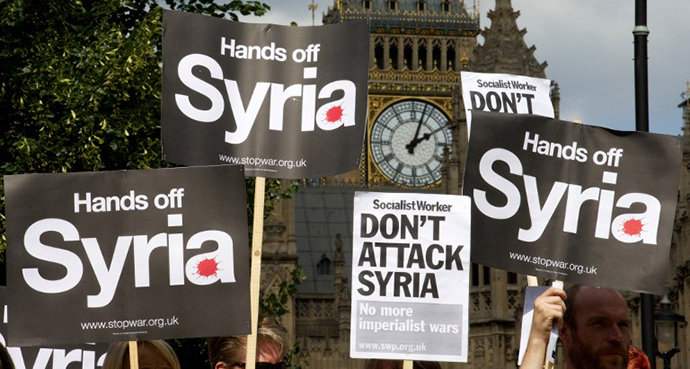
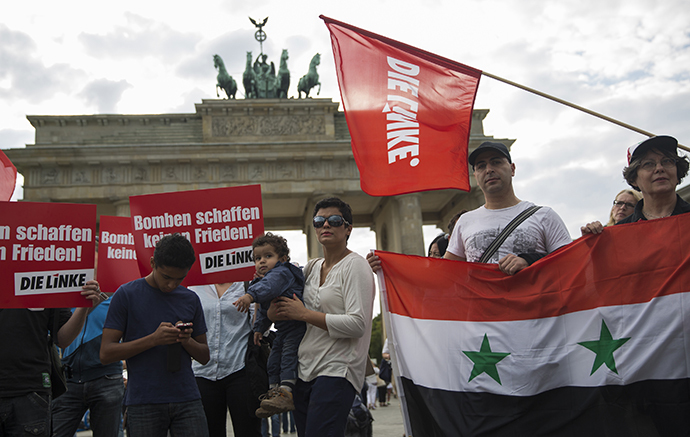
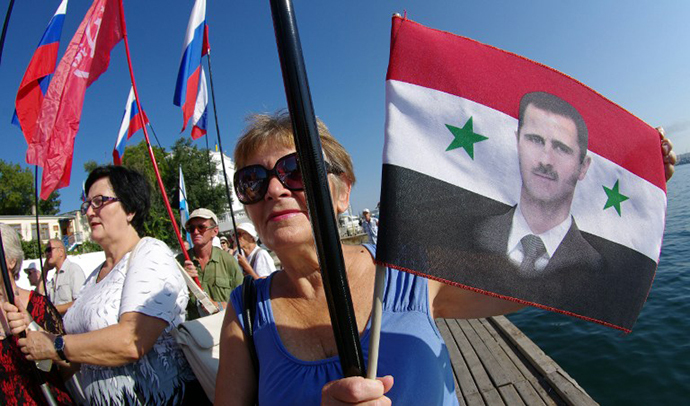
19:01 GMT: US officials have rejected comparisons of
the possible strike against Syria to the war in Iraq.
“We’re not considering analogous responses in any way… We are
not going to repeat the mistakes of the Iraq war,” US
State Department spokeswoman Marie Harf told reporters during
a daily briefing.
“Nobody is talking about a large-scale military
intervention,” Harf added, ruling out American “boots
on the ground” in Syria, as well as “any military options
aimed at regime change.”
The White House also asked not to draw analogies with
previous US involvement in the Middle East conflicts, or the
pre-Iraq war debate about intelligence on the weapons of mass
destruction.
The possible military response to Syria would be “very
discrete and limited,” and not an open-ended conflict
aimed at toppling Syrian President Bashar Assad, White House
Principal Deputy Press Secretary Josh Earnest
said.
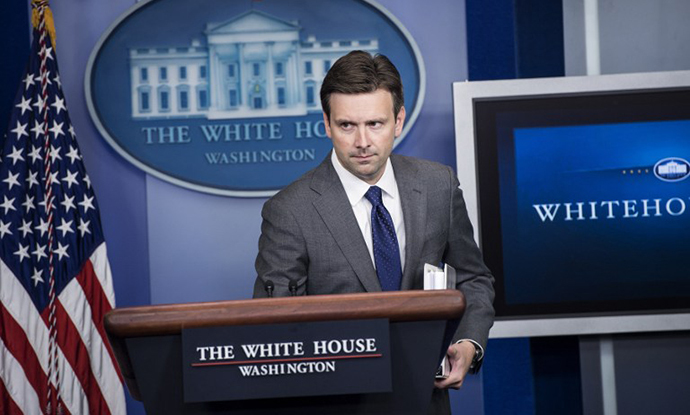
18:30 GMT: The US would provide its own legal
justification for a response to chemical weapons use in
Syria, if necessary, White House Principal Deputy Press
Secretary Josh Earnest said during a briefing.
“When the president reaches a determination about the
appropriate response... and a legal justification is required
to substantiate or to back up that decision, we’ll produce
one on our own,” the spokesman said.
He added that the US government is “disappointed” with
the Russian position in the UN Security Council, but that it
will not influence President Obama’s decision.
17:54 GMT:
Based on the White House briefing - the "evidence" the US is 'about to present' is completely circumstantial, hearsay. Outrageous #Syria
— Gayane Chichakyan (@Gayane_RT) August 29, 2013
17:43 GMT: China has spoken against military
intervention in Syria and urged other nations not to put
pressure on the UN investigation team.
“China supports the conduct of a fair, objective and
professionally done [UN] investigation without exertion of
any pressure from the outside,” Chinese Foreign Minister
Wang Yi said, calling all the sides to “refrain from
forecasting the results, let alone undertaking any kind of
actions.”
Wang Yi also stressed that the international community should
stick to diplomatic means when dealing with the conflict in
Syria, and pointed out that military intervention will only
worsen the Middle East crisis.
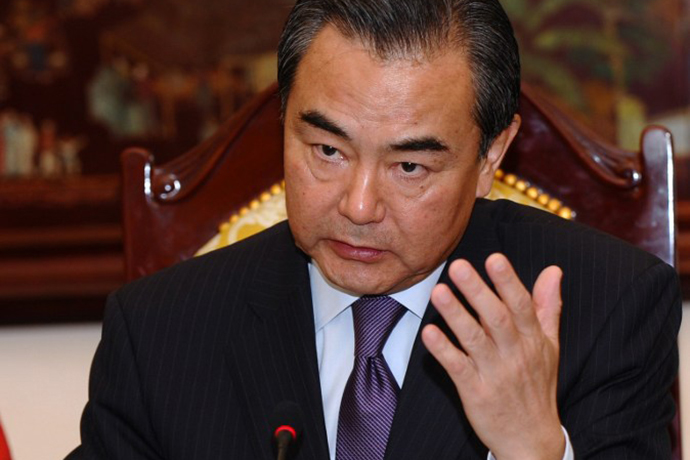
17:14 GMT: The UN investigators will return to Syria
and continue investigation of the use of chemical weapons
after reporting to UN headquarters, UN spokesman Farhan Haq
told reporters.
Meanwhile, the UN and Arab League envoy to Syria, Lakhdar
Brahimi, said the investigators have not yet determined what
substance was used in the alleged attack and are awaiting the
results of the analysis.
Brahimi refused to comment on reports of an imminent Western
strike on Syria, saying he has “no knowledge” of the
issue.
17:00 GMT: The five permanent members of the UN
Security Council will meet again Thursday to discuss the
alleged chemical weapons attack in Syria, Reuters cited a UN
diplomatic source as saying.
The meeting of Russian, Chinese, French, US and UK
representatives will take place at 18:30 GMT, the source said
on condition of anonymity.
The meeting was reportedly requested by Russia.
16:38 GMT: Canada’s Prime Minister Stephen Harper said
his government supports military in Syria over chemical
weapons, but that Canada had no plans to send troops.
Harper said there was a risk the alleged chemical weapons
attack could set an “extremely dangerous precedent” if
the international community did not act.
16:09 GMT: The US Navy has deployed a fifth destroyer
to the eastern Mediterranean ahead of a possible strike on
Syria, AFP cited a US Defense Department official as saying.
The USS Stout, a guided missile destroyer, has entered the
Mediterranean to relieve another ship, the USS Mahan, the
official said on condition of anonymity.
He added that both ships might remain in place for an
unspecified period of time.
Other US destroyers in the region – the USS Ramage, the USS
Barry and the USS Gravely – are ready to launch Tomahawk
missiles toward Syria should US President Barack Obama give
the order.
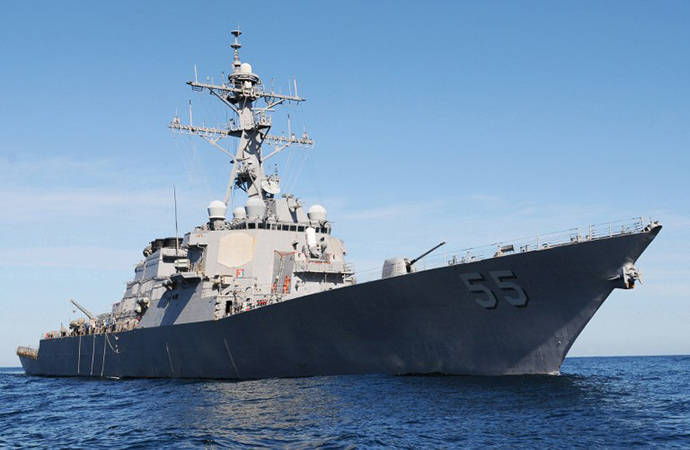
15:48 GMT: Italy will not join any military operation
against Damascus without authorization from the UN Security
Council, Italian Prime Minister Enrico Letta said.
While putting the blame for the alleged chemical weapons use
on the Assad regime in an interview with RAI state radio,
Letta stressed that Italy would not participate in a strike
against Syria “if the United Nations doesn’t back
it.”
15:27 GMT: Syrian Prime Minister Wael Nader al-Halqi
has announced the government has been mobilizing its
resources to preserve essential services in case of a
military attack by Western states.
“The government is striving to secure supplies of food,
medicine and services,” al-Halqi was quoted as saying by
the official SANA news agency, adding that Syria has “a
strategic supply of all materials.”
Al-Halqi said he had called for necessary measures “to
overcome any emergency situation and prevent enemies from
disrupting state services, especially electricity, drinking
water, communications, food and oil.”
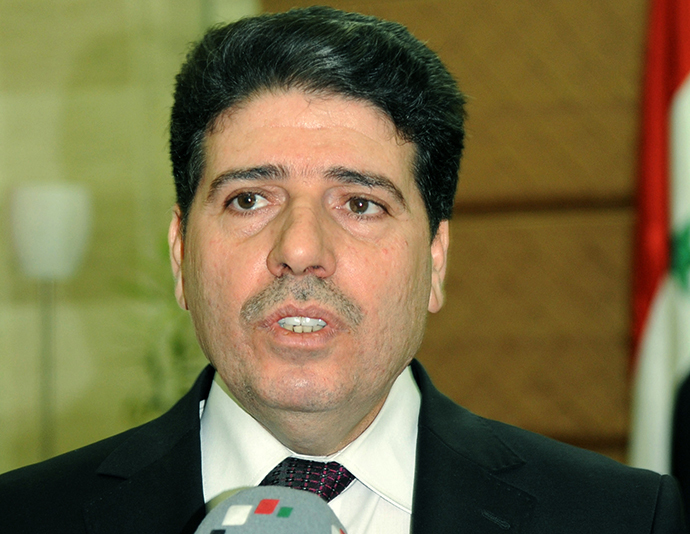
15:09 GMT: UK Prime Minister David Cameron said there
was “no 100% certainty about who is responsible” for
the use of chemical weapons in Syria, adding he was
personally convinced the regime is to blame, and that a
judgment still has to be made based on “understanding”
of the situation in Syria.
15:00 GMT: US members of Congress are set to be
briefed on the situation in Syria.
President Barack Obama’s National Security Adviser Susan
Rice, Director of National Intelligence James Clapper, US
Secretary of State John Kerry and US Secretary of Defense
Chuck Hagel are expected to participate in the
briefing.
14:45 GMT: Britain’s opposition leader, Ed Miliband,
urged the UK parliament not to “rush to judgment” when
deciding on possible military action against Syria.
“Evidence should precede decision, not vice versa,”
Miliband said.
Miliband, leader of the Labour Party, also said that the UN
Security Council should not be a “sideshow,” and that
international support was crucial for any military action.
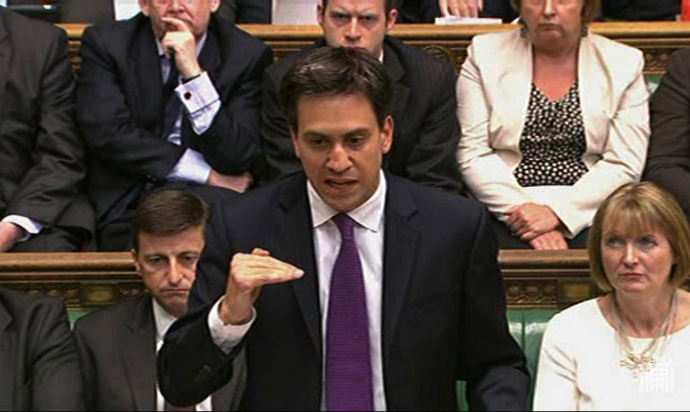
14:24 GMT: British Prime Minister David Cameron said it was “unthinkable” for the UK to launch military action against Syria if there was strong opposition in the UN Security Council.
However, Cameron then went on to justify a military operation
against Assad, saying that a strong response to the use of
chemical weapons would “only strengthen the political
process” leading to the solution of the conflict in
Syria.
14:18 GMT: The International Committee of the Red
Cross (ICRC) has warned that further escalation of the
conflict in Syria will only worsen the humanitarian crisis in
the war-torn country.
The ICRC said it was “appalled” by reports of chemical
weapons being used near Damascus.
According to Magne Barth, head of the ICRC delegation in
Syria “further escalation will likely trigger more
displacement and add to humanitarian needs, which are already
immense.”
The lack of medical supplies and personnel is already
resulting in deaths in the area around Damascus, Barth
said.
13:44 GMT: Britain’s Defense Ministry has confirmed
that six RAF Typhoon jets have been deployed to Cyprus as a
“prudent and precautionary measure.”
The interceptor aircrafts were sent to the UK airbase in
Akrotiri, Cyprus, “to ensure the protection of UK
interests and the defence of our sovereign base areas at a
time of heightened tension in the wider region,” the
ministry said in a statement.
“This is a movement of defensive assets operating in an
air-to-air role only. They are not deploying to take part in
any military action against Syria,” the statement
said.
13:35 GMT: People protesting against possible UK military involvement in Syria and media reporters have gathered around the British parliament building as MPs in the House of Commons start their debate of military action against Syrian President Assad.
#Syria#Syriastrike media and demonstrators await #parliament decision on Syria pic.twitter.com/TqY0dG9LNi
— Ki Price (@KiPricePhoto) August 29, 2013
13:24 GMT: Damascus is concerned that Syrian President
Bashar Assad may be targeted by a drone strike, Itar-Tass
quotes sources cited in the regional media as saying. The
Syrian government does not believe Western governments’
statements that they aren’t seeking to topple Assad’s regime,
one source said. Others have been reporting relocations of
troops and military hardware at military bases near Damascus
to minimize the possible losses in case of Western
airstrikes. Damascus has also reportedly beefed up security
at government buildings and the ruling party’s
offices.
13:09 GMT: Pope Francis and Jordan’s King Abdullah
have agreed that a peaceful dialogue among Syrians with the
backing of the international community is the “only
option” to resolve the conflict in Syria, the Vatican
said in a statement.
King Abdullah and Queen Rania reportedly flew to Rome
specifically to discuss the Syrian crisis with the Pope, and
had a 20-minute private conversation with His Holiness in the
Vatican on Thursday.

12:31 GMT: The UK government on Thursday published internal legal advice saying that it was legally entitled to launch a military strike against Syrian President Bashar Assad’s forces – even if the UN Security Council blocked such action.
The UK also revealed its intelligence material on the alleged
chemical weapons attack near Damascus last week, saying it
had no doubt the attack took place and that it was “highly
likely” that the Syrian government was behind it. The
government said it had “some intelligence” proving
Assad’s responsibility.
12:17 GMT: The UN inspectors will continue
investigating the use of chemical weapons in Syria in
accordance with the international agreement, UN Secretary
General Ban Ki-moon said.
Speaking in Vienna, Ban said he had asked that the UN
inspectors be “given a chance to continue their work in
accordance with the mandate approved by [UN] member
states.”
Ban also said he earlier discussed with US President Barack
Obama how the UN and US could work together “to speed up
the investigation process.”
He pledged that the full results of the investigation would
be distributed among UN member countries, and repeated his
call for a peaceful dialogue on Syria.

12:05 GMT: Russia’s Foreign Ministry has urged the UN
team investigating the alleged use of chemical weapons in
Syria to also investigate the sites of other alleged attacks.
Noting that the UN experts would deliver samples taken at the
site of the chemical weapons incident near Damascus to a
specialized laboratory in The Hague, ministry spokesman
Aleksandr Lukashevich said: “This should not interfere
with the completion of the investigation process in the
districts previously chosen in the framework of the agreement
between the Syrian authorities and the UN Secretariat on
August 13, 2013.”
11:29 GMT: Syrian President Bashar Assad said that his country would defend itself against any attack. "The threats of direct aggression against Syria will only increase our commitment to our deep-rooted principles and the independent will of our people. Syria will defend itself in the face of any aggression," Syrian state TV quoted Assad as telling a delegation of Yemeni politicians.

09:27 GMT: French President François Hollande said
that everything should be done to seek a political solution
to the Syrian crisis, Reuters reported.
09:03 GMT: The UN team investigating chemical weapons
attacks in Syria is set to leave the country early Saturday
and report immediately to UN Secretary-General Ban Ki-moon,
he said.
08:15 GMT: Russia is to send an anti-submarine ship
and a missile cruiser to the eastern Mediterranean in the
next few days, Interfax news agency cited military sources as
saying. The move is a planned rotation of vessels and there
are no plans to boost the Russian Navy’s presence in the
area, the source said. Russia’s Defense Ministry has not
confirmed the move, however.
06:20 GMT: Calls for military intervention in Syria
are an "undisguised challenge" to Charter of the
United Nations, the Russian Foreign Ministry
indicated.
05:50 GMT: Syrian government forces have retreated
from the airport zone in Damascus amid reports that the
families of Syrian military elite are evacuating to Lebanon.
Wednesday, August 28
22:07 GMT: US congressional representatives serving on intelligence committees feel President Obama has not properly consulted them regarding military action in Syria, sources in Congress told Reuters. One source said Senate Intelligence Committee Chairman Dianne Feinstein and House Intelligence Committee Chairman Mike Rogers have been given “very brief status updates.” Others have come forward to report that key conversations have taken place over non-secure phone lines, making it impossible to discuss confidential, yet crucial, information.
21:30 GMT: US Speaker of the House John Boehner has
written a letter to President Obama asking for
clarification on a host of questions ahead of any attack on
Syria.
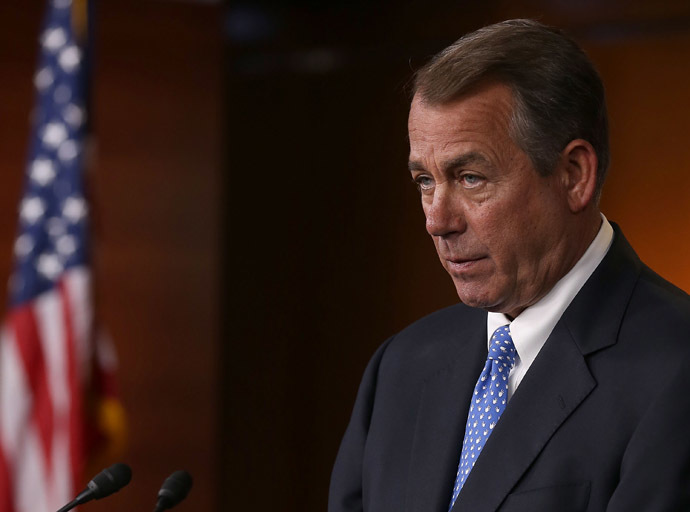
"Now, having again determined your red line has been crossed, should a decisive response involve the use of the United States military, it is essential that you provide a clear, unambiguous explanation of how military action – which is a means, not a policy – will secure U.S. objectives and how it fits into your overall policy."
20:35 GMT: Several hundred people have staged a
protest against a potential military intervention in Syria in
front of Downing Street in London on Wednesday. Called by the
Stop the War Coalition, the demonstrators demanded that the
UK government call a halt to preparations for a proposed
attack on Syria.
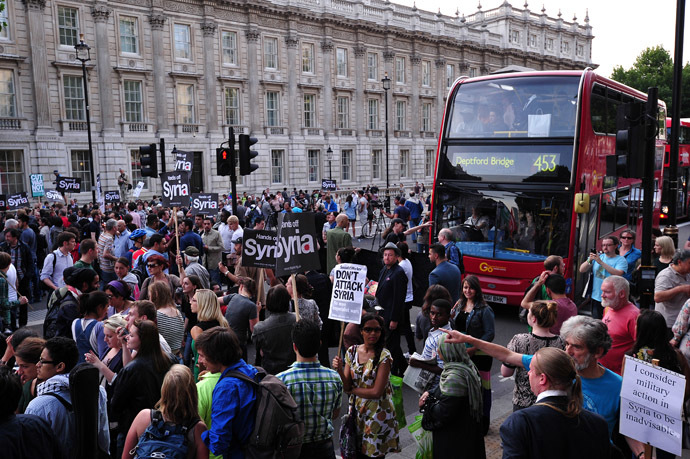
19:58 GMT: UK Prime Minister David Cameron and Chancellor Angela Merkel have agreed that Syria “cannot go unpunished,” the German government said in a statement.
“The Syrian regime must not hope to be able to continue
this warfare that violates international law ... Therefore an
international reaction is inevitable in the view of the
chancellor and the prime minister,” the statement said.

19:52 GMT: United Nations personnel may be evacuated
from Syria before the week is out in view of the possible
military operations by Western states, a source in the UN
Secretariat told Itar-Tass. According to the source,
“almost no” UN representatives will remain in Syria by
the end of this week. However, these measures do not concern
the UN peacekeepers in the Golan Heights, he
added.
19:36 GMT: Russian President Vladimir Putin and
Iranian President Hassan Rouhani had a phone conversation
over the situation in Syria, Putin’s spokesperson said in a
statement, adding that the call was initiated by Rouhani.
“Both sides consider the use of chemical weapons by anyone
intolerable,” the statement stressed.
The presidents agreed that in the view of the calls for
foreign military intervention in Syria a solution to the
crisis must be sought “through exclusively political and
diplomatic means.”
19:23 GMT: A motion in the UK parliament has been
called to let the UN Security Council see findings from
chemical weapons inspectors before backing any military
action in Syria.
“The United Nations Security Council must have the
opportunity immediately to consider that briefing and that
every effort should be made to secure a Security Council
Resolution backing military action before any such action is
taken,” a copy of the motion to be debated in the UK
parliament on Thursday was quoted by Reuters.
19:01 GMT: Russia has a right to veto in accordance
with the UN Charter, but it is premature to comment on voting
on the UK’s draft resolution on Syria, said Russian Deputy
Foreign Minister Gennady Gatilov.
He explained that the resolution is currently being
distributed by the “sponsors” of the document among
several UN member states, calling it a “common working
process.”
Such distribution is unofficial, thus it does not trigger a
formal 24-hour countdown for a vote after the introduction of
a resolution to the UN Security Council, Gatilov
said.
18:45 GMT: US State Department spokeswoman Marie Harf
said the US will not let Syria “hide behind” the
Russian veto in the UN Security Council against military
intervention.
“We do not believe the Syrian regime should be able to
hide behind the fact that the Russians continue to block
action on Syria at the UN and we will make our decision on
appropriate action going forward,” Harf told reporters.
She then questioned, whether UN Council was an effective
venue to deal with the Syrian conflict, citing previous
decisions by Russia to block resolutions on Syria.
18:00 GMT: UK Foreign Minister William Hague has
called the Russian Foreign Minister Sergey Lavrov to
“exchange views on the situation in Syria,” a Russian
Foreign Ministry spokesman told Itar-Tass.
Hague informed Lavrov of the draft UK resolution on the
alleged chemical weapon use in Syria, the spokesman said.
Lavrov then told his UK counterpart that the UN Security
Council should not consider a resolution on Syria before the
UN inspector team reports on the chemical weapons
use.
17:46 GMT: Russian UN representatives did not stage a
walk-out at the meeting of the five permanent members of the
UN Security Council, Itar-Tass reports citing Russia’s
permanent mission to the UN. The statement came in response
to earlier reports claiming that Russian and Chinese
diplomats “left” what was said to be a closed-door
discussion of the UK-drafted resolution on the alleged
chemical weapons use in Syria.
“The Russian representative went out when the meeting
ended. That was not a demarche. It is just that some of the
delegations did not leave for a long time,” the
diplomatic source was quoted as saying.
17:37 GMT: Syrian Ambassador to the UN Bashar Jaafari
said he had requested UN Secretary General Ban
Ki-moon that the UN team investigating an alleged use of
chemical weapons to also investigate “three more locations
where the Syrian soldiers inhaled the nerve gas” last
week on the outskirts of Damascus.
Jaafari also accused the US, the UK and France of undermining
the UN investigation, as well as of arming the insurgents,
who are attempting to topple the Syrian President Bashar
Assad.
“They are behind arming and supplying the armed terrorists
groups with all kind of logistical support, as well as with
weapons,” Jaafari said, adding that the current
“threat of using force… has only one goal – undermining
the mission of the investigation team.”
The Syrian government “is against the use of chemical
weapons by all means,” the envoy stressed, calling the
attacks “a moral obscenity” and saying that Syria
wants “those who committed this crime to be held
accountable.”
16:44 GMT: Syria has warned the Western powers against
a military intervention in Syria, with Prime Minister Wael
Nade Al-Halqi saying it will “surprise” the offending
countries.
Syria will “surprise the aggressors as it surprised them
in the war of 1973 when Arab forces caught Israel off guard
and became the graveyard of the invaders,” Al-Halqi said.
He added that the Western countries’ “colonialist
threats” will not “terrorize” the Syrian
government.
16:20 GMT: The five permanent members of the UN
Security Council (UNSC) – Russia, China, France, the US and
the UK – have discussed the alleged chemical weapons use in
Syria behind closed doors. The Western powers are expected to
present the UK-drafted resolution on the attack to the UNSC
later on Wednesday, according to Itar-Tass.
15:47 GMT: China’s Foreign Ministry has advised
Chinese citizens to refrain from traveling to Syria, citing
escalating tensions in the country. A statement published on
the ministry’s website also advised Chinese citizens
remaining in Syria to exercise caution, stay in contact with
the Chinese embassy and to leave the country “as soon as
possible.”
15:29 GMT: Turkey has put its armed forces on alert ahead of a possible Western missile strike against Syria, Turkish Foreign Minister Ahmet Davutoglu said.
“We are now at a more alert position... Turkey will take whatever measures necessary within the framework of its own strategic interests,” Davutoglu said, adding that “all options” remained open on the possible international action.
15:18 GMT: No concrete decision on possible military action against Syria was taken at the NATO Council meeting in Brussels on Wednesday, Itar-Tass reports.
After the meeting, NATO Secretary General Anders Fogh Rasmussen said NATO condemned the alleged August 21 chemical attack in Syria, and said that “information available from a wide variety of sources points to the Syrian regime as responsible for the use of chemical weapons in these attacks.”
“This is a clear breach of longstanding international
norms and practice. Any use of such weapons is unacceptable
and cannot go unanswered. Those responsible must be held
accountable,” Rasmussen said.
#NATO Allies discussed #Syria, condemn in strongest possible terms outrageous #CW attacks around Damascus
— AndersFogh Rasmussen (@AndersFoghR) August 28, 2013
#NATO Allies will continue to consult/ keep situation in #Syria under close review/ continue to assist #Turkey
— AndersFogh Rasmussen (@AndersFoghR) August 28, 2013
15:08 GMT: The Russian Embassy in Syria has opened a
24-hour hotline for any Russian citizens remaining in the
country. Russians who find themselves in a “difficult
situation” can call the number 099-124-09-99, the embassy
said in a statement on its website.
14:35 GMT:
Britain’s National Security Council (NSC) has agreed the
“world should not stand idly by” after the
“unacceptable use” of chemical weapons in Syria, Prime
Minister David Cameron said. The NSC has blamed the
government of Bashar Assad for the attack.
The NSC agreed unanimously that the use of chemical weapons by Assad was unacceptable - and the world should not stand by.
— David Cameron (@David_Cameron) August 28, 2013
14:29 GMT: A report by Bloomberg citing an unnamed UN official has claimed that Syrian President Bashar Assad’s brother Maher is suspected of authorizing the use of chemical weapons in the August 21 incident. Assad’s younger brother, who commands the Syrian Republican Guard and the Army’s 4th Armored Division and is portrayed in the report as a “shadowy figure,” may have allegedly ordered the attack without the president’s consent. Should Maher Assad be found a culprit of this “brash action,” a Republican Guard stronghold may become the target of the Western missile strike instead of the presidential palace, the official reportedly said.
14:20 GMT: A spokesman for Russia’s Foreign Ministry said that UN Secretary General Ban Ki-moon and Russian Deputy Foreign Minister Gennady Gatilov met in The Hague to discuss the UN probe of the alleged chemical weapons use in Syria, as well as the preparations to the Geneva-2 peace conference.
13:58 GMT: Israel’s armed forces are deploying all of
their missile defenses as a precaution against possible
Syrian retaliatory attacks in case Western powers carry out a
strike on Syria, Israeli Army Radio reported Wednesday.
“In light of the recent occurrences in the region, the IDF is
taking the necessary defense measures to safeguard the state
of Israel,” Reuters reported a spokesman for the Israel
Defense Forces (IDF) as saying.
Neither did elaborate on which military deployments are
taking place.
13:54 GMT: Iraq has put its security forces on high
alert ahead of an expected strike on Syria, Iraqi Prime
Minister Nuri al-Maliki said.
“All political and security powers in Baghdad, the
provinces and all over Iraq, are being put on the highest
level of alert,” Reuters reported al-Maliki as saying in
a televised statement Wednesday.
13:45 GMT: Damascus has handed over proof to UN
inspectors that Assad’s regime did not deploy chemical
weapons, Syrian Deputy Foreign Minister Faisal Al-Mikdad told
reporters Wednesday.
“Syrian government forces have never used chemical weapons –
such claims are just a pretext. We have proof of this, which
we passed to the inspectors of the UN commission,”
Al-Mikdad said.
12:08 GMT: Missile strikes against Syria could lead to
chemical weapons getting into the wrong hands, said Alexander
Yakovenko, Russia’s ambassador to the UK.
11:49 GMT: Russia’s Foreign Ministry said it was too
soon to discuss measures against Syria by the UN Security
Council before the UN investigators report on the alleged
chemical weapons attack.
11:17 GMT: Saudi Arabia’s armed forces have been
placed on high alert amid widespread expectations that
Western governments are planning to carry out a military
strike against Syria in the coming days.
11:14 GMT: The French parliament is to hold an
extraordinary session later Wednesday to discuss the
situation in Syria, Reuters cited government spokeswoman
Najat Vallaud-Belkacem as saying. "The president has taken
the decision to summon parliament on Wednesday to assess the
situation in Syria," she said after a Cabinet
meeting.
10:59 GMT: German Foreign Minister Guido Westerwelle
urged members of the UN Security Council, including Russia,
to back the UK resolution on Syria expected to be proposed
later Wednesday. The resolution will condemn the chemical
weapon attacks allegedly carried out by the Assad government
and authorize “necessary measures” to protect
civilians.
10:32 GMT: The UN’s Syria envoy, Lakhdar Brahimi, said
that international law is clear that a Security Council
resolution is required for military action.
10:16 GMT: American and British warships deployed in
the eastern Mediterranean may carry out a strike on Syria
using cruise missiles as soon as in the early hours of
Friday, according to Fox News quoting unknown military
sources.
9:40 GMT: Israeli intelligence has reportedly
intercepted a conversation between Syrian officials
concerning the use of chemical weapons, an unnamed former
Mossad official told German magazine Focus. The content of
the conversation was relayed to the US, the ex-official
underlined.
9:20 GMT: The UK has drafted a resolution condemning
the chemical weapons attack allegedly carried out by Bashar
Assad forces and authorizing "necessary measures" to
protect civilian population. The document is to be presented
later on Wednesday at a meeting of the five permanent members
of the Security Council in New York.
9:16 GMT: UN Secretary-General Ban Ki-moon has said
that the UN inspection team in Syria needs “time to do its
job.”
7:37 GMT: An al-Qaeda linked group has threatened a
‘volcano of revenge’ against the Syrian government and
military targets in retaliation for the suspected chemical
weapons attack in a Damascus suburb last week, Reuters
reports.
"The meeting factions decided to carry out the "Volcano of
Revenge" invasion in response to the regime's massacres
against our people in Eastern Ghouta, the last of which was
the chemical weapons massacre," the SITE Monitoring Group
quotes a statement from a branch of the Islamic State in Iraq
and the Levant (ISIL) as saying.
"They have decided to strike the main joints of the regime
in imprisoned Damascus, including security branches, support
and supply points, training centres, and infrastructure,"
it continued.
The August 26 statement followed a meeting between the ISIL
and eight Syrian factions.
05:45 GMT: David Cameron and Barack Obama have
discussed the Syrian crisis in a phone conversation. It comes
amid the UK and the US considering intervention into the
country over the allegations that the Syrian authorities used
chemical weapons against the population – something the
Bashar Assad government denies.
03:12 GMT: Foreign Policy Magazine reports that US
intelligence has intercepted communication that allegedly
proves that government forces used nerve agent in the attack
in Damascus last Wednesday. The publication claims that after
the attack an official at the Syrian Ministry of Defense
“exchanged panicked phone calls with a leader of a
chemical weapons unit, demanding answers for a nerve agent
strike." The publication speculates that this is the
evidence which makes the US and its allies certain that Assad
troops were responsible for the attack.
00:34 GMT: A powerful explosion has reportedly rocked
central Damascus. There was no immediate information of any
casualties.
Tuesday, August 27
23:42 GMT: Jordanian authorities have reportedly begun
evacuating residents from the border areas with Syria.
22:16 GMT: The Syrian Electronic Army has gained
access to a number of international domains including those
belonging to Twitter, the New York Times and Huffington Post
UK. As a result of an attack on Melbourne IT registry, the
SEA managed to alter both contact details and domain name
servers. The Times’ website was brought down for several
hours.
21:32 GMT: Venezuelan President Nicolas Maduro has
warned that military intervention in Syria could lead to a
"disastrous war," and questioned the Syrian
government’s responsibility for the alleged chemical attack.
“We’re on the brink of the beginning of an open war against
Syria. We’re not going to abandon the Syrian people,” he
said.
21:00 GMT: A Russian Emergencies Ministry’s plane has
departed from Syria with 89 passengers on board, mostly women
and children, who expressed a desire to leave the country.
20:26 GMT: At least ten people have been killed,
according to Syria's opposition when government forces used
phosphorus bombs and napalm in Aleppo on Monday. "Assad's
military aircraft have hit populated areas with
internationally prohibited phosphorus bombs and napalm,"
the opposition coalition said in a statement. Dozens more
have been injured, Reuters reports.
19:58 GMT: Russian Foreign Minister Sergey Lavrov and
US Secretary of State John Kerry have discussed in detail the
situation in Syria. The phone conversation was initiated by
the American side, the Foreign Ministry said in statement
published on its website.
Kerry voiced his stance about the alleged chemical attack,
which, he stated, was based on information from reliable
sources. He blamed the Assad government for the incidents
where chemical weapons were used.
Lavrov reiterated Moscow’s position that conclusions should
be based only on expert analysis. He underlined that the work
of the group of UN investigators in Syria should get “maximum
support.”
19:48 GMT: A top UN official visiting Iran for the
past two days has urged it to help bring the warring sides of
the Syrian conflict to the negotiating table in Geneva, said
the UN.
Under-Secretary-General for Political Affairs Jeffrey Feltman “shared the U.N. position that Iran, given its influence and leadership in the region, has an important role to play and a responsibility in helping to bring the Syrian parties to the negotiating table," said U.N. spokesman Farhan Haq.
Feltman discussed with Iranian officials, including Foreign
Minister Mohammad Javad Zarif, "the worsening situation on
the ground in Syria, including the U.N.'s grave concerns
about the potential use of chemical weapons and how the U.N.
can work together with Iran and other states to end the
bloodshed and suffering of the Syrian people."
18:28 GMT: French President Francois Hollande will
meet with the head of Syria's main opposition group Ahmad
al-Jarba on Thursday, said the presidency, AFP
reported.
17:38 GMT:
Turkish PM Erdogan and British PM Cameron talk on phone to discuss details of the Syria campaign.
— Mahir Zeynalov (@MahirZeynalov) August 27, 2013
17:35 GMT: US President Barack Obama and Canadian
Prime Minister Stephen Harper have agreed that the use of
chemical weapons in Syria deserved a “firm response”
from the international community, a spokesman for Harper said
in a statement.
“Both leaders agreed that significant use of chemical
weapons merits a firm response from the international
community in an effective and timely manner,” the
statement read.
17:17 GMT: The US will release a public version of an intelligence report on chemical weapons use in Syria “in the coming days,” White House spokesman Jay Carney said. He added that the options the US government is considering “are not about regime change” in Syria, but will come as a response to the “violation of an international norm.”
“A decision about the use of military force has not been
made. The president is reviewing his options, plural,”
the White House spokesman said.
16:33 GMT: French President Francoise Hollande has
announced he will hold a defense council meeting on
Wednesday, and that he will brief the French parliament about
it.
16:23 GMT: UK Prime Minister David Cameron has called
for “specific” military action against Syria, saying
the UK is not considering getting involved in a Middle East
war.
Cameron said no decision has yet been taken on possible
responses to the alleged use of chemical weapons in Syria.
However, he added that the world “should not stay idlyby,” following what he said was a chemical weapons
attack by the Assad regime.
16:04 GMT: Britain “is not seeking to topple Assad,” UK Deputy Prime Minister Nick Clegg was quoted as saying by AFP.
“What we're considering is a serious response... What
we're not considering is regime change, trying to topple the
Assad regime,” Clegg said
15:57 GMT: Russian Deputy Prime Minister Dmitry
Rogozin has criticized the actions of Western countries in
the Islamic world, amid reports of pressure building for a
military strike against the government of Syrian President
Bashar Assad.
“The West is behaving toward the Islamic world like a monkey
with a grenade,” Rogozin wrote on his Twitter page, using
a farcical Russian expression that describes something
unpredictable and dangerous.
Rogozin is known for using colorful impromptu language on his
Twitter account, which he started tweeting from when he was
Russia’s ambassador to NATO in Brussels.
15:31 GMT: French President Francoise Hollande said France is “ready to punish” those behind the “chemical massacre” in Syria, and said that his government believes Damascus carried out the attack.
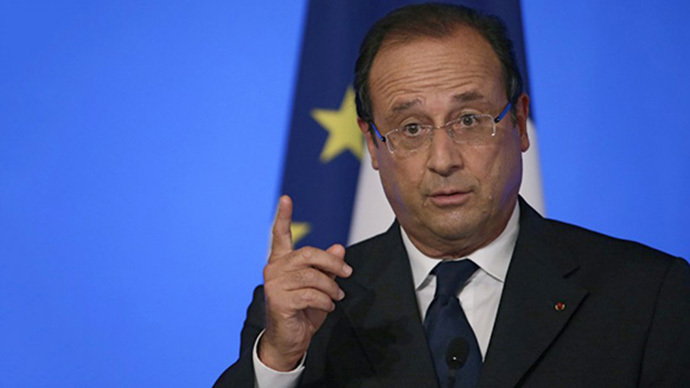
France is going to increase military support to the Syrian
opposition, the president said, addressing foreign
ambassadors in Paris.
“International law must evolve with the times... I
recognize the responsibility to protect civilians,”
Hollande was quoted as saying by France 24.
14:56 GMT: NATO supports the ongoing investigation of
the UN inspectors, but will continue to closely monitor
developments and review the evidence that is presented both
by the UN and from “other sources,” a NATO official
said in an e-mail statement to RT. NATO member countries are
“deeply concerned by mounting evidence of the use of
chemical weapons in Syria,” the official said, adding
that NATO “has consistently expressed its grave concern
about Syria’s chemical stockpiles and any possible use of
chemical weapons by the Syrian regime.”
14:44 GMT: US President Barack Obama has not yet made the decision to take military action against the Syrian government in response to the alleged chemical weapons attack, a senior White House administration official told Reuters.
US officials say an attack is unlikely while the U.N. team of inspectors remains in #Syria — and it's not scheduled to leave until Sunday
— Lucy Kafanov (@LucyKafanov) August 27, 2013
14:39 GMT: Israeli Prime Minister Benjamin Netanyahu
said that Israel is not involved in Syrian conflict, but
would respond with force to any attacks coming from Syria.
“We are not a party to this civil war in Syria but if we
identify any attempt to attack us we will respond and we will
respond forcefully,” Netanyahu said after holding
security consultations in Tel Aviv, adding that Israel is
“prepared for any scenario.”
14:34 GMT: France's government believes that there is
“no doubt” a chemical attack took place in Syria, and
that President Assad’s forces were behind it, a diplomatic
source told Reuters.
14:19 GMT:
syrian rebels say reports of tons of new advanced weapons false, but that new ammo has arrived. #syria
— Richard Engel (@RichardEngel) August 27, 2013
14:06 GMT: The Arab League said the perpetrators of last week’s attack in Syria should face international justice, and urged the UN to act. The League said in a statement it holds Syrian President Bashar Assad responsible for the alleged chemical attack near Damascus. The statement, which was issued after a meeting in Cairo, was pushed through with strong backing from Saudi Arabia and Qatar, diplomatic sources told Reuters.
13:46 GMT: A Russian cargo plane carrying humanitarian
aid has landed in Syria, the Russian Emergency Situations
Ministry said. The plane, which delivered some 20 tons of
food aid to the Mediterranean port city of Latakia, will also
evacuate 180 citizens of former Soviet countries “who have
made clear a desire to leave the country,” including 100
Russians, the ministry added.
13:13 GMT:
JUST IN: American missile strikes against Syria could come 'as early as Thursday,' US officials say http://t.co/cM8D9H0jfa
— NBC News (@NBCNews) August 27, 2013
12:41 GMT: A UN spokesperson has announced that the
planned visit to the site of last week’s alleged chemical
weapons attack has been postponed over “safety fears.”
UN chemical weapons team in #Syria decides to postpone site visit by one day to improve preparedness and safety: http://t.co/FFDJOj54UQ
— UN Spokesperson (@UN_Spokesperson) August 27, 2013
12:29 GMT: The US is ready to act immediately, should President Barack Obama order military action against Syria, Defense Secretary Chuck Hagel said in a television interview with the BBC on Tuesday.
“We have moved assets in place to be able to fulfill and
comply with whatever option the president wishes to
take,” Hagel said during a trip to Brunei, adding
that the military was ready to respond “just like
that.”
12:26 GMT: Russia on Tuesday warned that military intervention in Syria could have “catastrophic consequences” for the whole region and called on the international community to show “prudence.”
“Attempts to bypass the Security Council, and once again to create artificial groundless excuses for a military intervention in the region, are fraught with new suffering in Syria and catastrophic consequences for other countries of the Middle East and North Africa,” Russian Foreign Ministry spokesman Alexander Lukashevich said in a statement.
“We call on our American partners and all members of the
world community to demonstrate prudence [and] strict
observance of international law, especially the fundamental
principles of the UN Charter,” he said.
12:20 GMT: Western powers have told the Syrian opposition a strike is to be expected within days, sources who attended a meeting between Western envoys and the Syrian National Coalition told Reuters. The Syrian opposition has already provided Western governments with a list of suggested targets for missile strikes, they said. According to the sources, such strikes would aim to deter further chemical attacks. Despite the impending attack, the Syrian opposition was advised by Western governments to prepare for the proposed Geneva-2 peace conference, the sources said.
“The opposition was told in clear terms that action to
deter further use of chemical weapons by the Assad regime
could come as early as in the next few days, and that they
should still prepare for peace talks at Geneva,”
one of the sources was quoted as saying.
12:07 GMT: Britain’s parliament will be recalled
Thursday to vote on the UK’s government’s response to the
alleged chemical weapons attack in Syria, Prime Minister
David Cameron said.
British armed forces are preparing an emergency plan in case
of armed response to the attack, Downing Street has announced
Tuesday.
“The international community must respond” to the
incident in Syria, Cameron’s spokesman said.
Speaker agrees my request to recall Parliament on Thurs. There'll be a clear Govt motion & vote on UK response to chemical weapons attacks
— David Cameron (@David_Cameron) August 27, 2013
11:56 GMT: NATO countries will discuss the situation
in Syria at the alliance’s headquarters in Brussells, Italian
Foreign Minister Emma Bonino has announced.
Any military strike against Syria must first be authorized by
the UN Security Council, Bonino stressed.
“Italy will not take active part in any military action...
beyond the context of the Security Council, which for us is
and remains the only point of legal reference that cannot be
ignored,” the minister said.
11:44 GMT: Jordan will not be used as a
“launchpad” for military intervention in Syria, a
senior Jordanian government official told AFP after a meeting
of Western and Muslim army chiefs in Amman.
“Jordan’s position has not changed. Jordanian territory
will not be used as a launchpad for any military action
against Damascus,” the official said on condition of
anonymity, referring to Amman’s repeated calls for political
solution in Syria.
There won’t be any public announcement of the results of the
talks in Jordan “because of the nature of the
meeting,” the official added.
11:00 GMT: UN Secretary General Ban Ki-moon urged all
sides in Syrian conflict to “give safe passage and
access” to the UN chemical weapons investigation team.
10:17 GMT: Syrian Foreign Minister Walid Muallem
said that “no country in the world
uses weapons of mass destruction against its own people,”
in a press conference in Damascus. He denied claims that the
Syrian government had delayed the UN inspectors’ probe of the
Ghouta site.
“UN team did not ask to go to site until Saturday,”
said Muallem, stressing that government permission was
granted on Sunday.
He described the use of chemical weapons as an excuse for
foreign powers to intervene and warned Syria would retaliate
if attacked.
“We have two options: either to surrender, or to defend
ourselves with the means at our disposal. The second choice
is the best: we will defend ourselves,” the minister
said.
10:00 GMT: British Prime Minister David Cameron has said that any decision on Syria will be taken under a “strict international framework.” Cameron’s words appeared to contradict a statement made Monday by his foreign secretary, William Hague, who told the BBC that the international community could intervene in Syria without the unanimous backing of the UN Security Council.
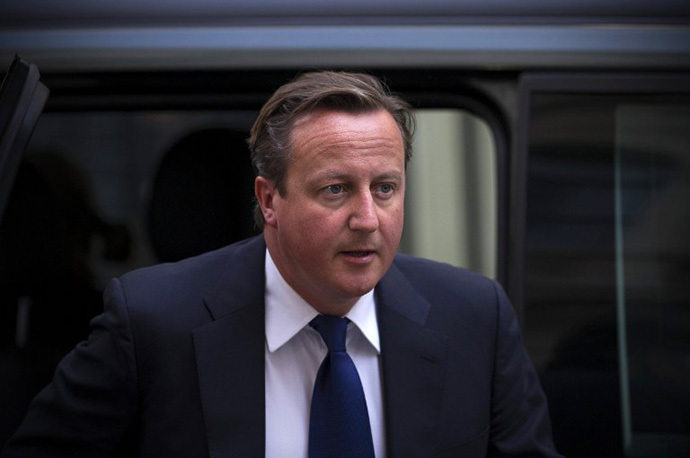
09:50 GMT: Turkish Foreign Minister Ahmet Davutoglu has decried last week’s supposed chemical attack in the Damascus suburb of Ghouta as “a crime against humanity.”
"This is a crime against humanity and a crime against humanity should not go unanswered, what needs to be done must be done. Today, it is clear the international community is faced with a test," Davutoglu told reporters.
09:45 GMT: Foreign Affairs Committee chairman of the Russian Duma, Aleksey Pushkov posted on his Twitter, alleging the US had already made the decision to strike Syria and they had gone too far.
“The decision for a massive military strike on Syria has basically already been made. The US has gone too far with its rhetoric to go back now,” wrote Pushkov.
09:30 GMT: Moscow has voiced “regret” over a US decision to put off bilateral talks over Syria. Russia has sought to placate calls for military action over the alleged use of chemical weapons, saying there is no evidence of the Assad regime’s complicity.
Russian Deputy Foreign Minister Gennady Gatilov tweeted a response to the move Tuesday morning, expressing concern over Washington’s decision.
“It is a pity that our western partners have decided to cancel the bilateral US-Russian meeting to discuss calls for an international conference on Syria,” Gatilov wrote on Twitter.
Russian and American officials had been scheduled to meet in
The Hague on Wednesday for bilateral talks on the Syrian
conflict.
09:19 GMT: The US' Ambassador to the UN, Samantha Power, voiced her condemnation of Wednesday's supposed attack.
Haunting images of entire families dead in their beds. Verdict is clear: Assad has used CWs against civilians in violation of int'l norm.
— Samantha Power (@AmbassadorPower) August 27, 2013
Monday, August 26
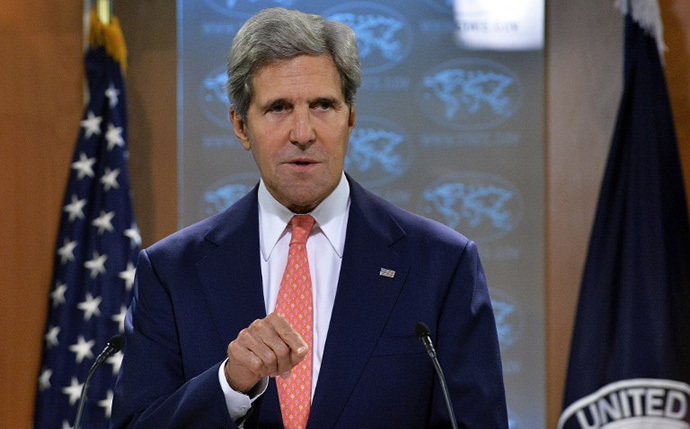
18:56 GMT: Secretary of State John Kerry said on
Tuesday that the Obama administration is "all but
certain" that the Syrian government used chemical weapons
to attack innocent civilians.
“While investigators are gathering additional information on
the ground, our understanding of what has already happened in
Syria is grounded in facts, informed by conscious and guided
by common sense,” Sec. Kerry said. “The reported
number of victims, the reported symptoms of those who were
killed or injured, the first-hand accounts from the
humanitarian organizations on the ground... these all
strongly indicate that everything these images are already
screaming at us are real: that chemical weapons were used in
Syria.”
“Moreover, we know that the Syrian regime maintains
custody of these weapons,” Kerry added.
Kerry further said the reports “should shock the
conscience of the world,” adding that the indiscriminate
slaughter of women and children carried out by the Assad
regime constitutes a “moral obscenity.”
President Barack Obama has yet to make a determination about
how the US will respond, Kerry said, but a decision would be
forthcoming. The US has already mobilized warships in the
Mediterranean Sea which may begin striking Syrian target upon
permission from Washington.
18:30 GMT: Russian President Vladimir Putin told British Prime Minister David Cameron that Russia has no evidence of whether a chemical weapons attack took place in Syria or who would be responsible if one did.
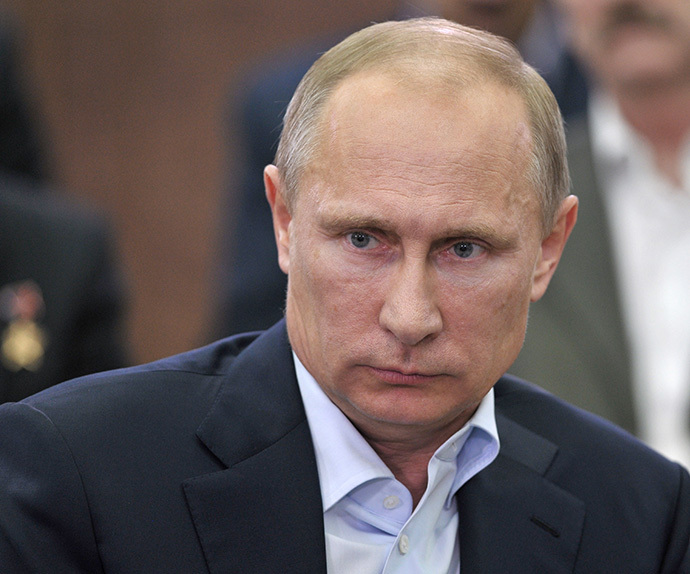
The two leaders had an urgent phone call on Monday afternoon
regarding the Syrian crisis in the wake of a sniper attack on
UN chemical inspectors outside Damascus, according to
Cameron’s official website.
17:00 GMT: Turkish Foreign Minister Ahmet Davutoglu said Turkey would participate with any international coalition moving against Assad if the United Nations failed to draft sanctions against Syria in response to the alleged chemical weapon attack.
Davutoglu said that while acting within the framework of the
UN was a top priority, the country would join a coalition if
no United Nations mandate was forthcoming, he said in
comments published in the Milliyet daily.
He added that around three dozen countries were currently
discussing options.
16:00 GMT: On Monday, US Defense Secretary Chuck Hagel said any action taken against Syria would only be done in concert with the international community and within a legal framework, Reuters reports.
Hagel, speaking to reporters during a trip to Indonesia, refused to comment on military options being mulled by the White House or if a military response was forthcoming.
A senior US official said Hagel would reach out to his British and French counterparts to discuss the situation in Syria.
Germany also implied for the first time that it would support an international military response against Syria if it were confirmed that Syrian government forces deployed chemical weapons last week.
Chancellor Angela Merkel’s spokesman Steffen Seibert said Monday that if the UN team confirmed the Syrian government’s deployment of chemical weapons, “it must be punished.”
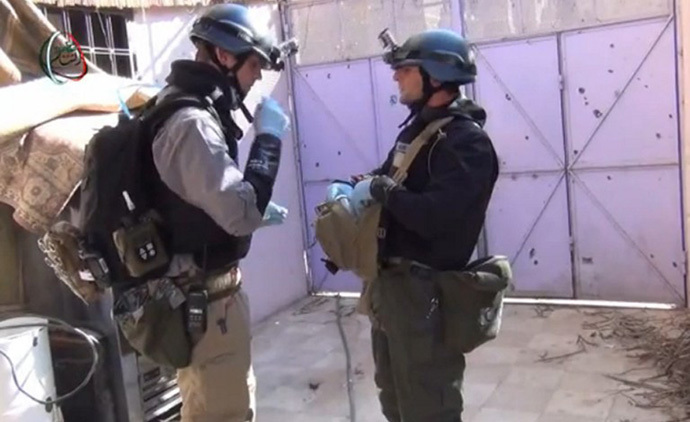
Seibert says the government has “very clear evidence that this was a chemical weapons attack.” He would not elaborate on what kind of response would be warranted, although he did not rule out the use of force.
Foreign Minister Guido Westerwelle also said that if an
attack is confirmed, “Germany would be among those who
consider consequences to be appropriate.”
15:57 GMT: The Syrian National Coalition, the official
opposition to President Bashar Assad, has called off the long-delayed peace summit
in Geneva, following an alleged chemical attack last week.
“We refused to speak about Geneva after what's happened.
We must punish this dictator, Bashar the Chemist we call him,
and then we can discuss Geneva," coalition Secretary
General Badr Jamous told Reuters in Istanbul.
The Syrian National Coalition was meeting with international opposition backers Friends of Syria in Istanbul, nominally to discuss the upcoming peace talks.
Opposition leaders have blamed Bashar Assad for unleashing Wednesday’s chemical assault on a rebel-controlled Damascus suburb, which Doctors without Borders (MSF) says took at least 355 lives.
14:08 GMT: There is no evidence that the Syrian government ordered the recent massacre with chemical weapons, but the West will blame it anyway because they want war, investigative journalist Neil Clark told RT.
Clark views the current situation in Syria as a replay of events leading up to the 2003 invasion of Iraq.
“They went in there [Iraq], they found no weapons, and yet we still had the war. In fact, they launched the war before the weapons inspection team could finish their job. It is a very similar scenario now in Syria,“ he argues.
Clark further characterized the latest developments in the Syrian conflict as a “charade.”
“We are going to see these inspection teams going to this
site and whatever they do the Syrian government will be
blamed for [it]. The US has made it quite clear and William
Hague has made that quite clear. They will blame the
Syrian government whatever the evidence or lack of evidence.
There is no evidence that the Syrian government ordered this
massacre with chemical weapons, they still are going to blame
them because they want war.”
11:47 GMT: UN experts set off from central Damascus on Monday to investigate the site of an alleged chemical weapons attack in a Damascus suburb, a day after the Assad government gave the “green light” to allow investigators access to the site.
A six-car convoy of chemical weapons experts wearing blue UN
body armor was accompanied by a car of security forces as
well as an ambulance, Reuters reports.
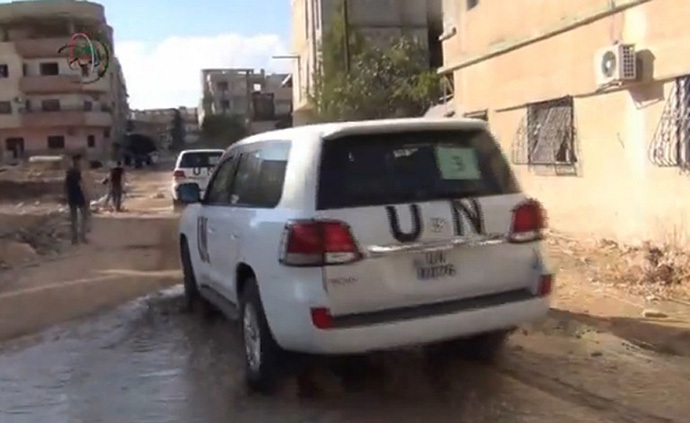
They said they were on their way to the rebel-held outskirts
of the Syrian capital known as Eastern Ghouta, the alleged
site of the world’s worst chemical attack in decades.
12:24 GMT: Russia’s Foreign Minister Sergey Lavrov has accused the West of engineering a campaign to facilitate military intervention in Syria.
“[Officially] Washington, London and Paris say they have incontrovertible evidence that the Syrian government is behind the chemical attack in Damascus, but they have not yet presented this evidence. Yet, they keep saying that the ‘red line’ has been crossed,” Lavrov said during an emergency press conference in Moscow.
“Now, we are hearing calls for a military campaign against Bashar Assad.”
Lavrov said that the US, Britain and other countries have
assembled a “powerful force” and are “readying their
ships and planes” for a possible invasion.
The minister said that the development set the world on a
"perilous path" and warned that “repeating the Iraqi and
Libyan scenario” and bringing in outside forces, would be a
“terrible mistake that will lead to more blood being
spilled”.
11:15 GMT: A UN inspection team was forced to return to a government checkpoint to replace their car after it came under sniper fire. The team had been dispatched to take soil samples near the site of an alleged chemical weapons attack in an eastern suburb of Damascus.
09:00 GMT: UK Foreign Secretary William Hague said a response to the use of chemical weapons in Syria could be forthcoming even without the unanimous consent of the UN Security Council, has said.
“I would argue yes it is, otherwise it might be impossible to respond to such outrages, such crimes, and I don't think that's an acceptable situation," Hague said on BBC radio, when asked whether it would be possible to respond to the use of chemical weapons without the backing of the UN Security Council.
Meanwhile, Britain’s Royal Navy is reportedly moving ships
into place for a possible strike with the US on Syria in the
next few days.
07:51 GMT: Syrian President Bashar Assad said claims that his
government has used chemical weapons made by Western
countries are “an insult to common sense” and
“nonsense.”
"The statements made by the politicians in the USA and in
other Western countries represent an insult to common sense
and neglect of the public opinion of citizens in those
countries. It’s nonsense: first, they bring charges, and then
they collect evidence. And it’s one of the most powerful
countries that does it – the US. They accused us on
Wednesday, and in only two days the American leadership
announces they started to collect the evidence.… They accuse
our army of using chemical weapons in the area that’s
reportedly controlled by the terrorists. In fact, there is no
precise front line between the army and the insurgents in
that area. And how can a government use chemical weapons – or
any other weapons of mass destruction – in the area where
government troops are concentrated? This is against
elementary logic," the Syrian leader said in an interview
with the Russian daily Izvestia.
Sunday, August 25
21:35 GMT: Although Washington does not know who is
behind the alleged chemical weapons attack in Syria, it is
“fixing the intelligence around the objective”, which
is to topple the Syrian government, anti-war activist Richard
Becker from the ANSWER coalition told RT.
“It’s almost incomprehensible to almost anybody, who thinks
logically that the Syrian government would launch a poison
gas attack at the very time the UN investigators are in the
country investigating an earlier reported use of nerve gas in
the country. So, we have really the US doing what it wants to
do, saying what it wants to say to try to mobilize public
opinion in the United States to justify potential
intervention,” he argues.
15:49 GMT: US President Barack Obama is headed down
the same path as his predecessor, George W. Bush, in his push
for a military solution in Syria, Foreign Affairs Committee
chairman of the Russian Duma, Aleksey Pushkov said.
“Obama is fiercely moving towards war in Syria, just like
Bush moved towards war in Iraq. Just like in Iraq, this war
won’t be legit and Obama will become Bush’s clone,”
Pushkov wrote on his Twitter page on Sunday.
Obama and UK Prime Minister, David Cameron, agreed in a phone
conversation on Saturday that last week’s alleged chemical
weapon attack near Damascus was “almost certainly” carried
out by Bashar Assad’s Syrian government.
13:39 GMT: The head of the Syria-based and Al-Qaeda linked Al-Nusa front has vowed unrestrained rocket attacks on Alawite communities, alongside attacks on President Bashar Assad’s government in revenge for an alleged chemical strike, according to a new recording.
“For every chemical rocket that had [has] fallen on our people in Damascus, one of their villages will, by the will of God, pay for it,” said Jabhat al-Nusra leader, Abu Mohammed al-Golani in the audio footage released on YouTube on Sunday. It was posted on a militant website which usually broadcasts the views of Al-Qaeda and similar extremist groups.
It simultaneously appeared on the group’s Facebook and Twitter accounts, suggesting that it was authentic. However, it could not immediately be verified for its authenticity.
“On top of that we will prepare a thousand rockets that will be fired on their towns in revenge for the Damascus Ghouta massacre,” al-Golani continued.
Assad’s government is largely comprised of Alawite Muslims – a branch of Shi’ite Islam whose villages’ al-Golani swore he would target. Alawites make up roughly 12 percent of Syria’s population.
12:56 GMT: On Sunday, the Syrian Foreign Ministry announced an agreement was “concluded in Damascus between the Syrian government and the United Nations during the visit of the UN high representative for disarmament, Angela Kane, to allow the UN team led by Professor Aake Sellstroem to investigate allegations of chemical weapons use in Damascus province.”
The agreement "is effective immediately".
Syrian authorities pledge to impose a ceasefire during the UN team inspection.
Russia has welcomed the move but has called on all the sides,
“trying to influence the results of the investigation in
advance”, not to “make tragic mistakes”.
11:50 GMT: Tehran has warned Washington not to cross “the red line” on Syria threatening it would have severe political consequences.
"America knows the limitation of the red line of the Syrian front and any crossing of Syria's red line will have severe consequences for the White House," the Iranian Fars news agency quoted deputy chief of staff of Iran's armed forces, Massoud Jazayeri, as saying.
Syrian authorities also warned the United States against any military intervention, saying this would "inflame the Middle East".
"US military intervention will create very serious fallout and a ball of fire that will inflame the Middle East," Information Minister Omran Zoabi told the Syrian state news agency, SANA.
The warning comes as Western officials stated they are
considering “a serious response” from the
international community to the alleged use of chemical
weapons in the Arab state.
05:07 GMT:Only 9 percent of Americans believe President Barack Obama should take action on Syria, while some 60 percent of Americans said the United States should not intervene in Syria's bloody civil war, a recent Reuters/Ipsos poll suggests.
According to the poll taken on August 19-23, 25 percent of Americans would back intervention if it is proven that the forces of Syrian President Bashar Assad used chemical weapons against civilians, while almost double that number – 46 percent – would still oppose such a move.
Saturday, August 24
15:23 GMT: Nearly 3,600 patients with neurotoxic symptoms
were treated in three Damascus hospitals on the day a toxic
gas attack was reported, say Doctors Without Borders (MSF).
355 patients were reportedly pronounced dead.
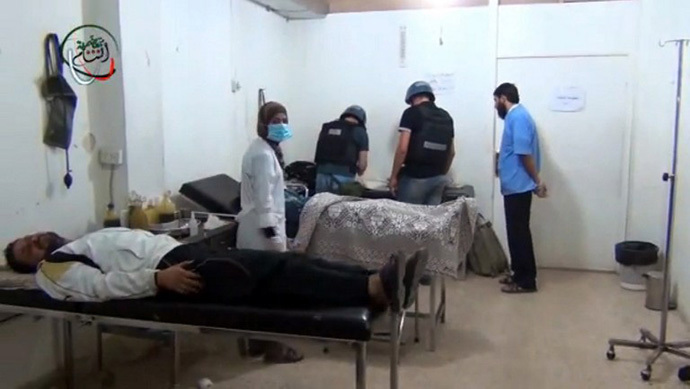
The international medical humanitarian organization said it received information from hospitals it has been supporting in Syria.
“Medical staff working in these facilities provided detailed information to MSF doctors regarding large numbers of patients arriving with symptoms including convulsions, excess saliva, pinpoint pupils, blurred vision and respiratory distress,” MSF director of operations, Dr. Bart Janssens said in a press-release published on the organization’s webpage.
However, MSF could not “scientifically confirm the cause of these symptoms”.
“The reported symptoms of the patients, in addition to the epidemiological pattern of the events—characterized by the massive influx of patients in a short period of time, the origin of the patients, and the contamination of medical and first aid workers—strongly indicate mass exposure to a neurotoxic agent,” Janssens says in the report.
10:12 GMT: Syrian rebels allegedly used chemical weapons against
government forces in the Damascus suburb of Jobar, where
soldiers reportedly discovered toxic poisoning antidotes, the
Syrian state news agency SANA reports.
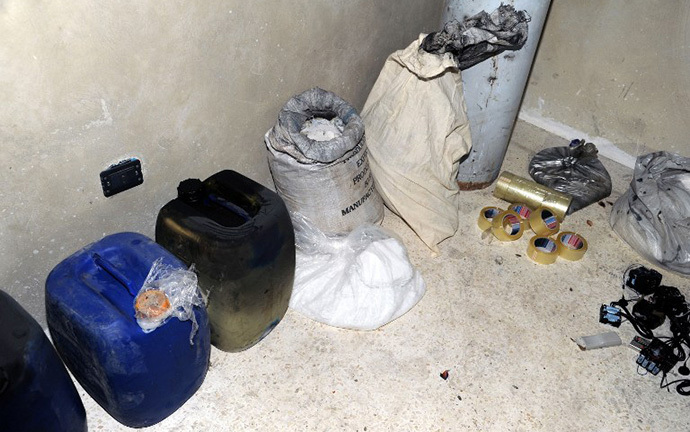
The agency, citing an “official source”, further said cases of suffocation were reported among soldiers in the area.
The source told the agency that army unit pushed into the area, where soldiers were attacked, and seized a warehouse containing material labeled 'Made in KSA' as well as a large number of protective masks.
In addition, the army discovered a stockpile of chemical
poisoning antidotes with 'The Qatari-German Company for
Pharmaceutical Industries' label on them.
00:08 GMT: The Pentagon is making “initial
preparations” for a cruise missile attack on Syrian government
forces, according to a new report. The preparations come
despite President Obama’s reluctance to intervene in the
Syrian conflict.
Joint Chiefs Chairman Gen. Martin Dempsey is expected to
present options for such a strike at a White House meeting on
Saturday, CBS News reported on Friday.
US Secretary of Defense Chuck Hagel suggested Friday naval
forces are moving in position closer to Syria in the event
that Obama opts for intervention.
"The Defense Department has a responsibility to provide
the president with options for contingencies, and that
requires positioning our forces, positioning our assets, to
be able to carry out different options — whatever options the
president might choose," Hagel said, adding a decision
must be made quickly given “there may be another (chemical)
attack.”
Friday, August 23
20:13 GMT: Barack Obama has cautioned against US entry into the Syrian
conflict, even though the American intelligence community
believes the Syrian government was likely behind a deadly
chemical attack earlier this week. Previously, the president
had said chemical warfare was a ‘red line’ which would incite
US intervention in the conflict.
Questioned on the continuing upheaval in Syria and Egypt
during Friday’s CNN interview, Obama said the United States
should be wary of “being drawn into very expensive,
difficult, costly interventions that actually breed more
resentment in the region.”
Obama further stressed that questions of international law would need to be taken into consideration before the US decided to act.
"If the US goes in and attacks another country without a
UN mandate and without clear evidence that can be presented,
then there are questions in terms of whether international
law supports it, [and] do we have the coalition to make it
work?”
16:29 GMT: Outgoing FBI Director Robert Mueller fears
Americans traveling to Syria could return with plans“to undertake an
attack upon the homeland.”
“[When] you have individuals traveling to those venues
[like Syria], you are concerned [first] about the
associations they will make, and secondly about the expertise
they will develop and whether or not they will utilize those
associations, utilize that expertise, to undertake an attack
upon the homeland,” Mueller told ABC News’ Pierre Thomas
in an exclusive interview.
15:56 GMT: The Syrian opposition said they will ensure the safety of UN chemical weapons experts as they pass through rebel-controlled areas, adding that their successful arrival at the site of an alleged gas attack near Damascus within 48 hours was “critical.”
“We will ensure the safety of the U.N. team ... It is
critical that those inspectors get there within 48
hours,” Khaled Saleh, spokesman for the opposition, told
a news conference in Istanbul.
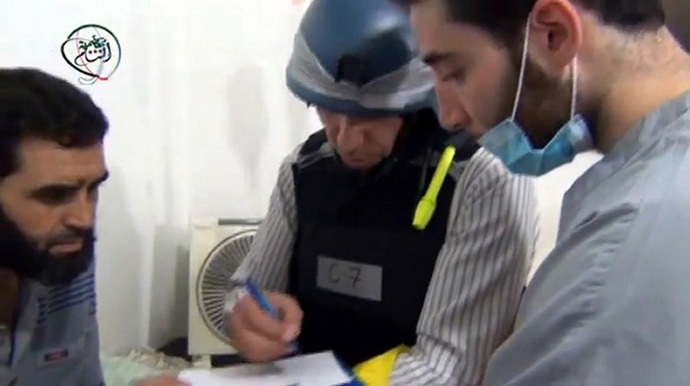
The UN inspectors requested access to Damascus suburbs
“without delays” on Thursday in order to investigate
the alleged use of chemical weapons in attacks in the
country.
14:14 GMT: The US is supporting for jihadists
throughout the Middle East, undermining democratic
governments in the region and their own values in order to
protect its oil industry, Colin Cavell, author of Exporting
‘Made in America’ Democracy, told RT.
11:37 GMT: Materials implicating the forces of Syrian president Bashar Assad in a recently alleged chemical weapons attack near Damascus were prepared prior to the incident on August 21, the Russian Foreign Ministry said.
“We’re getting more new evidence that this criminal act
was of a provocative nature,” he stressed. “In
particular, there are reports circulating on the Internet, in
particular that the materials of the incident and accusations
against government troops had been posted for several hours
before the so-called attack. Thus, it was a pre-planned
action,” Russian Foreign Ministry spokesman, Aleksandr
Lukashevich, said in a statement.
07:28 GMT: The Syrian government cannot guarantee the security or even entry for UN experts attempting to access the site of the alleged chemical attack which recently took place, as the opposition controls that area of Damascus, Oxford University historian Mark Almond told RT.
“You have to ask with any crime scene, to whose benefit is the crime? And the Syrian government would have to be not only very brutal, but very stupid to have done this in a period when UN chemical weapons inspectors are just down the road in Damascus, Almond argues.
Almond believes if Damascus was behind it, special troops
would have been deployed under the “cover of chaos” to
prevent documentary footage from emerging from the scene
which has been widely distributed by rebel forces.
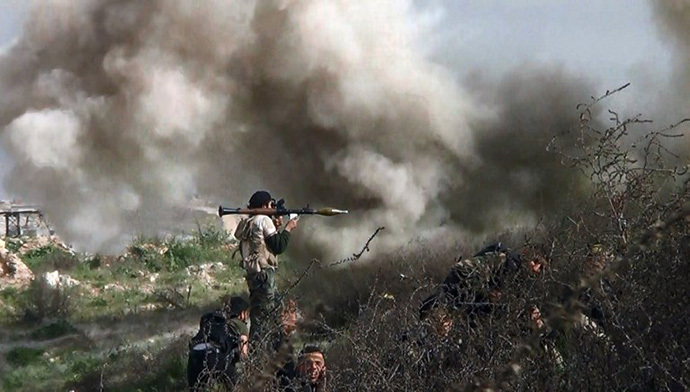
“This, after all, is the area controlled by the opposition. So a further problem arises with the demands Syrian government permit experts to visit the scene. Syrian government does not control the scene of the crime, if this crime is being committed. It is up to the rebels. Yet we see no attempt to press the rebels to cooperate. So in fact, it seems to be primarily to embarrass the Syrian government, to say, ‘Why don’t you let the experts go to the scene?’ where the fact is they don’t control the scene and therefore could not guarantee their security or even possibly enable them to enter the area where these attacks are supposed to have taken place.”
03:23 GMT: The use of chemical weapons in Syria would constitute a “crime against humanity,” UN Secretary-General Ban Ki-moon said, adding that there will be “serious consequences” if the reports transpire to be true.
"Any use of chemical weapons anywhere, by anybody, under
any circumstances, would violate international law," Ban
said at a scheduled event in the South Korean capital of
Seoul on Friday. "Such a crime against humanity should
result in serious consequences for the perpetrator," he
added.
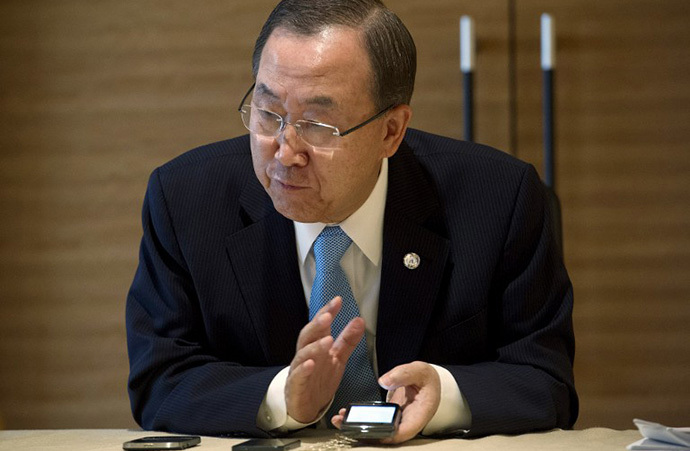
Ban urged both the government and opposition to cooperate with the UN investigation into the alleged chemical weapons attack near Damascus. "I can think of no good reason why any party – either government or opposition forces – would decline this opportunity to get to the truth of the matter."
"This is a grave challenge to the entire international community - and to our common humanity, especially considering it occurred when the United Nations expert mission is in the country," the UN chief said.
Thursday, August 22
20:32 GMT: US senator John McCain on Thursday says he no longer trusts President Obama’s word on Syria, arguing that military intervention in the war-torn country could be launched quickly and “easily”.
The Arizona Republican told CNN’s Kate Boulduan that the US military could destroy Syrian President Bashar Assad’s runways and aircraft within “a couple of days”, quickly arm rebels and establish a no-fly zone easily.
“There would be no boots on the ground,” he said. “We would use standoff weapons just as the Israelis have four times as they’ve taken out targets inside Syria. We would not put a single life at risk.”
McCain, a ranking member of the Armed Services Committee, said the president’s failure to take action in response to the violent turbulence in Egypt shows that the US has no policies or strategies that can be trusted.
“There is no policy. And there is no strategy. And therefore we react and we react poorly,” he said. “One of the best examples is Syria where the president said Bashar al-Assad uses chemical weapons, that’s a red line. He’s used them and we have done virtually nothing in response to that.”
15:02 GMT: Recent chemical attacks in Syria are nothing but a staged provocation, as the opposition forces want to disrupt any negotiations and trigger foreign intervention, and western forces are part of it, Brian Becker, the Director at Answer Coalition, told RT.
“The big goal of those who carry out the staged provocations is to disrupt any negotiations that could lead to a positive outcome to the existing Syrian government, meaning that the forces of the civil war had not succeeded in lagging the Assad government, which is their only goal,” Becker argues.
He continues that in the absence of popular support, the rebels hope the chemical weapons attack will prompt an “escalated intervention” which will see the establishment of no fly zones and the eventual bombing of Syria.
11:23 GMT: The Syrian government is ready to offer its full cooperation with UN experts seeking to clarify the alleged use of chemical weapons in, The Russian Foreign Ministry says. The UN has requested access to Damascus suburbs be granted “without delays”.Speaking on Thursday, Russian Foreign Ministry spokesman Aleksandr Lukashevich said Moscow hopes that UN experts will conduct an “objective investigation of all possible cases of use of chemical weapons on Syrian territory.”
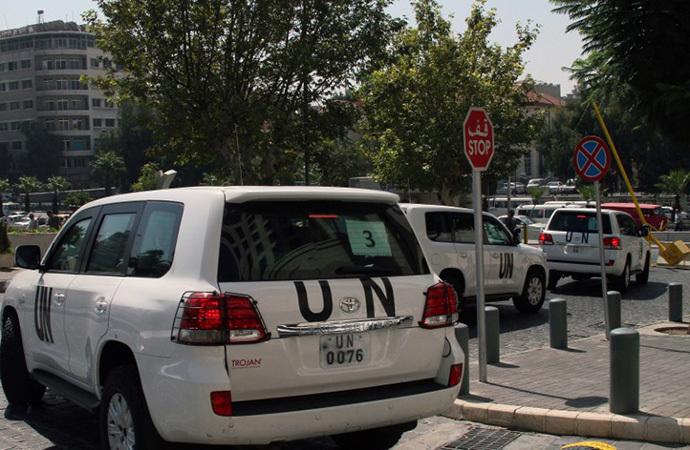
"We hope that the results will clarify the issue and will help to dispel numerous speculations around the alleged use of the Syrian chemical weapons that simultaneously create a positive background for the moves towards the start of the political process of settlement of the Syrian crisis", he continued.
Meanwhile, UN Secretary-General Ban Ki-moon called on the Syrian government to allow a UN team, led by Swedish scientist Ake Sellstrom, to visit the site in the Damascus suburbs.
"A formal request is being sent by the United Nations to the government of Syria in this regard. He expects to receive a positive response without delay," Ban’s office said in a statement.
07:17 GMT: France has called the international
community to respond with force if it is confirmed that
the Syrian government carried out a chemical attack on
civilians.
"There would have to be reaction with force in Syria from
the international community, but there is no question of
sending troops on the ground," Foreign Minister Laurent
Fabius said on the French television network BFM.
He continued that the situation could be handled "in other
ways" if the UN Security Council failed to make a
decision, although he did not elaborate on what those
measures might be.
The French minister further said that any refusal on the part
of Damascus to allow an inspection would be paramount to an
admission of guilt.
02:00 GMT: The United Nations Security Council UNSC siad it is seeking“clarity” on recent conflicting claims of chemical weapons use near Damascus, adding that humanitarian aid needs to be provided to the victims as soon as possible.
“There must be clarity on what happened and the situation must be followed carefully,” UN Permanent Representative of Argentina and President of the Security Council, Maria Cristina Perceval, told reporters after a closed-door emergency meeting of the UNSC on Wednesday.
“All council members agree that any use of chemical
weapons by any side under any circumstances is a violation of
international law,” Perceval said, stating that members
"welcomed the determination of the secretary general to
ensure a thorough, impartial investigation."
Wednesday, August 21
16:35 GMT: The Chairman of the Joint Chiefs of Staff does not believe the Syrian rebels would support US interests if the United States helps them defeat President Bashar Assad, according to a letter by General Martin Dempsey obtained by AP."The use of US military force can change the military balance,” Dempsey said. “But it cannot resolve the underlying and historic ethnic, religious and tribal issues that are fueling this conflict,” Demply wrote in a letter to Congressman Eliot Engel (D-N.Y.).
“Syria today is not about choosing between two sides but
rather about choosing one among many sides,'' Dempsey
continued. “It is my belief that the side we choose must be
ready to promote their interests and ours when the balance
shifts in their favor. Today, they are not.''
15:44 GMT: Reports by “biased regional media”
about alleged chemical weapons use near Damascus might be
“a provocation planned in advance,” says Russian
Foreign Ministry spokesman, Aleksandr Lukashevich.
“It draws attention to the fact that biased regional media
have immediately, as if on command, begun an aggressive
information attack, laying all the responsibility on the
government,” Lukashevich said in a statement on
Wednesday.
The Russian Foreign Ministry, citing its sources, said that a
homemade rocket carrying unidentified chemical substances had
been launched from an area controlled by the opposition.
“A homemade rocket with a poisonous substance that has not
been identified yet – one similar to the rocket used by
terrorists on March 19 in Khan al-Assal - was fired early on
August 21 [at Damascus suburbs] from a position occupied by
the insurgents,” Lukashevich said.
15:12 GMT: Reports of a massive chemical weapons attack in Syria are facing a credibility gap, as Al Arabiya, the origin of the story, is not a neutral in the Syrian conflict, geopolitical analyst William Engdahl argues. Engdahl says AL Arabiya, which is majority-owned by the Saudi broadcaster Middle East Broadcasting Center (MBC), is prone to anti-Assad rhetoric as Saudi Arabia has continually sought to topple the Syrian government.
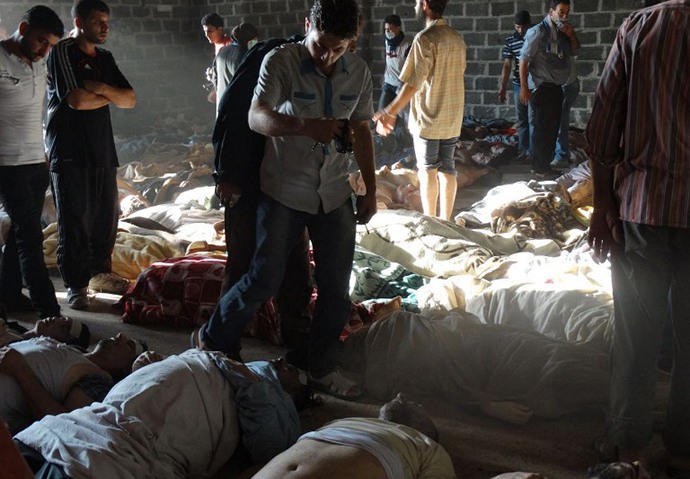
13:03 GMT: The Syrian government would not benefit
from the latest chemical attack in the country, while it
would provide the opposition a key pretext to see airstrikes
launched within the country, geopolitical analyst Patrick
Henningsen told RT.
06:27 GMT: Conflicting reports have emerged of a major chemical weapon attack in a Damascus suburb. The casualty figures range from dozens to almost 1,300. The alleged attack came on the same day a UN team arrived to investigate three separate sites in the country where alleged chemical weapons attacks took place.













